4 Volumes
Constitutional Era
American history between the Revolution and the approach of the Civil War, was dominated by the Constitutional Convention in Philadelphia in 1787. Background rumbling was from the French Revolution. The War of 1812 was merely an embarrassment.
History: Philadelphia and the Quaker Colonies
Philadelphia and the Quaker Colonies
Second Edition, Greater Savings.
The book, Health Savings Account: Planning for Prosperity is here revised, making N-HSA a completed intermediate step. Whether to go faster to Retired Life is left undecided until it becomes clearer what reception earlier steps receive. There is a difficult transition ahead of any of these proposals. On the other hand, transition must be accomplished, so Congress may prefer more speculation about destination.
Worldwide Common Currency and Corporate Headquarters
The Death of Money
Government Organization
Government Organization
Democracy Turns Out To Be a Two-Party System
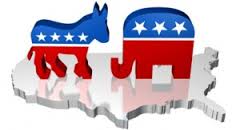
|
| American two-party system |
America's two-party system took fifty years to stumble into permanence. Regardless of the happenstances of their eventual emergence, political parties were clearly not designed into the original plan. Those few founding fathers who did think about political parties rejected them as "factionalism", something to be condemned. The true nature and advantages of a two-party system began to be truly venerated when other nations tried something quite different, which we now call Proportional Representation. PR is a fairly natural outgrowth of creating a large democracy from a collection of little tribes -- then creating surrogate political parties for them as part of the design. Guided by historical experience, it is now possible to ignore all minor differences between stable two-party democracy and multi-party democracy, except one. In a two-party system, the political dealing and vote-swapping takes place before the election, with all the players jockeying and sacrificing principle to answer a single candidate question, "Can he win?" By contrast, in a multi-party or proportionally-represented democracy, the election comes first, and only subsequently do vote-swapping and artful promises construct the ticket of candidates and the policy platform. The plain fact is the public doesn't know whom it is voting for and often is disagreeably surprised. Furthermore, important matters remain unsettled by a multi-party election. A cabinet member of a splinter party, potentially one with negligible public support, retains the threat of resigning if things don't go his way, and his resignation may trigger a whole new national election if it breaks up the political margin of the ruling coalition. At least, a two-party system settles things for a while and gives the public a relative rest from factional tensions.
The American system has evolved into a universal conviction, stronger than any Constitution, that two parties are quite enough. Third parties are of course tolerated because they aren't forbidden, but most offer a mechanism in case there is a serious wish to reconstitute one of the two major parties. The strength of third parties is to discipline the leadership of the major parties; the weakness is they threaten the unifying principle of compromise-in-order-to win. Nothing except religious fanaticism would likely induce any ambitious American politician to remain within a third party, fruitlessly frittering away his life's chances. Because of 18th Century history more than wisdom, an "established" religion is constitutionally prohibited in America; observation of the turmoils in other nations, and perhaps wisdom also, keep it that way.
If two parties are then quite enough, is it possible only one would be better? The quickest look abroad, the briefest exposure to history, shows a one-party system is synonymous with dictatorship. Communism and fascism had only this one feature in common; in fact, China seems to be morphing from one to the other, while resolutely retaining its single ruling-party system. The paradox of this situation is that it leads to the American realization that maintaining a two-party system means that neither party must ever achieve total victory. After each national election, the electorate settles back with relief that one side won, but neither side conquered. Even academics are muffled by the system; with much to criticize, there is nothing else worth substituting.
There is one thing left to mention about the two-party system, which is that the interests and affiliations which arouse the club-like loyalties of party members seldom perfectly match the party's current campaign policy issues, and depend in a high degree on habit and a formless sense of group comfort. Any schoolchild can notice, although the party candidates avoid mentioning, that policy issues move back and forth between the two parties. Whether it is tariffs, public schooling, the gold standard or a thousand other matters, the issues repeatedly shift to the other party when lack of progress or apparent betrayal offends them. The special interests seek to use the parties, and the parties regard each special interest as a bargaining chip; the gut feelings of the party membership adjust far more slowly. For maximum effectiveness, a two-party system needs the public to see itself as two warring affinity groups; for a while, polarization seemed to revolve around the rich and the poor. There would always be more poor people than rich ones, as the Founding Fathers feared and the anti-Federalists sought to exploit; but now Populism can only be sustained by continuous massive immigration. The times are growing stale for the Republicans to suggest that only they have an electoral incentive to eliminate poverty, while the Democrats would secretly like to increase it. Or for the Democrats to imply they have a monopoly of sympathy for the poor. Compared with the status of the rest of the world, permanent lifetime poverty in America is growing too infrequent to dominate elections, even supplemented by fear of poverty, a recollection of having once been poor, or guiltiness about never being poor. It is difficult to maintain the firmness of party members with such vague attitudes for abstruse legislative policies like banking reform or compulsory health insurance. Therefore, the search is on for large social affiliations which would more comfortably enlist loyalties for pressing specific legislative actions. At the present time, division of the working populace into the public and private sectors is being promoted as a bedrock political affiliation, but it is questionable whether that will be as successful as the public sector unions seem to hope for. Only twice in our history, during the administrations of George Washington and James Monroe, have Americans overwhelmingly agreed on core issues of religion, foreign policy, and prospects for the future. During both episodes, political parties virtually disappeared.
Term Limits, With Exceptions
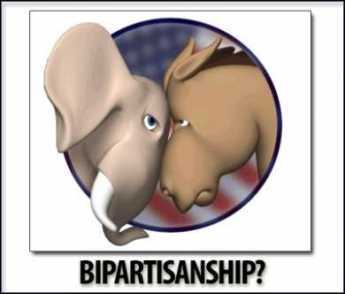
|
Because of precision gerrymandering with computers, congressional incumbents now face very few serious re-election contests. Left with only a few seats in serious contention at each election, the public is dissatisfied by this reduced level of control but does not know how to strengthen it. Turning to the courts, for better rules, probably won't help. Once you fix the number of seats in Congress, give at least one seat to each state, and insist that geographically contiguous districts within a state should all contain the same number of inhabitants, there isn't much wiggle room. That's what then creates the rather strange connection between restraining gerrymandering, and imposing term limits.
Long-term incumbents in a legislative body maintain its institutional memory; their experience is a valuable thing, and recognized gifted veterans should be retained. Although a dozen states have even willingly sacrificed such advantages by imposing term limitations anyway, no one contends that all long-term incumbents are bad. We just have too many of them. The nominating process favors extremists, and they have crowded out the legislators from close districts who must be constantly mindful of current public opinion. Legislative bodies need to have a better balance between the two kinds.
So here's a proposal. Go ahead and impose a reasonable term limit, perhaps eight years. But then allow exceptions for districts which can demonstrate a plausible amount of bipartisanship. If the district in its last election had elected a governor or president of the opposite party from the incumbent congressman, or if one Senator in the state is of the opposite party, these might be reasonable grounds for permitting a district to keep re-electing its incumbent congressman. That might not be enough; perhaps a district should demonstrate two of those proofs of bipartisan spirit. But this would be a start. And a warning.
Mister Roberts
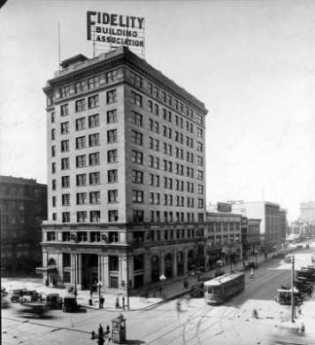
|
| Fidelity Building |
The Fidelity Building on Broad Street, now bearing the name of a successor bank, has its own ZIP code. It houses bank offices in one of its two towers and a general office building in the other. The top floor, the 29th, was originally the executive suite of the bank, with executive dining rooms, and lesser dining rooms where big deals were dealt. As an economy move, the executive floor eventually became a mid-day luncheon club, and right now it houses the law library of Montgomery, McCracken, and Rhoads. It carries the name of the law firm's most famous partner, Associate Justice of the United States Supreme Court, Owen Roberts. In the center of the hushed library, a single volume sits on a table, held in place by two very heavy bookends. It's the bound 1955 volume of the University of Pennsylvania Law Review, with a small green tab attached where a hundred pages of testimonials to Roberts are found. The tabbed page itself begins an essay by Felix Frankfurter, written in prose so elegant it seems like poetry. His topic is the mind of Justice Roberts at the time he switched sides in the 1936 Roosevelt Supreme Court packing episode, the famous "switch in time, which saved Nine."
Frankfurter and Roberts sat on the Supreme Court together for years, but the events in question took place before Frankfurter was appointed. Like the rest of us he has to conjecture what was in Roberts' mind. Felix Frankfurter offers two pieces of special evidence, his long personal observation of Roberts' character, and a private memo. Roberts had written in the memo that he had been ready to switch for Roosevelt before the court-packing proposal was made, but held off taking the step for several months because Justice Harlan Stone was absent for medical reasons. Stone, later elevated by Roosevelt to Chief Justice, was known to favor Roosevelt's New Deal proposals, particularly the Minimum Wage, which were central to the Constitutional question: whether the federal government had a right to go beyond regulating interstate commerce, to regulating all commerce. Frankfurter concludes that Roberts did not make the switch in response to Roosevelt's threats, because he had already decided to act before the threat was made to enlarge the court until it contained a majority in favor. Not only had Roberts decided to switch before the Presidential threat was made, but he also proved to be a courageous and highly moral person throughout the later years when he and Frankfurter were closely associated.
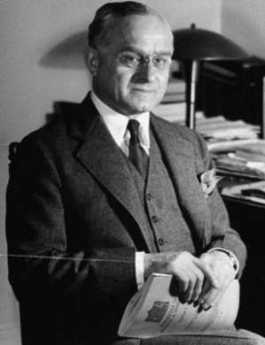
|
| Frank Furter |
Unfortunately, Frankfurter's 1955 eulogy has not convinced historical opinion. After all, there were dozens of people on the inside of the Supreme Court and the Presidential Administration who knew Roberts better than Frankfurter did and probably talked about nothing else for weeks. Up until the fateful decision, almost all of Roberts' close friends had been on the other side of the issue and felt entitled to some sort of explanation if not an apology. Washington is simply crawling with reporters whose job it is to search out gossip and hearsay. When an opinion emerges from such a cauldron and survives for seventy years, it has substance. The prevailing view is that Roberts felt the Judicial Branch of government was in jeopardy, and that someone must sacrifice himself in the crisis. Roosevelt had just been re-elected in a landslide, the new Congress would surely do anything he asked, the nation was in the depths of a horrendous economic depression for which Roosevelt was proposing the only conceivable Keynsean solution of increasing national liquidity through government spending. Roberts knew he would become a political pariah, but his duty seemed clear to him. It is merely a matter of phrasing whether his position was described as knuckling under to Roosevelts's threats, or throwing his body over Roosevelt's hand grenade.
With seventy years of retrospect, it all seems so pitiful. Public opinion and congressional action was in fact outraged at
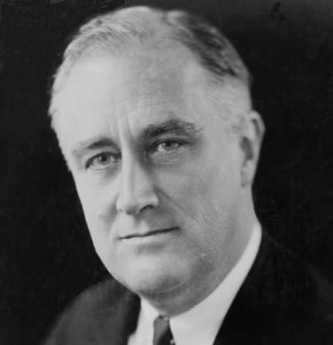
|
| Franklin Roosevelt |
Roosevelt, landslide or no landslide. Roberts and Stone had no need to do what Roosevelt asked. Any class in economics today can marshal a respectable argument against the wisdom of minimum wage laws, every class in law school is amazed and mostly appalled by their fresh reading of the Constitution's prohibition against Congress acting outside the limits of "commerce between the several states". On the level of governments rescuing their countries from depression by expanding liquidity, the experience has been that tax cuts usually succeed in that, while government spending usually does not. Paradoxically, the one principle to survive respectably from the 1936 political revolution was the movement toward national standards for internal trade and commerce, away from Balkanization. That's too big a step to take without public debate, perhaps, and highly disruptive if it's done in a single step. But the general idea is probably a sound one.
Poor Roberts probably never even considered that aspect. He was overwhelmed in his role as a Greek tragic hero, pursuing tragic inevitability.
Rosencrantz and Gildenstern (4)
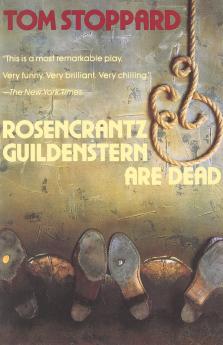
|
| Rosencrantz and Guildenstern are Dead |
A few Broadway seasons ago, Tom Stoppard's play and movie Rosencrantz and Guildenstern have Dead described an experience, resonating with the early years of the Reagan presidential administration. If you are a small witness to palace politics, you mostly have no clue about what is actually happening. At that time, it was widely accepted among Washington gossips that the appointees who filled the Executive Office Building belonged to three hostile tribes in temporary alliance, and the Libertarian tribe was cast out. According to this recounting, the other two tribes were the Religious Right and the Win-at-any-cost California political professionals. A more mature view of it might be that all administrations of all parties contain hard-noses who make a profession of the ruthless winning of elections. An ideological president can't win without hard-ball lieutenants, so although their presence is inevitable, what matters is how well they are controlled.
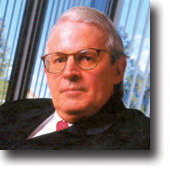
|
| David Stockman |
Ignoring these unattractive fixtures of political machinery, David Stockman seemed to symbolize a libertarian economic ideology within the Reagan White House, and Caspar Weinberger a militaristic one. When Stockman was sacrificed to power realities in Congress, the Libertarians followed the lead of William Niskanen and bitterly retreated to the neighborhood think tanks. But a few years later, Weinberger was similarly sacrificed over the Star Wars and Iran-Contra matters. These functionaries working at EOB thought they ran the country, but that most affable of men, Ronald Reagan, ran things. He seriously meant to discredit New Deal economics and to win the Cold War. To do so, he willingly sacrificed small improvements in our economic system like the Medical Savings Account, and minor enhancements of military hardware like the Strategic Defense Initiative. He would like to see these things succeed, but they would have to do it on their own, without cost to his political capital.
And so, in time, John McClaughry went back to Vermont, founded a think tank called the Ethan Allen Institute, ran unsuccessfully for governor against Howard Dean, and became Majority Leader in the Vermont Senate. Meanwhile, I devoted my efforts to selling the Medical Savings Account concept to that most reserved of audiences, the American Medical Association.
Commercial Academic Think Tank
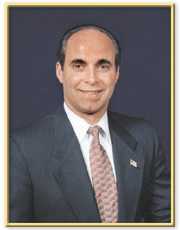
|
| Stephen P. Mullin |
Stephen P. Mullin recently addressed the Right Angle Club of Philadelphia about assorted economic subjects; he is certainly qualified. He was once the only Republican in Mayor Rendell's cabinet, acting first as Finance Director and then as Commerce Director. At first, he doesn't appear extroverted enough to be a politician but quickly demonstrated that he knew the first names of more of the members of the club than the president did, so maybe he does have the innate talents of a politician. Urban political machines don't usually respond cordially to graduates of Exeter and the Wharton School of the University of Pennsylvania. A number of University professors are consultants to the firm, which offers statistical economic advice to the many law firms in town, to philanthropic organizations considering public-interest projects in the region, to government agencies faced with regulating unfamiliar activities, and very likely to anyone else willing to pay for the service of academics, statisticians and analysts. It certainly sounds like a service that governments and philanthropies need, and which the region needs to avail itself of. In a way, it is probably something the University needs, as well. A friend of mine is now retired, but at one time I commuted on the train with an academic administrator of the Wharton School, who was quite obviously disturbed by handing diplomas to students who promptly took jobs which paid those graduates more than he was paid himself. Obviously, such a system cannot persist very long without creating a brain drain, so income supplementation by commercial consulting is a necessary and valuable support for academics. There are, of course, probably some negative features as well.

|
| The Wharton School |
It is interesting to hear from Steve how Philadelphia can be variously described. We have, for example, significantly less foreign immigration than other cities. New York, by contrast, has net immigration of about 700,000 persons a year; such forces can quickly transform a city in a variety of ways. The bombing of West Philadelphia during the Goode Administration was news for a while, then vanished from the papers. But it had a shattering effect on Philadelphia commerce, leading to a period of 8 or 9 years when there was essentially no private investment in the city. Philadelphia indeed now needs to have its municipal bonds issued by the state bonding authority, because our own bond rating is so low the extra cost of municipal debt is a significant one. And there is the cost of invisible shifting of power to Harrisburg. An unexpected result is that sales and real estate transfer taxes escalated to make up for property taxes which they could not possibly be raised as much as inflation. Real estate was in big trouble; whether ingenious strategies like the 10-year tax abatement for a new property will be successful in rescuing the real estate industry, remains to be seen. New office towers have been built, but they drain off tenants from older office buildings. We're seeing a massive conversion of older office space into residential apartments, an apparently successful maneuver. But that drains the older residential areas, which leads to -- well, who knows what it will lead to, but it could be slums.
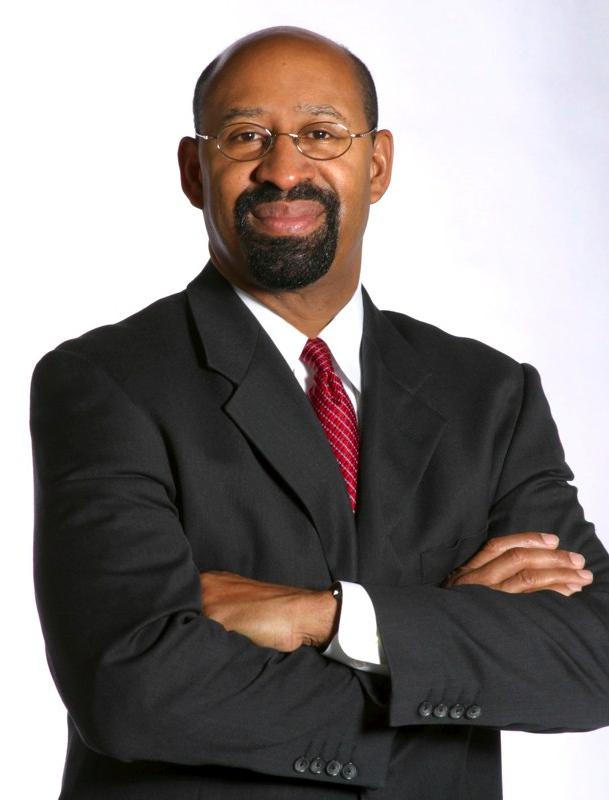
|
| Mayor Michael Nutter |
The traditional hostilities between Philadelphia and its neighbors can be defined in a new way, too. For a century, Philadelphia contributed more tax money to the rest of the state than it received in state services. But in the past 20 years, Philadelphia city has become a net importer of an annual billion dollars -- from the rest of the state. Two or three billion go to the schools, which the rest of the state regards as a deplorable waste in view of the quality of the product. And yet, the most hopeful feature of the situation is the vigor and ingenuity of the attempts being made to rescue the situation. In a certain sense, Mayor Nutter is the candidate of the Wharton School. He may well have some innovative ideas, and academic places like the Wharton School will surely suggest others. It remains to be seen whether Nutter can combine idealism with sufficient ruthlessness to make the city function. Cynical oldtimers will grumble that a mayor has to employ a moderate amount of deception and corruption in order to accomplish his mission. Maybe that overstates things, but it is very certain he must be tough. He's dealing with construction unions who will certainly be tough, and whose interest in sacrificing their own agendas in order to help the schools or street crime -- always fairly small -- is even further impaired by the econometrics that 70% of them live in the suburbs. We wish our new mayor all the best, since he seems smart enough to know what needs to be done, and is definitely smart enough not to drop any bombs on houses. He's smart enough to see that extra city revenue derived from gambling might permit the lowering of wage taxes, and hence an urban business recovery. But is he tenacious enough to stay in office long enough to achieve the balanced result; or will the forces of evil simply kick him out of office before wage taxes can be lowered and gambling discontinued? He won't break his promises, but will they break them for him? Beyond being competent, a city mayor needs to be tougher than the convivial but very mean friends he needs to associate with. He must, for example, decline to run for national office, the traditional way that city machines rid themselves of pointy-headed reformers.
Volunteerism Needs a Business Plan
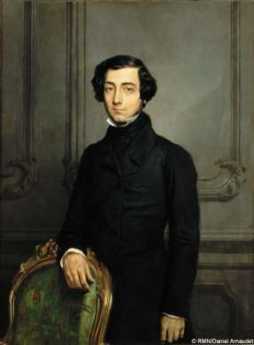
|
| Alexis de Tocqueville |
The visiting Frenchman Alexis de Tocqueville was struck most by the volunteerism he found everywhere in the young American nation; in his view, the first reaction of 19th Century Americans to a problem was to create a volunteer organization to fix it. Benjamin Franklin, who created dozens of such initiatives, was held up as its great exemplar. But de Tocqueville visited us at the beginning of the Industrial Revolution, and we are now well past that into the Information Revolution; volunteerism has noticeably declined. Not only have the great volunteer organizations like the Masons and the Red Cross suffered, but it is far more difficult to enlist the help of others to form a pick-up group to attack some issue or other. It is in that sense the general spirit of volunteerism has declined. The likely difficulty is not selfishness, but the helplessness of people to control their own time.
When volunteer groups to assemble, they are mostly composed of self-employed people like plumbers and dentists, free to be somewhere else during "normal business hours", which although shorter than they once were, seem extended by commuting time and by chores pushed aside during workplace confinement. To some extent longer commuting distances make it physically impossible to do personal chores in the vicinity of the workplace. But constrained personal time is also related to increased control behavior by management. A successful big business has to employ strategies to get employees with cell phones to stick strictly to business while the employer is paying for their time. Now that so many women are going out to work, the family unit needs to struggle to coordinate everyone's work time so there will be some remaining opportunity to conduct family life. When a working couple shares the home tasks and babysitting, the preempted time now extends to two working partners, and what is left is called "quality time". A probably temporary elaboration of this time competition is the need to chauffeur teenagers to their resume-enhancing activities. For the time being, you don't pick a college, the college picks you, and parents desperately labor to assist their children on a career path. Quite obviously, America needs to evolve better ways of trading work at home for more flexibility in the actual workplace, and we also need to build more first-rate colleges, but those issues are not the present topic. To summarize: It's awfully hard to assemble a group of volunteers simultaneously because employers have so successfully assembled their time. Failing to appreciate the tradeoffs inherent in commuting time is a secondary but still important factor, somehow related to the recent housing/schools mania.
Consequently, volunteer organizations increasingly tend to regard their chores as something you hire someone else to do if it proves impossible to dump them on someone who is retired or unemployed, or too timid to refuse. Even nominal volunteers are reluctant to step forward. This leads to recruitment lectures along the line that naturally you must sacrifice if you really truly believe in the goals of the dear old Whatsis Association, surely just a coercive speech pattern. That claptrap was never heard during the age of universal volunteers; volunteering was just one of those things everyone expected to do to get community activities accomplished. We're losing something important if we continue to endorse this attitude. Sometime during the first twenty-four hours in military service, for example, someone will surely advise the new recruit -- never volunteer.
For a penniless non-profit to adopt the solution of hiring staff when there is no revenue stream to pay them, is the first step toward the dissolution of the organization. Essentially, the non-volunteers are ordered to contribute money if they choose to be draft-evaders, and eventually, the officers and staff begin to look back at the organization members as cows to be milked. A class of people who are only making a living is substituted for those who understand and promote the goals, and it just goes downhill from there.
Instead, all volunteers really must each do some unpaid work, and the officers and directors must set an example of it. What an organization does next is crucial. Individual members, either anonymous or hoping to remain anonymous, must be approached with the suggestion they accept responsibility for a task. The wild-eyed response to this approach is quite familiar, like the lame excuse that there is no time. A counter response that I'm busier than you are, does not improve the conversation because it suggests the refuser is merely a selfish shirker. Instead, initial requests must take the following form: They should be for a simple, limited task without any obligations stretching to infinity. Almost everyone will be glad to bake a cake for a party, but almost no one will agree to be chairman of the cake-baking department unless the boundaries of that commitment are more reliably limited than they usually are.
In modern times, any major undefined volunteer responsibility is seen as potentially leading to an unthinkable conflict with gainful employment or else its ill-considered outgrowths like commuting. Since that's the basic problem, all-volunteer invitations must respect the true issue and devise workable ways to circumvent it. Role models certainly help if you have any.
www.Philadelphia-Reflections.com/blog/1448.htm
Concessions and Agreements
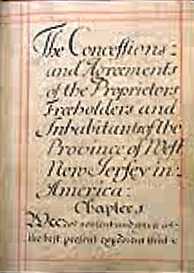
|
| Concessions and Agreements |
The United States Constitution is a unique achievement, but it had significant precursors, many of which James Madison had studied at Princeton. In the days of difficult ocean travel, almost all colonies were bound by an agreement to maintain loyalty to their European owners in spite of receiving latitude to govern themselves. Charters and documents defining these roles were generally written by the owners, and the colonists could pretty much take them or leave them. In the case of New Jersey in 1664, however, a very formidable lawyer and friend of the King named William Penn was drawing up agreements to his own conditions of sale, taking care that the grant of governing authority he received was favorable. Penn's relationship to the King was unusually good, to say the least. He had more reason to be wary of nit-pickers in the King's administration, trying to anticipate every conceivable disappointment for some successor King.
For his part, Penn wanted to make colonial land attractive to re-sell to religious groups who had experienced harsh government oppression; he wanted no obstacles to his announcing there would be no religious oppression in New Jersey. He was offered the role of sub-king although he hastily rejected any such title, and needed to repeat the formalities of the Charter to define his role and reassure his settlers about that matter. Furthermore, he was dealing with the heirs of Carteret and Berkeley, active participants in North and South Carolina. So Penn's method of achieving basic rights was influenced by prior thinking in the Carolinas, as the thinking of John Locke secondarily influenced matters in Delaware and Pennsylvania. These ideas were incorporated in a New Jersey document called "Concessions and Agreements." The concepts were not wholly the ideas of William Penn, but he did write it, and it does contain many ideas that were uniquely his. Understandings about limits were set down, argued about, and agreed to. The owner risked money, the colonist risked his life. Neither would agree unless a reasonable bargain was struck in advance of any dispute. Furthermore, the main value of a colony was beginning to shift from trading rights to real estate rights. Carteret and Berkeley had not only been principals in both the Carolinas and the Jerseys but had been involved in a number of such investments in Africa and the West Indies; New Jersey was just another business deal. It was conventional for documents of this type to define the method of selection of a governor, the establishment of an assembly of colonists, and some sort of council to attend to day to day affairs. In that era, few colonists would cross the ocean without a guarantee of religious freedom, at least for their own brand of religion. Standard clauses which may sound strange in today's real estate world, were then necessary because it was a transfer of not merely land, but also the terms of government. In the case of the Quaker colonies, many of these stipulations were included in the earlier charter from the King. It seems very likely that Penn hovered around and negotiated these points which he wished to have the King agree to; and then once the land was safely his, Penn repeated and expanded these stipulations with the colonists in his Concessions and Agreements . It wasn't exactly a Constitution, but it reads a lot like the one America adopted a century later.

|
| Proprietors House |
Quakers had suffered persecution and imprisonment, and knew exactly what they feared; on the other side, it seems likely Carteret and Berkeley were less interested. So this real estate transfer document conceded almost anything the colonists wanted and the King would stand for, couched in conciliatory phrases. For example, no settler was to be molested for his conscience, and liberty was to be for all time, and for all men and Christians. Elections, by the way, must be annual, and by secret ballot. While law and order must prevail, nevertheless no man is to be imprisoned or molested except by the agreement of twelve men of the neighborhood. On the matter of slavery, no man was to be brought to the colony in bondage, save by his own consent (that is, indentured servants were to be permitted). And in what proved to be a final irony for William Penn, there was to be no imprisonment for debt. Almost all of these innovative ideas survived into the U.S. Constitution a century later, but the most innovative idea of all was to set them all down in a freely-made agreement in writing. This was not merely how a government was organized, it defined the set of conditions under which both sides agreed it would operate.
It was, of course, more than that. It was a set of reassurances to settlers who had been in New Jersey before the English arrived that they, also, would be treated as equals. It was a real estate advertisement to the fearful religious dissenters back in England that it was safe to live here. And it was a reminder to future Kings and Parliaments that this is what they had promised.
The pity and a warning, is that the larger vision of a whole continent governed fairly by common consent may have been too grandiose for a little band of New Jersey Quakers, surrounded as they were by an uncomprehending world. All utopias are helpless when stronger neighbors reject the basic premise. However, it was the expansion of the pacifist concept to the much larger neighboring territory of Pennsylvania that proved to be just too much for such a small group of friends to manage by consensus, particularly when unbelieving immigrants began to outnumber them. But the essential parts of it certainly remained in the minds of delegates to the Constitutional Convention in 1787. When the minutes of the Constitutional Convention speak of the "New Jersey Plan", the Concessions and Agreements was what they had in mind.
REFERENCES
| Concessions and Agreements of New Jersey 1676: William Penn | New Jersey State Library |
| Camden After the Fall: Decline and Renewal in a Post-Industrial City: Howard Gillette Jr.: ISBN-13: 978-0812219685 | Amazon |
Vote Counting, Past and Future
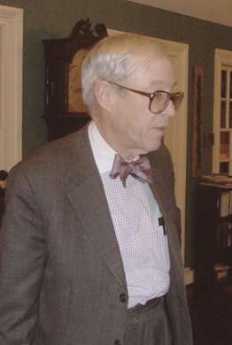
|
| Greg Harvey |
The Right Angle Club was recently fascinated to hear Greg Harvey, a Montgomery McCracken expert on election laws, discuss the snarled Florida situation in the 2000 Presidential race, and the prospects for similar problems in upcoming elections. With the aid of retrospect, candidate Al Gore deserves much of the blame for his own loss, and the U.S. Supreme Court does seem to have terminated the uproar without affecting the final result.
A consortium of major newspapers funded an extensive investigation of the Florida election and were forced to agree that George W. Bush would probably have won that election no matter what. The central issue in these contests is the 35-day time limit to contesting elections. It is true that right or wrong, the country needs to settle its elections promptly and get on with its business. Furthermore, if a national election is so close that it takes months to decide the winner, there can't be a great deal of difference between the candidates, so who cares.
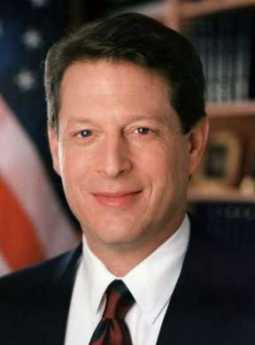
|
| Al Gore |
Looking back at the 2000 election with the leisure of time and appreciable resources, it is possible to see that Al Gore might have won that election if he had made several lucky choices in contesting its result. But it seems highly unlikely that anyone in his position would have been able to identify the winning combination of choices -- within the 35 day time allowed for pursuing them. He had to guess that ballots with two candidates marked ("over balloting") would pick up more Gore votes than ballots without an indicated choice ("under balloting"); he guessed wrong. He had to decide whether challenging late ballots from absentee military was worth the unpopularity of pursuing such a technicality to the disadvantage of soldiers serving overseas. His ticket-mate Joe Lieberman urged him to avoid that touchy issue which did prove to cost him some votes he needed. The decision was one to be proud of but is the main reason why his party faithfuls later turned rather viciously against Lieberman. A second wrong guess was to fail to go after the software mixup on invalidating the ballots of convicted felons. He might have picked up a couple of thousand votes, but only if willing to have the world learn that convicted felons are overwhelmingly pro-Democratic voters. The one decision he made that makes him look rather sappy to professional pols was to challenge ballots in the districts where he was already very popular.

|
| Vote |
Vote counters and poll watchers tend to be strong political partisans, usually drawn from the local district. When votes are ambiguous, these people lean in the direction of their party. Therefore, most party insiders would know immediately; if you challenge districts, challenge the districts which favor your opponent. Choices like this do have to be made. The thirty-five-day rule makes a challenger run out of enough time to look elsewhere if early guesses prove wrong. So, although it is possible in retrospect to construct for Gore a winning strategy for selective challenges, the newspaper consortium and the Supreme Court which pondered the choices before him rightly concluded he was destined to lose.

|
| HAVA |
Some of these lessons are enduring ones, but future elections face unexplored difficulties. A new election law (the Help America Vote Act, or "HAVA") sought to reform the election system by prohibiting the use of punch card ballots, requiring states to use auditable vote records and provisional ballots in doubtful cases, stricter voter identification methods, and statewide voter registration databases. In response to these record requirements, many states opted for complicated data in code, sequence-scrambled to prevent individual identification. In the event of a challenge, however, deciphering these records will be time-consuming, and the potential is created for the candidate who is initially ahead to stretch out the process until the challenge effort collapses at the 35-day time limit.
Several states, including Ohio, are thought to have the potential for very close 2008 results. In that particular state there are some complicated rules about voting in the "wrong" district, that is, to be registered in one district, but attempting to vote in another. It would not seem difficult to do a little of this on purpose, either as a voter, or an election registrar. It seems unlikely that very much challenge among the three possible culprits could be accomplished within thirty-five days of a contested election. So the challenger in Ohio would be faced with the same sort of impossible snap decisions that faced poor old Al Gore, surrounded by excited partisans shouting at the top of their voices.
So perhaps Greg Harvey's law school classmate Appellate Judge Richard Posner has a sustainable position on this. It was his judgment that the 2000 election was essentially a tie. Letting the Supreme Court decide it wasn't the worst possible choice.
www.Philadelphia-Reflections.com/blog/1515.htm
George Washington Demands a Better Constitution
GEORGE Washington was a far more complex person than most people suppose, and he wanted it that way. He was born to be a tall imposing athlete, eventually a bold and dashing soldier. On top of that framework, he carefully constructed a public image of himself as aloof, selfless, inflexibly committed to keeping his word. Parson Weems the biographer may have overdone the image a little, but Washington gave Weems plenty to work with and undoubtedly would have enjoyed overhearing the stories of the cherry tree and tossing the coin across an impossibly wide Potomac. Washington had a bad temper and could remember a grievance for life. He married up, to the richest woman in Virginia.

|
| Potomac River |
Growing up along the wide Potomac River, Washington early conceived a life-long ambition to convert the Potomac into America's main highway to the Mississippi. He did indeed live to watch the nation's new capital start to move into the Potomac swamps across from his Mount Vernon mansion, in a city named for him. For now, retiring from military command with great fanfare and farewells after the Revolution, he returned to private life on this Virginia farm. He made an important political mistake along this path, by vowing in public never to return to public life. During the years after the Revolution but before the new Constitution, his attention quickly returned to building canals along the Potomac River, deepening it for transportation, and connecting its headwaters over a portage in Pennsylvania to the headwaters of the Monongahela River -- hence to the Ohio, then the Mississippi, or up the Allegheny River to the Great Lakes. He personally owned 40,000 acres along this river path to the center of North America. The occasion for a national constitutional convention grew out of a meeting with Maryland to reach an agreement about this Potomac vision, which was being blocked by commercial interests in Baltimore. Ultimately, Baltimore won the commercial race; so it was the Baltimore and Ohio Railroad which captured the early commerce to the west. Washington also made deals, ultimately to Baltimore's benefit, with the James River interests, to give them a share of the development of the Chesapeake Bay trade. As a young man, George Washington had acted as a surveyor for most of this region, and as a young soldier had explored the Indian trade to Pittsburgh, actually starting the French and Indian War during this trip. He was to march it again later with Braddock's army. All the while, Washington dreamed of the day. There were competitors; Philadelphia and New York had similar aspirations for their rivers. Take a look at a globe or Google Earth. Comparatively few of the earth's rivers drain too far western beaches. Even today, long-term victory in worldwide water transportation will likely go to one of many eastern rivers linking up with one of the few western ones. The ultimate world-wide goal has yet to be fulfilled for what continues to be the cheapest of all bulk transportation methods.
Washington at age 54 was already richer than most people need to be; a lot of this Potomac dream was a residual of boyhood ambitions enduring into middle age. In a sense, he had the ambition to make his boyhood home the future center of the universe. Although much of his stock in these real estate enterprises resulted in very little extra wealth, he demonstrated his mixture of public spirit combined with ambition by donating the stock in one of the companies to a future national university, to be located across the river near Georgetown. Since that didn't work out, he later placed the nation's capital there. He had consistently been a far bolder dreamer than Cincinnatus, humble Roman citizen-soldier returning to his farm from the wars.
Washington more or less gave up this Potomac ambition for a loftier one. During the Revolution, he had suffered the most infuriating abuse of himself and his soldiers from the state legislatures. Their urgent demands for victories were seldom matched with resources. The Continental Congress representing those state governments in a weak confederation that could not feed and pay its own troops seemed little better. He could be a mean man to cross, but perhaps with General Cromwell in mind, Washington possessed the firmest and most sincere belief in the proper subservience of military to civilian control. These conflicting feelings resulted in earnest obedience to a group of politicians he surely distrusted. This could not be described as hypocrisy; he respected their rank even though he suffered from their behavior. When Congress paid the troops in worthless currency which they promised to redeem after the war, it became clear that either lack of moral fiber or their system of governance led the states and the Congress in the direction of dishonoring their debt to the soldiers. This was a dreadful system, which led to death and suffering among the loyal troops, forcing the General into the humiliating position of assuring the troops Congress would stand by them, while he privately doubted any chance of it. Washington did not easily forgive or forget. Here was a paltry outcome for eight years of war and suffering; this system of organized dishonor must be improved.
He went about achieving his goal in a way that would not occur to most people. He chose a young ambitious agent, James Madison, who had caught his attention in the Virginia legislature, in the Continental Congress, and in the negotiations with Maryland over the development of the Potomac. Washington schemed with the young man for weeks on end about ways and means, opportunities, dangers, and potential enemies. Perhaps he failed to notice some ways where he and Madison fundamentally differed. Madison himself might not have recognized that his years at Princeton in the Quaker state of New Jersey had exposed him to novel ideas like separation of church and state, which were instantly appealing to the two Virginia Episcopalian religious doubters. Many people he admired, Patrick Henry, in particular, wanted the government to be as weak and ineffective as possible. Unfortunately, when Madison's turn later came for assuming the Presidency, he went along with reliance on diplomacy and persuasion until it almost cost America the War of 1812. Acting as Washington's agent in 1788, Madison was assigned to win over the Virginia legislature, make alliances with other states in Congress, identify friends and enemies, make deals. He performed as brilliantly as he would at the Constitutional Convention, so the basic conflict between the soldier President and his politician assistant was glossed over. As long as the original relationship held together, Washington felt it was useful to remain above and aloof, publicly wavering whether this was all a good idea, but fiercely determined to have a nation he could be proud of. There was to be a Constitutional Convention in Philadelphia, but while Washington was invited, he let it be known he was uncertain whether he should accept the invitation. What he really meant was he would preserve his political credibility for a different approach if this one failed. Considered from Madison's viewpoint however, this clearly meant Washington would dump him if things went badly. Meanwhile, the unknown young Madison on several occasions came to Mount Vernon for three days at a time to talk strategy and give the famous General all the scoop. Today, we would describe Madison as a nerd. The aristocratic Gouverneur Morris never thought much of him. Washington needed him, but there is no evidence he thought of him other than as a glorified butler. Little Madison was awkward among the ladies, a problem inconceivable to either Washington or Morris. But that little mind was surely working, all the time.
Madison was in fact a brilliant politician, a dissembler in a different way, but a severe contrast with his mentor. To begin with, he was a scholar. Both as an undergraduate at Princeton and a graduate student working directly with the great Witherspoon himself, Madison was deeply learned in the history of classical republics. He spent an extra year at Princeton, just to be able to study ancient Hebrew with Witherspoon. But he was innately skilled in the darker arts of politics. When votes were needed, he had a way of persuading three or four other members to vote for a measure, while Madison himself would then vote against it to preserve influence with opponents for later skirmishes. In fact, as matters later turned out, it becomes a little uncertain just how convinced Madison was that Washington's strong central government was a totally good idea. Before and after 1787 Madison expressed a conviction that real sovereignty originated in the states, just as the Articles declared. That was a little too fancy for practical men of affairs, who were uncomfortable to discover how literal Madison was after his break with the Federalists. Twenty years younger than the General. he prospered in the image of being personally close to the titan, and he certainly enjoyed the game of politics. The new Constitution was going to be an improvement over the Articles of Confederation, but Madison did not burn for long with indignation about injustice to the troops, or disdain for nasty little politicians in the state legislatures. These were problems to be solved, not offenses to be punished. The new Constitution was a project where he could advance his career, skillfully demonstrating his prowess at negotiation and manipulation. This is not to say he did not believe in his project, but rather to suspect that he was a blank slate on which he allowed Washington to write, and later allowed others to over-write. He was eventually to modify his opinions as a result of new associations and partners, and since he succeeded Jefferson as President, it was personally useful to adjust his viewpoints to his timing. What would never change was that he was an artful politician, while Washington hated, absolutely hated, partisan politics.
This is not just an emotional division between two particular Virginia plantation owners, but an enduring thread running through all elective politics. Washington set the style for generations of citizen leaders in America. In his mind, a person of honor distinguishes himself in some way before he enters public office, so on the basis of that honorable image, presents himself to voters for public office, and naturally is elected to represent their interests. He is expected to compromise where compromise is honorable and publicly acknowledged, in order to achieve one desirable outcome in concert with other outcomes, in some ways inconsistent but still honorable in combination. He reliably will not vote for either issues or candidates in return for some personal consideration other than the worth of the issue or the candidate, with the possible exception of yielding to the clear preferences of his local district. Such a person is not a member of a political organization very long before he encounters another group of colleagues -- who regularly swap votes for personal advantage, join a group who agree to vote as a unit no matter what the merits, and recognize the frequent necessity to talk one way while secretly voting another. The first sort of politician is usually an amateur, the second type is typically a professional politician. Although it seems a violation of ethics and common public welfare, the fact is the professional vote-swapper almost always beats the sappy amateur. The response during the Eighteenth Century was for idealists to condemn and attempt to abolish partisanship and political parties. The American Constitution does not make provision for political parties and other forms of vote-swapping or even anticipate their emergence. Although Madison ignited the process in the United States, Jefferson really organized it; every recent politician except Adlai Stevenson has openly participated in a version of it. That the Constitution has still not been amended to provide for parties seems to reflect a persisting nostalgic hope that somehow we can return to Washington's stance.
Washington's conception of open representative politics was not entirely perfect, either. In order to maintain an image of impartiality, Washington and his imitators isolated themselves in a cloak, holding back their true opinions in a sphinx-like way that hampered negotiation. Unwillingness to be seen swapping votes can lead to an unwillingness to compromise, and in the final analysis, the difference is one of degree. However, the over-riding issue is that each representative or Senator is equal to every other one. When vote-swapping gets started, it leads to placing power over supposed equals in the hands of the more powerful manipulators, masquerading as political leaders. Ultimately, it leads to the adoption of house rules on the very first day of a session which force lesser members to surrender their votes to a speaker or minority leader or committee chairman, when the theory is that there is no such thing as a lesser member. The claim of a party-line politician is that he obeys the will of the party caucus; the reality is usually that he obeys the will of some tough, self-advancing party leader. The final reality is that most legislatures must now deal with thousands of bills per session, leading to the necessity of appointing someone to set priorities, which in turn leads to the power of party leaders over their grudging servants. These various subversions of the equal rights of elected representatives can lead to such discrediting of the system that honorable people may refuse to stand for office, leaving foxes in charge of the hen house. Benjamin Franklin, who was to play an invisibly controlling role in the impending Constitutional Convention, had his own way of coping with the political environment. "Never ask, never refuse, never resign."
American Succession
It may seem a startling focus for a famous war hero, but one of the most important precedents George Washington wanted to establish as America's first president, was that he was determined not to die while in office. His original intention was to serve only one four-year term as president, only accepting a second term with considerable concern that it would increase his chances of dying in office. His reasons are perhaps not totally clear since he repeatedly stated his concern that he had promised the American public that he would retire from public office when he resigned his commission as General and was determined to seem a man of his word. While this sounds a little off-key to modern ears, it must be remembered his resignation as General had caused an international stir, even prompting King George III to exclaim that this must be the greatest man who ever lived. Washington may have sincerely thought he was following the pattern of Cincinnatus, the Roman citizen soldier who declined further public life in order to return to his farm. But in retrospect we can see that for a thousand years before Washington's military resignation it was essentially unheard of for a leader with major power to be removed by any means except death. Regardless of where he might have got the idea, Washington was consciously trying to establish a tradition of public service by those who were natural leaders, dutifully responding to the need of the nation, and stepping down when the service was completed. It was an important day for him and for the nation, when he stood before John Adams in 1796, honorably and humbly turning over supreme power to a successor who had been chosen, by others, in a lawful way. Peaceful succession is part of the original intent of the founder of the Constitution, if anything is.
Some have written that Washington was not our first president, but our eleventh if one counts those elected the presiding officers of the Continental Congress, under the Articles of Confederation. But none of them could be said to be the head of state, and absolutely none of them could be confident the public would re-elect them indefinitely. Washington was not so much aiming for a two-term limit as he was setting a pattern for returning the choice to the people after a stated term, and deploring anyone who sought unlimited power for its own sake. The office should seek the man, not the man seek the office, and even if the public got carried away by adulation, the man should in good time step aside. For over a century the two-term tradition was later unchallenged, until Franklin Roosevelt succumbed to exactly the temptations that Washington foresaw. We have seldom amended the Constitution, but after Roosevelt, it was soon amended to emphasize what so many had previously considered it unnecessary to state.
The idea of a fixed term of office has had an unexpected calming effect on partisanship in America. In parliamentary systems like the British, a prime minister answers weekly questions from his opposition, with a full realization that he can be dismissed from office at any moment he angers a majority into a vote of no-confidence. Under the American Constitution, a recent election mandate eats into the stated time in office, making it progressively less rewarding to evict the officer for the residual time before another election does it automatically. America does indeed have an impeachment process, but in fact, it has been rarely employed. In America, if someone is elected for a specific term, it is almost certain he will serve out the full term. There are times when partisanship seems unlimited, but in fact, we probably have less of it than if we encouraged partisan outcry to go on to evicting an incumbent from office.
Washington was not so successful in promoting another component of his ideal statesman. In his view, a district would naturally select the most prominent citizen available to represent the district, since that person would do it more ably than anyone else and give up the office when duty was completed; that was behind the stated ideal of republican government. Madison was for a time persuaded that such choices should be filtered a second time, with the House of Representatives electing Senators from its midst, but that failed to win approval. In the Eighteenth century, the concept of professional bureaucrats and professional politicians had not yet taken hold. In its place was the fear of "ambitious" leaders, who would be held in check by a tradition of underpaying elected representatives, or even of gentlemen of means who would refuse to accept any pay for doing their duty. It proved unanswerable when ambitious men assailed this republican concept by protesting the establishment of aristocracies, oligarchies, and failure of the upper class to understand the needs and anxieties of the common man. This viewpoint eventually replaced the "natural" local leaders with those who had experienced life in a log cabin or endured the purifying experiences of other hardships. The original idea of the founders was to elect leaders who could not be bought; ambitious men could be bought. When political parties made their appearance, a new thought appeared; perhaps ambitious men could be controlled.
As the practical realities of politics in action began to surface, members of elected bodies with varying degrees of ambition and altruism sought refuge from pressures being applied to them. After all, one of the undeniable implications of the Constitution was that every single member of an elected body had just as much power and rights as every other one. Out of this tension emerged the seniority system, another unwritten rule with the power of reality forging it into an implicit rule. In time, everyone would achieve seniority at the same point in his career, and hence the procedural powers necessary to running the place could be assigned with lessened fear of improper pressure. Newcomers regularly complain about the seniority system but eventually yield to it as the least bad accommodation to necessity. But even minor imperfections will be exploited if a system endures long enough. In this case, political parties in the home states are persuaded that the fruits of seniority might be disproportionately available to them if they elect young candidates and keep them in office indefinitely. Eventually, such stalwarts can rise to positions that allow them to reward the home district. This has the interesting consequence of creating political families, whose senior representative acquires the power to select his son or grandson to take his place in the rising chain of command. That's not as bad as an inherited aristocracy, perhaps, but it has several similarities.
Designing the Convention
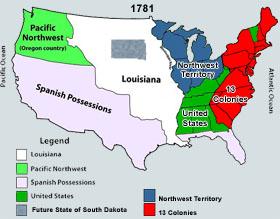
|
| The Convention and the Continent |
THE prevailing notion of the Constitutional Convention once depicted James Madison as seized with the idea of a merger of former colonies into a nation, subsequently selling that concept to George Washington. The General, by this account, was known to be humiliated by the way the Continental Congress mistreated his troops with worthless pay. But recent scholarship emphasizes that Washington noticed Madison in Congress becoming impassioned for raising taxes to pay the troops, was pleased, and reached out to the younger man as his agent. Madison seemed a skillful legislator; many other patriots had been disappointed with the government they had sacrificed to create, but Madison actually led protests within Congress itself. A full generation younger than the General and not at all charismatic, Madison's political effectiveness particularly attracted Washington's attention to him as a skillful manager of committees and legislatures. Washington was upset by Shay's Rebellion in western Massachusetts, which threatened to topple the Massachusetts government, but Shay's frontier disorder was only one example of general restlessness. There was a long background of repeated Indian rebellions in the southern region between Tennessee and Florida, coupled with uneasiness about what France and England were still planning to do to each other in North America. It looked to Washington as though the Articles of Confederation had left the new nation unable to maintain order along thousands of miles of the western frontier. The British clearly seemed reluctant to give up their frontier forts as agreed by the Treaty of Paris, and very likely they were arming and agitating their former Indian allies. Innately rebellious Scotch-Irish, the dominant new settlers of the frontier, were threatening to set up their own government if the American one was too feeble to defend them from the Indians. The Indians for their part were coming to recognize that the former colonies were too weak to keep their promises. With the American Army scattered and nursing its grievances, the sacrifices of eight years of war looked to be in peril.
 The Union is much older than the Constitution. It was formed, in fact, by the Articles of Association in 1774. It was matured and continued by the Declaration of Independence in 1776. It was further matured ... by the Articles of Confederation in 1778. And finally, in 1787, one of the declared objects for ordaining and establishing the Constitution was "to form a more perfect Union. 
|
| A.Lincoln, First Inaugural |
Even Washington's loyal friends were getting out of hand; Alexander Hamilton and Robert Morris had cooked up the Newburgh cabal, hoping to provoke a military coup -- and a monarchy. Because they surely wanted Washington to be the new King, he could not exactly hate them for it. But it was not at all what he had in mind, and they were too prominent to be ignored. So he had to turn away from his closest advisers toward someone of ability but less stature and thus more likely to be obedient. It alarmed Washington that republican government might be discredited, leaving only a choice between a King and anarchy. Particularly when he reviewed shabby behavior becoming characteristic of state legislatures, something had to be done about a system which proclaimed states to be the ultimate source of sovereignty. Washington decided to get matters started, using Madison as his agent. If things went badly he could save his own prestige for other proposals, and Madison could scarcely defy him as Hamilton surely would. Washington could not afford to lose the support of the two Morrises, and still, expect to accomplish anything major. Madison had been to college and could fill in some of the details; Washington merely knew he wanted a stable government and he did not, he definitely did not, want a king. Many have since asked why he renounced being King so violently; it seems likely he was projecting a public rejection of the Hamilton/Morris concept in a way that did not attack them for proposing it. It was a somewhat awkward maneuver, and to some degree, it backfired and trapped him. But Madison proved a good choice for the role, and things worked out reasonably well for the first few years.
 The powers delegated by the proposed Constitution to the Federal Government are few and defined. Those which are to remain in the State Governments are numerous and indefinite. 
|
| J.Madison, Federalist#45 |
Madison was young, vigorous and effective; he held the widespread perception of the Articles of Confederation as the source of the difficulty, and he was a reasonably close neighbor. He was active in Virginia politics at a time when Virginia held defensible claims to what would eventually become nine states. Negotiations for the Northwest Ordinance of 1787 would be going on while the Constitutional Convention was in session, and Virginia was central to both discussions. After conversations at Mount Vernon, a plan was devised and put into action. Washington wanted a central government, strong enough to energize the new nation, but stopping short of a monarchy or military dictatorship. There were other things to expect from a good central government, but it was not initially useful to provoke quarrels. Madison had read many books, knew about details. Between them, these two friendly schemers narrowly convinced the country to go along. As things turned out, issues set aside for later eventually destroyed the friendship between Washington and Madison. Worse still, after seventy years the poorly resolved conflict between national unity and local independence provoked a civil war. Even for a century after that, periodic re-argument of which powers needed to revert to the states, which ones needed to migrate further toward central control, continued to roil a deliberately divided governance.
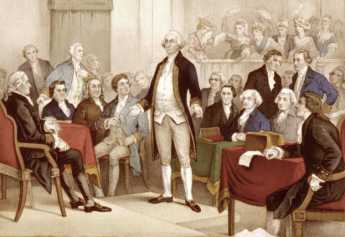
|
| Constitutional Convention |
For immediate purposes, the central problem for the Virginia collaborators was to persuade thirteen state legislatures to give up power for the common good. The Articles of Confederation required unanimous consent of the states for amendment. To pay lip-service to this obstacle, it would be useful to convene a small Constitutional Convention of newly-selected but eminent delegates, rather than face dozens of amendments tip-toeing through the Articles of Confederation, avoiding innumerable traps set by the more numerous Legislatures. In writing the Articles of Confederation, John Dickinson had been a loyal, skillful lawyer acting for his clients. They said Make it Perpetual, and he nearly succeeded. The chosen approach to modification was first to empower eminent leaders without political ambitions and thus, more willing to consent to the loss of power at a local level. Eventual ratification of the final result by the legislatures was definitely unavoidable, but to seek that consent at the end of a process was far preferable because the conciliations could be offered alongside the bitter pills. Divided and quarrelsome states would be at a disadvantage in resisting a finished document which had already anticipated and defused legitimate objections and was the handiwork of a blue-ribbon convention of prominent citizens and heroes. By this strategy, Washington and Madison took advantage of the sad fact that legislatures revert toward mediocrity, as eminent citizens experience its monotonous routine and decline to participate further in it, but will make the required effort for briefly glamorous adventures. Eminently successful citizens are somewhat over-qualified for the job, whose difficulties lesser time-servers are therefore motivated to exaggerate. To use modern parlance, framing the debate sometimes requires changing the debaters. In fact, although he had mainly initiated the movement, Washington refused to participate or endorse it publicly until he was confident the convention would be composed of the most prominent men of the nation. This venture had to be successful, or else he would save his prestige for something with more promise. Making it all work was a task for Madison and Hamilton, who would be replaced if it failed.
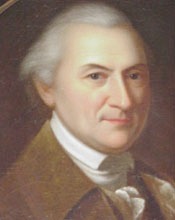
|
| John Dickinson |
While details were better left hazy, the broad outline of a new proposal had to appeal to almost everyone. Since the new Constitution was intended to shift power from the states to the national government, it was vital for voting power in the national legislature to reflect districts of equal population size, selected directly by popular elections. That was what the Articles of Confederation prescribed. But no appointments by state legislatures, please. In the convention, it became evident that small states would fear being controlled by large ones through almost any arrangement at all. On the other hand, small states were particularly anxious to be defended by a strong national army and navy, which requires a large population size. England, France, and Spain were stated to be the main fear, but small states feared big neighboring states, too. Since the Constitutional convention voted as states, small states were already in the strongest voting position they could ever expect, particularly since the Federalists at the convention needed their votes. Eventually, the agreement was found for the bicameral compromise suggested by John Dickinson of Delaware, which consisted of a Senate selected and presumably voting as states, and a House of Representatives elected in proportion to population; with all bills requiring the concurrence of both houses. From the perspective of two centuries later, we can see that allowing state legislatures to redraw congressional districts gives them the power to "Gerrymander" their election outcomes and hence restores to the populous states some of the internal Congressional power Washington and Madison were trying to take away from them. In the 21st Century, New Jersey is an example among a number of states where it can fairly be said that the decennial redistricting of congressional borders accurately predicts the congressional elections for the following ten years. The congressional seniority system then solidifies the power of local political machines over the core of Congressional politics. However, the irony emerges that Gerrymandering is impossible in the Senate, and hence legislature control over their U.S. Senators has been weak ever since the 17th Amendment established senatorial election by popular vote. That's eventually the opposite of the result originally conceded by the Constitutional Convention, but possibly in accord with the wishes of the Federalists who dominated it.

|
| Electoral College Method for Election of the President |
This evolving arrangement of the national legislative bodies seemed in 1787 an improvement over the system for state legislatures because the Federalists believed larger legislatures would contain less corruption because they had more competing for special interests to complain about it. There were skeptics then as now, who wished to weaken the tyranny of the majority so evident in the large states and in the British parliament. To satisfy them, power was redistributed to the executive and judicial branches, which were intentionally selected differently. Here arises the source of the Electoral College for the election of the President. It gives greater weight to small states (and provokes a ruckus among large states whenever the national popular vote is close). Further balance in the bargaining was sought by lifetime appointments to the Judiciary, following selection by the President with the concurrence of the Senate. Without any anticipation in this early bargaining, an unexpectedly large executive bureaucracy promptly flourished under the control of the chief executive, lacking the republicanism so fervently sought by the founders everywhere else. This may be in harmony with the Federalist goal of removing patronage from legislature control, but Appropriations Committee chairmen have since found unofficial ways to assert pressure on the bureaucracy. It's quite an unbalanced expedient. Only in the case of the Defense Department is the balancing will of the Constitutional Convention made clear: the President is commander in chief, only Congress can declare war. Although this difficult process was meant to discourage wars, it mainly discouraged the declaration of wars; other evasions emerged. From placing the command under an elected President, emerges a stronger implicit emphasis on civilian control of the military, loosely linked to the fairly meaningless legislative approval of initiating warfare. There have been more armed conflicts than "declarations" of war, but no one can say how many there might otherwise have been. And there have been no examples of a Congress rejecting a President's urging for war.
And that's about it for what we might call the first phase of the Constitution or the Articles. In 1787 there arose a prevalent feeling that national laws should pre-empt state laws. In view of the need to get state legislatures to ratify the document however, this was withdrawn. The Constitution was designed to take as much power away from the states as could be taken without provoking them into refusing to ratify it. Since ratification did barely squeak through after huge exertions by the Federalists, the Constitution closely approaches the tolerable limit, and cannot be criticized for going any further. Since no other voluntary federation has gone even this far in the subsequent two hundred years, the margin between what is workable and what is achievable must be very narrow. Notice, however, the considerable difference between Congress having the power to overrule any state law, and declaring that any state law which conflicts with Federal law is invalid.
The details of this government structure were spelled out in detail in Sections I through IV. However, just to be sure, Section VI sums it all up in trenchant prose:
This Constitution, and the laws of the United States which shall be made in pursuance thereof; and all treaties made, or which shall be made, under the authority of the United States, shall be the supreme law of the land; and the judges in every state shall be bound thereby, anything in the Constitution or laws of any State to the contrary notwithstanding. The Senators and Representatives before mentioned, and the members of the several state legislatures, and all executive and judicial officers, both of the United States and of the several states, shall be bound by oath or affirmation, to support this Constitution; but no religious test shall ever be required as a qualification to any office or public trust under the United States.
Except for some housekeeping details, the structural Constitution ends here and can still be admired as sparse and concise. That final phrase about religious tests for office sounds like a strange afterthought, but in fact, its position and lack of any possible ambiguity serve to remind the nation of grim experience that only religion has caused more problems than factionalism. Madison was particularly strong on this point, having in mind the undue influence the Anglican Church exerted as the established religion of Virginia. There are no qualifications; religion is not to have any part of government power or policy. By tradition, symbolism has not been prohibited. But government as an extension of religion is emphatically excluded, as is religion as an agency of government. Many failures of governments, past and present, can be traced to an irresolution to summon up this degree of emphasis about a principle too absolute to tolerate wordiness.
A Gleam in Washington's Eye
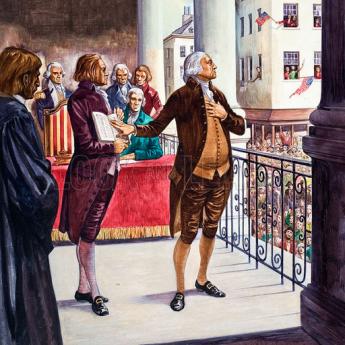
|
| George Washington Taking Oath |
On the eve of the Constitutional Convention, the nation was unhappy, confused, and dissatisfied; this wasn't what a victory was supposed to feel like. George Washington wanted a country to be proud of, big enough to discourage enemies, otherwise free of policing, regulation, or monarchy. Eight years of war had taught him it wasn't easy to have both liberty and discipline at the same time. Perhaps America was more unusually blessed, however, defended from invasion by oceans and wilderness, and from greed by a continent of natural resources. If order and justice could be organized, perhaps this by itself would enlist the loyalty of that mixture of classes and nationalities then flocking to our shores. Several important writers were having a strong influence on the era we now call the Enlightenment; David Hume and Adam Smith in Scotland, Edward Gibbon in England, Voltaire and Diderot in France, even Catherine the Great of Russia, with a thousand others including Benjamin Franklin and Robert Morris. Although Washington probably hadn't read them, Adam Smith's The Wealth of Nations showed unvarnished new ways of looking at commerce and politics, while Gibbon's The Decline and Fall of the Roman Empire showed what could happen if idealism gets neglected. Both books were published in the portentous year of 1776, describing many difficulties, but always suggesting problems could somehow be solved. There were plenty of ideas in circulation, but there was no plan.
It must have become obvious to Washington well before the Battle of Yorktown, that the Revolutionary War would not leave us with our problems solved. There was one brief moment as the British Army was withdrawing from Philadelphia in 1778 which seemingly justified boasts our troops had licked 'em. Just after the surrender of a whole British Army at the Battle of Saratoga, the British were also retreating from Philadelphia, and the Lord North offered generous peace terms through the Earl of Carlisle. No doubt the British public was restless after the Burgoyne defeat and the French alliance with America. Because the Carlisle episode is much more familiar in England than in America, perhaps it was a feint or a maneuver to embarrass the Earl of Carlisle or possibly just an exploration of the true state of affairs which were rumored about across a wide ocean. At any event, Gouverneur Morris was the visible American actor in this puzzling episode, but he must have been acting in concert with others. Lord North offered to give us our own elected parliament within a commonwealth; taxation with representation, no less. Morris seems to have dismissed this offer with contempt. But six more years of devastation ensued, surely convincing Washington that bitter defeat was still possible. That reality was concealed behind the graciousness of the French in allowing us to claim American troops had defeated the British at Yorktown. In fact, the preponderance of troop casualties, naval vessels and strategy had been French. The money had been mostly French as well. If that debt nearly bankrupted France, what might it have done to America?
Washington had been an outstanding athlete, soldier, and farmer, but his many travels about the colonies convinced him something more than leadership was needed. You just can't defeat a powerful enemy with short enlistments which give soldiers a legal right to go home on the eve of battle, and no way for the central command to extend the enlistments. To this, Robert Morris added that you can't buy gunpowder without the central power to levy taxes to pay for them. Morris warned him more was needed than a confederation so big others would leave it alone. Even temporary power wasn't enough. National disorganization had been just as bad after the Revolution as before. By 1787, Washington concluded the states just would not surrender power to a central national government unless the people forced them to give it up, and after a brief patriotic fervor, the people mostly wanted to go home for spring plowing. Peacetime also demonstrated another discouraging truth: meaningful improvement of the existing order meant the whole previous leadership class might leave public service to less qualified leaders, watching peace attract mediocrity to political office. Prominent men in the community gathered in a Constitutional Convention recognized the advantages of Union and devising peaceful ways to maintain it. After that transient moment when the memory of the war was fresh, politics could return to the mediocrities of a political class. That's not exactly what is now meant by "We, the People", but it might have to serve. In Washington's view, the voice of the people usually echoed along the lines of Tell us what good it would do to upset the Articles of Confederation, otherwise leave them alone. If you propose the general shape of a new central government, first tell us what it can do better than the states. And then show us how to make dubious state politicians agree to it. The accents of hesitation and defeat echo powerfully.
The hideous French Revolution was soon to demonstrate how unwise it was to look for short-cuts; we need a republic, not a stampeded democracy. George Washington was unsure just what was needed, but he knew a few basic things with certainty. America needed a bargain which everyone was expected to keep. A stronger central government should be provided for, and make it difficult to dissolve.
Repairing Constitutional Defects
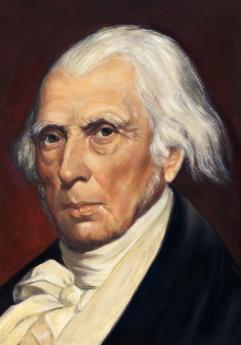
|
| James Madison |
Out of several thousand proposed ones, there have only been 27 successful amendments to the Constitution in two centuries; it's been intentionally hard to get an amendment passed. The Federalists wanted no amendment process at all; the anti Federalists wanted repeat conventions in which the whole document would be thrown on the table for reconsideration. The original document probably turned out better because of this tension; if it's hard to change, you better do it right the first time. And amendments had better be short and clear.
There will, of course, have to be some mid-course adjustments, most notoriously the XII Amendment, correcting drafting amateurishness which promptly led to all sorts of confusion in the election of the President and Vice-President. It was almost a Gilbert and Sullivan comedy, with the appearance of a tie vote in the 1800 Electoral College between Jefferson and Burr. Since the election campaign had been conducted with the clear intention that Burr would be the vice president on a combined ticket, what was really overlooked was the possibility that ambition would so overwhelm a candidate that he would niggle and cavil about a technicality, essentially trying to steal an election from a running-mate. When Burr later killed Jefferson's enemy Hamilton in a duel, not only was Burr twice disgraced, but the whole episode terminated expectation that gentlemen in a high office could always be depended on to do the right thing. Although philosophical debate can continue whether mankind is inherently good or inherently evil, American law now proclaims a presumed innocence of the accused, while privately assuming universal frailty of everybody.
Sometimes the amendment process has been brushed aside. William Henry Harrison was the first president to die in office, making John Tyler the first vice-president to face certain ambiguities of the Constitution over exactly what had been intended. By that time, the tradition had grown that the vice-presidential candidate was usually a member of the second strongest faction within the winning party. Combining the two makes a stronger ticket but a secretly jealous one. When the contingency of presidential death in office actually happened, there were voices that the vice-president was intended to remain, vice-president, while assuming the extra powers and duties of the president. Rather than have a debate or a Supreme Court wrangle, Tyler settled any such question by simply making himself president, thus establishing an enduring tradition. This solution raised the nit-picker difficulty that still no official succession plan has been provided for a vacant vice-presidential post. Instead of fixing this flaw, it has been ignored. The courts rely on the precedent they have set, which can be defended as constitutionally enshrining common sense, or attacked as refusing to admit making an error.
Somewhat similar corrective themes continue through Amendments XXII (two term Presidential limit), XXV (Presidential succession), XXVII (Congressional compensation). At least when dealing with politicians, it is better to be too specific than too trusting.
The Fourteenth Amendment is clear enough in its many sentences, and noble in intent. But that intention to reverse the original Constitutional tolerance of slavery and the later injustices of Reconstruction is couched in broader language than necessary for that purpose alone. It thus weakens itself by hinting sanctimony, the inclusion of soaring principles. As the grievous wounds of the Civil War have gradually healed, Abolitionists as well as slavers now seem often to have acted with excess, and malice toward some. Others may honorably disagree with this view. Nevertheless, it is quite right to emphasize that just as undue deference should not be accorded to some, undue suspicion should not be inflicted on others.
By a series of amendments, the right to vote has been extended gradually over the centuries. Amendment XXIV (Abolition of poll taxes) probably had other motivations but has the effect of removing a restraint on the vote of poor people, Amendment XIX (Women's suffrage), XXIII (Presidential electors for the District of Columbia), and XXVI (Reducing the voting age to 18) can be characterized as removing discrimination, but also can be seen as a gradual extension of suffrage by those who already have it, to others they have mistrusted for reasons defensible and indefensible. The common goal is to achieve sufficient trust and education to make any restrictions seem unnecessary to everyone while recognizing that continuing immigration of other cultures creates restlessness at the margins. Furthermore, poor people will outnumber rich ones for a long time to come and hence could potentially mistreat the minority. As long as only a minority of the enfranchised population at any level troubles to exercise its right to vote, the level of discomfort with this issue is enough to stimulate progress toward universal suffrage, while satisfaction with gradualism allows time to adjust to it.
Even Universal Franchise can be viewed with suspicion in a polarized political climate. Currently, a vigorous campaign for mandatory voter identification has been met with an equally vigorous denunciation as an attempt to deny the franchise to the poor. Typically, such proposals require the presentation of some government document with an identification photograph, such as a driver's license, to be presented at the voting place. The uproar this proposal has created has itself created suspicion of motive. Those who have experience with ballot-stuffing in elections refer to their common suspicions as "doing it the old-fashioned way." Citizens who make a few dollars as the poll-watchers report that the traditional procedure is as follows:
At least a third of registered voters do not vote, even in a contested Presidential election, and in big-city off-year primary elections, sometimes a heavy majority do not. In the old-fashioned way, the poll watchers wait for dinner time in a sparsely-attended precinct, with no newspapers or poll-watchers of the opposite party present. The registration lists are produced, and everyone who has not voted is voted for the desired candidate. The ruse is enhanced by driving in busloads of party loyalists, claiming to be the absent registered voter; and after casting their ballots, they are bussed off to another polling place to repeat the performance as often as there is time. Matching identification with the voter registration upsets this "good old way", in a manner which has nothing to do with the inability to afford a driver's license, or similar lame excuses.
Amendment XVI (Income tax) may cause dissatisfaction because America has traditionally . But it really is just a mid-course adjustment in the legal system, since a court had declared income taxation to be unconstitutional, and the Constitution was simply amended to remedy that misapprehension. An implicit point, however, is that as the federal government preempts the sources of taxation for itself, the states are weakened by the need to appeal for revenue. The XVII Amendment (Direct election of Senators) rather severely curtailed the control of the states over the central government, but the XI Amendment strengthened the states by forcing the citizen of a different state to sue a state in its own court. The issue of state and federal control, so central to the original Constitution, nowadays seems to be fading in the public mind.
And finally, we are left to consider the first ten amendments, the so-called Bill of Rights. While Madison always inclined somewhat in that direction, and grew more defiantly libertarian as he got older, the situation he faced when the first Congress convened was daunting. Between final ratification and actual convening of much the same people into the first congress, the states submitted over two hundred petitions for rights to be included in the Constitution by amendment. Thomas Jefferson and Patrick Henry had been tireless in stirring up the demand for rights to protect the individual from the government. Much of this reflected the French Revolution which went on for ten years during this period and drew on affection for France for its assistance to the struggling colonies during their rebellion against Great Britain. Others, of course, only needed to look toward George Washington, who had once heard the screams of Braddock's soldiers as they were tortured to death by the French and their Indian allies at Fort Duquesne. Washington had earlier and personally started the French and Indian War. John Adams was not pleased by torch-lit mobs breaking windows in Philadelphia in sympathy with France. So, as the main leader in the new Congress, Madison had the task of satisfying everybody about the Bill of Rights he had promised. It must be acknowledged that he did a masterful job. Not everybody was convinced it was a natural right of mankind to give everyone everything it might seem desirable to have. Somewhere in this arose the accepted definition of a right as something everyone would give to others, in order to have for himself. Madison was forced to search for common denominators, the maximum -- and minimum -- a number of rights which everyone would agree to. It offended his constitutional craftsmanship to see Congress drowned in a rush to confer greater force than law by saying the same thing in an amendment. Indeed, when some advocates strove to make a dubious right into a constitutional right, almost by definition it was not something everyone would agree to in order to have for himself. Madison did things in his life that may be questioned, but his achievement of condensing this hotch-potch of proposals into ten simple declarations, and then getting a raucous inexperienced congress to pass it -- is a political achievement to be marveled at. Even two centuries later, anyone who proposed opening up the Bill of Rights and recasting it in conformity with more modern understanding, would be hooted out of the room. May that ever remains the case.
Amendments IX (Non-enumerated rights) and X (Rights reserved to the states) deserve a different emphasis. Here lay the promise that the federal government had been proposed to achieve only those things a central government could achieve better; the states could do everything else. For this to be workable, the enumerated rights had to be comprehensive enough to satisfy the Federalists, and not include anything the anti-Federalists thought was improper. The anti Federalists knew very well this included everything the Federalists could possibly get the states to agree to, so the border was inevitably contentious. They got it wrong with slavery, and some of the amendments made mid-course adjustments. Boundary warfare would continue indefinitely in Congress, and sometimes wars and depressions cause proponents to change positions. But the document, freely agreed to by formerly sovereign states, has endured as nothing even remotely comparable has endured.
Field Marshal William Joseph Slim, 1st Viscount, Order of the Garter
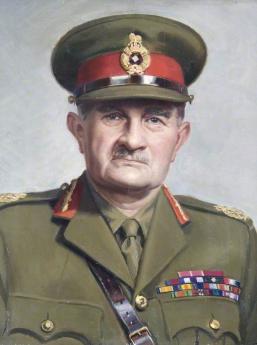
|
| Field Marshall William Joseph Slim |
It's impossible to be accurate about such rankings, but it must mean something when Field Marshall William Slim is the only officer of World War II to be ranked among the ten greatest generals of all time. The historian Ray Callahan recently described Slim's career to the Right Angle Club, with particular emphasis on how unlikely it was for a man of his humble beginnings even to be a Lieutenant in the British Army before World War I, how he endured pretty insufferable snubs along the way up the ladder of command, and how at the end of his career to be Chief of Staff he finally revealed that he had noticed those snubs, all right. Americans would be astonished at such class distinctions in their own army, and even raise the question how the British Army could possibly conquer the world for two hundred years with so little emphasis on merit selection of its generals.
First, the military story of Bill Slim. Before World War I, officer candidates were expected to pay for their own training, and he managed to get through a local college Officer Training course without enrolling in the college. Even that much training suddenly was in very short supply as Britain mobilized for the War, and he was commissioned with the limitation of "hostilities only" to emphasize that he was not in the "regular" Army. Working through the Mesopotamian campaign, he rose through the Indian Army, which Winston Churchill regarded as definitely second tier, with his permanent rank always lagging several levels below his "temporary", acting, rank. At one point, he received an official rebuke for advocating air power for ground support, since that was the turf of the Air Force, and on another occasion for irritating the Navy by using boats. When World War II suddenly sent Japanese forces plunging through Malaysia and Indo-China, Slim distinguished himself by keeping the defeated Indian Army intact through a 900 mile retreat into Burma, justifying his later memoir of turning Defeat Into Victory. During that demoralizing time, he had ample opportunity to observe the repeated Japanese tactic of launching lightning attacks without an established supply line, intending to live on the abandoned supplies of enemies as they were outflanked or surrounded by rapid advances. Slim developed the idea that if he's surrounded troops could be resupplied by air and hold out, the attacking Japanese would essentially starve to death in the jungle. One attacking Japanese army unit of 87,000 men was reduced to 13,000 survivors by the application of this strategy, and as long as the Japanese kept using their technique, Slim kept using his. One reverse variant of this use of air supply was employed by Slim in the recapture of Rangoon by himself attacking from the rear without the usual overland supply line, but resupplying by air as an approaching monsoon cut off the expected resupply by sea. After the war was over, Winston Churchill's history of the war's events contained only the briefest mention of these victories. When Slim finally met Churchill, a close election was taking place, and Churchill said he hoped the overseas ballots were cast for him. "Well, Prime Minister, I must say that no officer in my command voted for you," was the reply he got. When Churchill's successor Clement Attlee was told by Bernie Montgomery that the Chief of Staff position was promised to someone else, the terse order was, "Well, unpromise him." And Slim got the job.
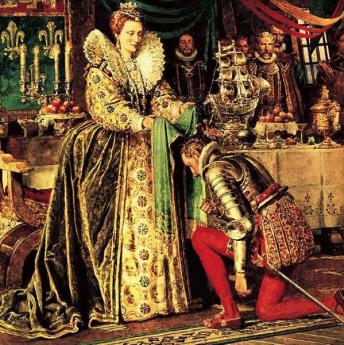
|
| Sir Francis Drake kneeling to Queen Elizabeth |
So, Ray Callahan the historian was asked the typically American question of however could the British Empire conquer Napoleon or plant the British flag over most of the world, using a system that would deliberately hold back an officer of Slim's talents, snubbing and intentionally humiliating most of the nation whenever one of the lesser orders was cheeky enough to aspire to military leadership. With great patience, Callahan replied that this system of placing aristocrats in charge of the military was designed to maintain civilian control against the military uprising. There might have been a time when King Arthur or King Henry V was personally in charge of the Army, but King Macbeth and General Cromwell both illustrate the disadvantages of a fully feudal system. Even before the Industrial Revolution, military skill did not translate well into the skills needed to run an industrialized country but nevertheless provided an easy route for a power-hungry military to seize the crown. It is true that America tends to elect prominent generals to be president after each of our major wars (Washington, Jackson, Harrison, Grant, and Eisenhower) and indeed most other presidents have had some military experience. But ever since George Washington made the principle clear, there has been a prevailing imperative about maintaining civilian control of the serving military, which even the American military seem to agree with. So it is not surprising that other nations with some more bitter experiences to recall insist on more than social pressure to maintain civilian control. Inherited wealth not only provides genetic advantages and a de-glamorized experience with power, but it tends to create its own local environment which regards power as scarcely worth striving for, power is what you have, not what you strive for, there's not a great deal to gain from overturning things. While not inordinately brilliant, hereditary aristocrats are not inordinately stupid, either; they produce their share of Wellingtons, Patton and Macarthurs.
In the first World War, however, the British discovered a serious flaw in the aristocratic system. Most defenders of that system will stress the high morale developed within the comradeship of a 1000-man regiment, carefully selected to choose individuals who "fit in". The British Army has been described as a "loose federation of regiments", collecting the history and traditions of the British Army in a way best understood in America by noting the special fervor of the U.S. Marine Corps. There is an undeniable disadvantage, however. In a mass mobilization, following a selective mass slaughter of volunteers (90% of British Regular Army officers were casualties in World War I), there simply may not be sufficient numbers in the historic regiments to run an effective mass army. That is the implied recognition behind the creation of officers for the duration of hostilities, only; get rid of that sort when the war is over because they can become a threat to cohesiveness. Some of that concern surely runs through the steady drumbeat to take guns away from the public, Second Amendment notwithstanding, repeal that damned thing if you have to. And the converse runs through the thinking of the Second Amendment supporters; you never know when some power freak might seize control of the military. The southern half of the country leans more strongly in that direction. They remember the experience of Reconstruction when official reins of power were in hostile hands. The Old South really likes the idea of its sons running all branches of the military at all levels. Makes a fellow more comfortable with having a strong government.
Philadelphia City-County Consolidation of 1854
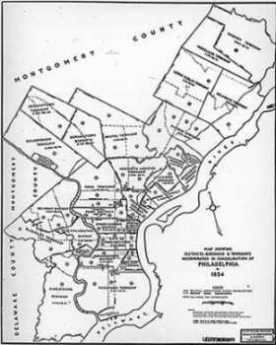
|
| Consolidation Map 1854 |
Philadelphia is still referred to as a city of neighborhoods. Prior to 1854, most of those neighborhoods were towns, boroughs, and townships, until the Act of City-County Consolidation merged them all into a countywide city. It was a time of tumultuous growth, with the city population growing from 120,000 to over 500,000 between the 1850 and 1860 census. There can be little doubt that disorderly growth was disruptive for both local loyalties and the ability of the small jurisdictions to cope with their problems, making consolidation politically much more achievable. A century later, there were still two hundred farms left in the county which was otherwise completely urbanized and industrialized. For seventy-five years, Philadelphia had the only major urban Republican political machine. By 1900 (and by using some carefully chosen definitions) it was possible to claim that Philadelphia was the richest city in the world, although this dizzy growth came to an abrupt end with the 1929 stock market crash, and the population of Philadelphia now shrinks every year. In answering the question of whether consolidation with the suburbs was a good thing or a bad thing, it was clearly a good thing. But since Philadelphia is suffering from decline, it becomes legitimate to ask whether its political boundaries might now be too large.
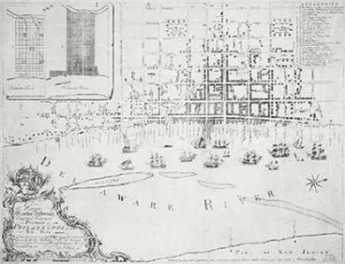
|
| Philadelphia Map 1762 |
The possible legitimacy of this suggestion is easily demonstrated by a train trip from New York to Washington. The borders of the city on both the north and the south are quickly noticed out the train window, as the place where prosperity ends and slums abruptly begin. In 1854 it was just the other way around, just as is still the case in many European cities like Paris and Madrid. But as the train gets closer to the station in the center of the city, it can also be noticed that the slums of the decaying city do not spread out from a rotten core. Center City reappears as a shining city on a hill, surrounded by a wide band of decay. The dynamic thrusting city once grew out to its political border, and then when population shrank, left a wide ring of abandonment. It had outgrown its blood supply. Prohibitively high gasoline taxes in Europe inhibit the American phenomenon of commuter suburbs. The economic advantage of cheap land overcomes the cost of building high-rise apartments upward, but there is some level of gasoline taxation which overcomes that advantage. Without meaning to impute duplicitous motives to anyone, it really is another legitimate question whether some current "green" environmental concerns might have some urban-suburban real estate competition mixed with concern about global warming. Let's skip hurriedly past that inflammatory observation, however, because the thought before us is not whether to manipulate gas taxes, but whether it might be useful to help post-industrial cities by contracting their political borders.
Before reaching that conclusion, however, it seems worthwhile to clarify the post-industrial concept. America certainly does have a rust belt of dying cities once centered on "heavy" industry which has now largely migrated abroad to underdeveloped nations. But while it is true that our national balance of trade shows weakness trying to export as much as we import, it is not true at all that we manufacture less than we once did. Rather, manufacturing productivity has increased so substantially that we actually manufacture more goods, but we do it with less manpower and less pollution, too. The productivity revolution is even more advanced in agriculture, which once was the main activity of everyone, but now employs less than 2% of the working population. This is not a quibble or a digression; it is mentioned in order to forestall any idea that cities would resume outward physical growth if only we could manipulate tariffs or monetary exchange rates or elect more protectionist politicians to Congress. Projecting demographics and economics into the far future, the physical diameters of most American cities are unlikely to widen, more likely to shrink. If other cities repeat the Philadelphia pattern, the vacant land for easy exploitation lies in the ruined band of property within the present political boundaries of cities, or if you please, between the prosperous urban center and the prosperous suburban ring.
Many American cities with populations of about 500,000 do need more room to grow, so let them do it just as Philadelphia did a century ago, by annexing suburbs. But there are other cities which have lost at least 500,000 population and thus have available low-cost low-tax land which would mostly enhance the neighborhood if existing structures were leveled to the ground. Curiously, both the shrunken urban core and the bumptious thriving suburbs could compete better for redeveloping this urban desert if the obstacles, mostly political and emotional, of the political boundary, could be more easily modified. But that's also just a political problem, and not necessarily an unsolvable one.
Unwritten Features of the Constitution
 Considerable anger is sometimes directed toward Judges who find unintended provisions in the Constitution. On the other hand, James Madison and some other Founding Fathers were careful to design the Constitution to create outcomes that are far from explicit. 
|
In their early writings, James Madison and the Federalists who participated in drafting the Constitution repeatedly emphasized their allegiance to republican ideals, republicanism, and a republican form of government. This sounds a little odd today, since obviously they were not alluding to the present Republican and Democratic parties, which had not been created. It seems natural to us to regard a republican form of government as a gradual extension of a democratic one, when the size of the electorate grows so large it cannot be readily managed by voice votes in a town meeting, when therefore it becomes necessary to select proxies, or representatives. That description greatly underestimates the subtlety of the Founding Fathers.
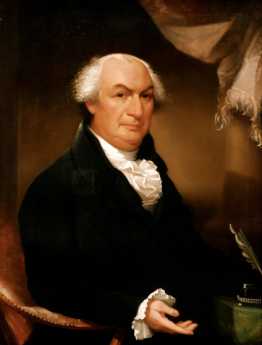
|
| Gouverneur Morris |
Two centrally important members of the Convention, James Madison and Gouverneur Morris, felt especially strongly about a feature that does not occur to many others. When the voters in a particular district pick a representative, they are generally trying to choose one who will not only reflect issues of local importance, but one who will be able to persuade representatives of other districts to vote favorably. In this way, representatives tend to be selected who are taller, handsomer, more intelligent, richer, and more famous than the average person in the district being represented. Not by much, perhaps, and sometimes not at all. But as a general thing, the election of representatives tends to create a House of Representatives who are superior in certain ways to the average person being represented. When candidates and political parties engage in public combat, an impression is given that "politicians" are low characters, but that is in fact not usually true. Many factors will discourage the best candidates from participating in disagreeable contests, and many stratagems are employed in an attempt to elect the worse of two candidates. But it is seldom the case that a successful candidate is less attractive or talented than the average person in his district. Republican governments almost always are composed of more distinguished persons than average, exposed to greater temptations perhaps and subject to more detailed scrutiny.
Madison was so taken with this idea that he proposed the Senate should be made up of people drawn from the House of Representatives in a second round of voting, thereby further purifying the result. For various reasons this approach was not adopted by the Convention, but it does have a logic to it, and it clearly illustrates that Madison was looking for results not always explicitly stated. Gouverneur Morris, on the other hand, was openly enthusiastic for this outcome, because he perceived that the government would be largely concerned with the rules of commerce and therefore the selection process would likely lead to a Congress that was richer and more able in those qualities of importance to commerce. On the one hand, America would gain national advantage in the Industrial Revolution then under way, and it would anyway be highly desirable to select richer people. In his later years, Morris was given to blunt and open preference for the smart set, and is often described as a covert aristocrat. At the time of the Convention however it seems likely he was making a perfectly valid point which had escaped many of his colleagues.
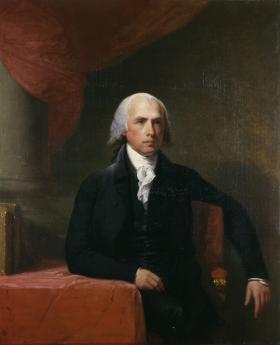
|
| James Madison |
Both Madison and Morris were seriously concerned about a flaw in the republican form of government. They thought it obvious there would always be more poor people than rich ones. Without some effort to rebalance things, the poor would inevitably destroy the common good by using their numerical strength to redistribute wealth from rich to poor. In doing so, everyone would be worse off, even the poor. The poor were more likely to be uneducated and thus more likely to put their own enrichment ahead of almost any other issue, using their own grievances as a justification. There was almost universal agreement among other members of the Convention, because it was well recognized that the main need for a new constitution had grown out of the egregious conduct of state legislatures under the Articles of Confederation, particularly in watering the currency with paper money, and profligate use of debt forgiveness. It would be impossible to have a prosperous country if it suffered from instability, destruction of merit incentives and respect for the property of others. If debts were capriciously forgiven, no one would lend. With paper currency printed indiscriminately, savings would be impossible.
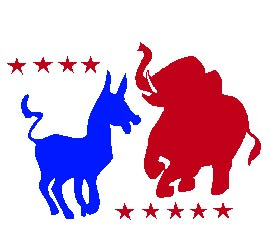
|
| Political parties |
Accordingly, the Convention set about balancing these innate tendencies as well as it could. There was general agreement that election districts with larger population size tended to produce better candidates. Not only employing the reasoning that in a larger district it would be harder to elect an unknown, insignificant person, they felt they could also see examples justifying faith that a larger number of competing internal interests would hold each other in check within the person of their elected representative. An indirect way of accomplishing this was to limit the total number of districts while also providing they be of equal population. Political parties were soon to come forward as a way of raising campaign funds, but nevertheless a person of greater means would have an advantage in a larger district, and persons of greater means could be expected to have greater talents, or would in any event be more likely to resist the pressures for redistributing the wealth of the rich. Members of the Senate were selected by the state governments (at least, as long as state assent was necessary for ratification of the Constitution), but the 17th Amendment changed that to popular election, with a clear resulting decrease of state influence and power. On the other hand, a heavy majority of Senators in the 21st Century continue to be independently wealthy, thereby still accomplishing two original objectives of the founding fathers at one stroke.
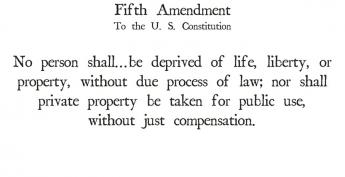
|
| 5th Amendment |
The original working concept of the Federalists was that the skills and prestige of the rich and powerful would promote the owners of property into elective office, and their power would be joined to that of judges, presidents, cabinet officers, and military officers to form an effective counterbalance to the majority voting power of the poor or others who lacked property to protect. The Federalists differed with the anti-Federalists on the source of danger to be guarded against; one group feared impetuous and ignorant greed inciting the multitude, while the other group mainly feared corruption and power-hunger among the powerful few. But both political parties acknowledged that each potential danger was realistic to some degree, and hence there was reason to hope both sides could agree to a balance of power as a sensible check on each other. True, the Fifth Amendment's "takings" clause did specifically provide for just compensation for private property seized by government under Eminent Domain, and the Eleventh Amendment protected state governments against private lawsuits in Federal court, but these seem rather feeble additions to the protections against potential tyrannies of the unpropertied majority, as soon to be seen in the revolutionaries of France. Thus an initial assessment would have to be that protection of the minority with property against legislative assault by the unpropertied majority, was only strong in the short run. But it was likely to succumb in the long run to majoritarian tyranny, as the less educated gradually learned how to use their voting power. To strengthen the balance, therefore, resort was made to limiting the voting franchise to owners of property, and specifically to freehold property, without debt. There was shrewdness to this idea, since it hints at a perception that future class divisions might not lie between rich and poor, but between creditors and debtors. The voting exclusion of females, children and slaves was surely irrelevant to the main issue, based on the 18th Century assumption that any votes from those excluded would anyway be passive, dominated by the male head of household. In any event, the limitation of voting power to freehold property owners was apparently a step too far, and did not last long.
It is not certain how consciously another important feature was considered. State legislatures prior to the Constitution were held in such disdain, that stripping them of the power to corrupt truly important issues was almost a universal goal. Awkwardly, a peaceful transfer of state power over the military and the currency could not be accomplished without securing the agreement of the states who had to ratify the Constitution. This was accomplished by specifying the strictly limited powers of the new Federal government, and ceding control of everything not specifically mentioned, back to the states. One by one, the functions which were vitally important were debated and defended in detail; the list was short. Everything else remained under state control. To go about things in this way had one significant advantage over complete federal control, and Madison specifically anticipated it. If a state government abused its power, the victims of that abuse could escape by relocating to a neighboring state. The potential abuse easiest to understand was a burdensome tax rate. But all of the commercial rules of the new entities called corporations were even more to the point, since rich people could move whole factories and businesses if they perceived enough grievance at home. Powerful people had ways of getting the attention of state governments, their U.S. Congressmen and Senators, and the constituents who voted for them. In New Jersey at present, 4% of the taxpayers pay 76% of state taxes; it is easy to demonstrate that the 4% are moving to other states about as fast as they can. Whether by industry or individually, the residents of a state know very well what their alternatives are in other states, and corporations can negotiate them directly. Whether to bluffing or actually moving, state politicians respond to the threat and which has considerable indirect effect at a national level. The system of checks and balances extends far beyond the words of the Constitution, and well beyond the rules of the Federal government. Its unwritten power extends beyond the control of a handful of Supreme Court justices, spatting over original intent. Its potential weakness, of course, lies in the Court's relative inability to protect what is not stated to be any of its business.
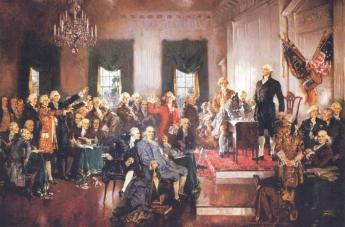
|
| 1787 founders |
One final point about the unspoken cleverness of our Constitution. Some of its most important powers were either unrecognized or intentionally unmentioned by its originators, to whom we look for original intent. After two centuries, we can see as they could not, that it was not merely the first time thirteen sovereign states gave up their power voluntarily and more or less cooperatively. In two hundred or more years, it begins to look as though nobody else can even imitate it successfully. One therefore hesitates to suggest changes of any sort, for fear some unrecognized balance will become unbalanced. Madison believed that increasing size leads to better government and better candidates for office; few would dispute that our Federal government generally does a better and more professional job than the fifty states which make it up. But stop to consider the United Nations. Invested with as much enthusiasm and much more idealism than our 1787 founders, the U.N. flounders and fumbles, and after fifty years must still be assessed to be a failure. Madison would seemingly have predicted that a bigger organization would be even stronger, even electing an assembly of giants. It hasn't worked out that way, and it is impossible to define what it lacks that the American Constitution has in abundance. By itself, this is the strongest possible argument for what is called original intent, but is really just a fearful plea to -- leave it alone.
Robert Barclay Justifies Quaker Meetings
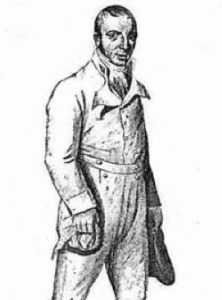
|
| Robert Barclay |
As part of the dissidence and Civil War of 17th Century England, Robert Barclay the Scotsman emerged with a point of view which was structured and reasoned in detail. What was almost unique was his reduction of it to a handful of pithy "Sound Bites". Coupled with membership in a prominent family, these abilities made him a particular friend of James, Duke of York, later King. Barclay became a Quaker at an early age.
The whole point of the Reformation was revulsion against the corrupt Catholic clergy, shielded behind some impossibly convoluted legalisms of doctrine. But for the governing establishment, any reform was going too far if it led to anarchy and chaos; combating disorder was then in many ways the central mission of the Catholic faith. The establishment did recognize that public revolt against universal micromanagement led to the scaffold for Kings who insisted on it. But in their view, the need for law and order still demanded some legitimacy, if not organized law. The Rangers, who paraded about stark naked and lived in ways resembling the hippies of the 1960s, were beyond the pale. Quakers, who professed no formal doctrine except silent meditation, might be possible just as threatening. After all, silent meditation could lead you anywhere including regicide. But the Quakers at least were quiet about it.
George Fox the founder of Quakerism had already provided one basis for containing fears of anarchy, by organizing local monthly meetings for worship within regional quarterly meetings; quarterly meetings, in turn, were within an overall framework of a yearly meeting. Occasional monthly meetings might develop a consensus for wild and antisocial behavior, indeed often did so, but would have to persuade the quarterly meetings whose members naturally outnumbered them. In extreme cases, the whole religion assembled in a yearly meeting. The innate conservatism of the meek would usually silence the extremism of the rebellious few. Very few kings would deny they could go no further toward despotism themselves, without the public behind them. The Quaker problem was to demonstrate what their consensus really was.

|
| Free Quaker Meeting House |
Essentially, the answer emerged that any religion which renounced a priesthood, which even renounced having a written doctrine, still needed some sort of institutional memory. If every Quaker began with a clean slate, to develop his own organized set of moral principles, then most of them would never get very far. Even if they did, they would have no time left for milking cows and weaving cloth. Single silent meditation was inefficient, particularly if you had faith that everyone was eventually going to arrive at the same convictions as the Sermon on the Mount. The founders of Quakerism took a chance, here. To assume the same outcome, you have to assume everyone starts with the same instincts and talents; even 21st Century America has private doubts about that one. Feudal England would have rejected it contemptuously. Carried to an extreme, it was a claim that everyone was as good a philosopher as Jesus of Nazareth, as good a person, as much a Son of God. That seemed like an arrogant claim. A more humble claim was that collectively, listening respectfully to one another in a gathered meeting, the whole world would over time reach the same truths as the Creator. If not, that still was as about as close as you were going to get to an oral memory, slowly building on the insights of the past.
Like all the early Quakers, Robert Barclay spent some time in jail. He did visit America in 1681, but it is doubtful if he spent any time here while he was Governor of East Jersey, from 1682 to 1688. The King insisted on his appointment, because he seemed the most reasonable man among the most reasonable sect of dissenters, and therefore the rebel he chose to deal with.
Grand Union
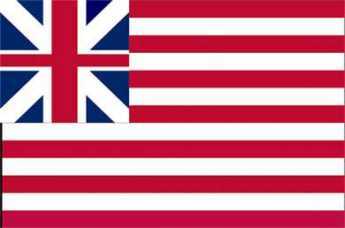
|
| Grand Union Flag |
THERE are a number of supermarkets in Philadelphia called Grand Union Stores, but the grocery conglomerate was founded in 1872. That Union was the Northern side in The American Civil War, and it is reported that life-sized replicas of Abraham Lincoln were once a common feature in the stores. Much earlier than that, the Grand Union was a term that meant the first American national flag, adopted in 1775, and created by a Philadelphia milliner, Margaret Manny. It was, however, quite similar to the flag of the British East India Company, and the Grand Union they were both talking about was the Union of England and Scotland of 1707. The jack of the Grand Union flag, soon to be replaced with a ring of thirteen stars, represented the crosses of England and Scotland, superimposed. When Northern Ireland joined the United Kingdom, the cross of Ireland was superimposed, to give the present form of the Union Jack. In 1775, the considerable colonial sentiment still hoped that hostilities would achieve a status for America along the lines of the other members of the United Kingdom.

|
| "Betsy Ross" Flag |
Although the number of stripes in the national flag briefly increased to fifteen at the time of admission of Kentucky and Vermont, stripes soon reverted to thirteen to symbolize the original thirteen states. After that single exception, only the stars in the jack increased to match the number of current states.
The early use of the Grand Union Flag is in some dispute, but it may possibly have been used by George Washington in the various battles around Boston and Charlestown. It was most certainly flown by John Paul Jones on his ship the Alfred . Because of its resemblance to the flag of the nation we were fighting to overthrow, it is understandable that there would soon be a desire to change it. That is what happened in 1777, although just who first had the idea is still open to dispute and myth-making.
America has had three flag acts:
The Flag Act of June 14, 1777 was passed by the Second Continental Congress (under the Articles of Confederation, of course. June 14 is now called Flag Day.) "Resolved, That the flag of the United States be made of thirteen stripes, alternate red and white; that the union be thirteen stars, white in a blue field, representing a new Constellation."
The Flag Act of January 13, 1794 (1 Stat. 341) An Act making an alteration in the Flag of the United States. Be it enacted by the Senate and House of Representatives of the United States of America in Congress Assembled, That from and after the first day of May, Anno Domini, one thousand seven hundred and ninety-five, the flag of the United States, be fifteen stripes alternate red and white. That the Union be fifteen stars, white in a blue field.
The Flag Act of April 4, 1818 (3 Stat. 415) An Act to establish the flag of the United States. Be it enacted by the Senate and House of Representatives of the United States of America, in Congress Assembled, That from and after the fourth day of July next, the flag of the United States be thirteen horizontal stripes, alternate red and white: that the union be twenty stars, white in a blue field. And be it further enacted, That on the admission of every new state into the Union, one star be added to the union of the flag; and that such addition shall take effect of the fourth day of July then next succeeding such admission.
States Rights Confront Civil War
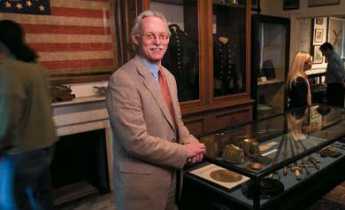
|
| Dr. Randall Miller |
Dr. Randall Miller of St. Joseph's University recently gave the Union League an interesting insight into the non-military upheavals of America by Congress during the Civil War. (Parenthetically, Dr. Miller is the author of Encyclopedia of Greater Philadelphia, which may give him still greater prominence in these columns when it reaches print.) Lincoln and the military get most of the headlines, but the greatest nation-building activities were products of the Congress, not Abraham Lincoln directly; the President was too busy directing the war to take much lead in other matters. The Republican Party of that time was freshly created, still strong in its idealism around elements of the party platform which really meant something to them. Although Senators John Sherman of Ohio and William P. Fessenden of Maine are remembered by history, most of the activity was conducted by members of the Congress who had reached seniority in committees and hence mostly had died off by the end of the War. It seems like one of history's great unfairnesses that a remarkable transformation of the nation was accomplished by people who are now largely unknown.
So Lincoln gets much of the credit by default, and the idealism and grand plans are lost in the current view that the Civil War was about liberating the slaves. That was, of course, part of it, but the Civil War was in fact mostly fought about the Union, and the Whig principles essential to nation-building. And the transformation was the vision of party politicians in offices which we currently regard as being filled by party hacks in safe seats. That wasn't the case at all; these visionaries knew where they wanted the country to go, and cleverly designed a set of programs to make it happen. Lincoln wanted to win the war; these men wanted to have a new nation emerge, after the war.

|
| Civil War |
It almost goes without saying that a Civil War over the secession of rebellious state governments from a Union created by the Constitution was going to weaken state power -- and strengthen Federal control -- if the Unionists won the war. That's what the Republicans wanted, and what the Southerners feared. But, strangely, both sides harbored warm feelings for the Constitution, wanting to preserve much of its essence. The Republicans, therefore, realized that many of the laws which were essential for winning the war, would lose their popularity and hence their force, once victory had been achieved. Reconstruction of the South, for example, was going to be unsustainable as soon as the huge Union Army was demobilized. The liberated slaves were unlikely to migrate to the western wilderness, and so the problems of racial readjustment were going to remain Southern problems for decades to come, without an army of occupation to maintain stability, law, and order. In fact, it was largely Southern whites who migrated to the far West, leaving the situation even more unstable back in the old Confederacy. How was a brave new nation to emerge from this mess?
War measures did help. There was no Federal currency until the War, and so a national system of greenbacks and war bonds helped to unify a vast and far-flung continent. The National Banks, fought over and feared for nearly a century, simply had to be created; all of these national rather than local symbols strengthened the national feeling. Putting 10% tax on state bonds was a pretty good indication that the congressional Republicans knew where they were driving things. The telegraph was of great value to wartime communication; it helped create a virtual community, with national news taking the place of local news.
Up until the Civil War, the main source of Federal income was derived from the sale of land; the new nation had a lot more land than gold. After the war, the nation found itself with taxation as the main source of income. The income tax was a step too far, of course, and it was repealed; but a system of national currency organized a system of national taxes which persisted. The country still had plenty of raw lands, but it was distributed by giving it to railroads in return for national transportation, and to land-grant colleges in return for greater uniformity of culture. Notice the hand of Congress, however. This land was to be surveyed land, not the land between this rock and that creek. Surveyors since the time of William Penn and George Washington were the agents of orderliness, law, and peaceful settlement of disputes. To that extent, surveyors broke up the reliance on local clans and territoriality; peace instead of conquest. The leaders of the North, the Republicans in Congress and the cabinet knew what they wanted; it was that the sacrifices of the war would find a reward in the peace that would follow and that reward would be a new nation.
Notice carefully the second section of the Thirteenth Amendment. The first section freed the slaves. The second section gave to the Federal government the charge of enforcing that liberty. The crafters of words and designers of rules, knew exactly where they wanted to go.

|
| The Constitution |
They did their work so well, that it begins to look as though the next few decades will display a crisis, created by going too far, too fast. In all these idealistic schemes, the state government is the enemy. State governments would interfere with Reconstruction; state governments would interfere with land grants and misuse their undisputed control of local law enforcement. State governments would introduce little strategies for restoring the power to tax and control, and to govern. State governments would slowly remember that the Constitution conferred only a few limited powers on the Federal government, and reserved all other powers to the states. The Constitution would never have achieved ratification without this explicit provision in the XII Amendment. And so, step by step, we have achieved some sort of goal by making the state governments into the weakest, most ineffectual, and yes the most corrupt parts of our national system. California, New York, New Jersey, and Michigan lead the way into what seems a certain disaster of enlisting municipal employees into political machines of the worst sort, and bankrupting the states that permit it. Massachusetts, Rhode Island, Maryland and West Virginia are not far behind.
Fanatics could persuade themselves that a solution readily lies in simply going all the way and eliminating state governments. But to do so would destroy James Madison's brilliant insight. The states place a limit on unlimited power from whatever source by offering the citizens a choice: if things get too bad, just move to a nearby state.
Re-Doing Dilworth Plaza
 |
| Richard Maimon |
Richard Maimon recently visited the Right Angle Club to tell us all about the architectural plans afoot to consolidate the underground transportation network underneath City Hall, change the patterns of foot traffic, open up the views, and draw the visitors to the expanded convention center into the city itself. All of this is to be accomplished by paving over Dilworth Plaza and planting it with grass, along with an extensive fountain installation which can be used for winter ice skating. In the course of creating an entrance hub for Septa, the Broad Street and Market subways, walkways are rearranged and -- it is hoped -- the foot traffic around City Hall will shift around to make it a real city center. It's a very expensive dream because of all the overlapping transportation tunnels hidden under the largest and heaviest stone building in America, leading to a great deal of expensive construction work that doesn't show.
 |
| interior view of concourse north_ |
Dilworth Plaza is currently almost completely deserted, so its conversion will not be much mourned. However, the mixture of contemporary transportation entrances with the neo-classical architectural style of City Hall will probably meet resistance, and there is concern that excessive foot traffic could convert a grassy park into a mud puddle, while a large open-air lake could become a public rest-room for the homeless if the designers aren't careful. To some extent, the public forces to be resisted in the design will be self-policing if the anticipated foot traffic is at the anticipated level, but overwhelmed if the project is too successful, or left to deteriorate if it fails to succeed. And it's all too expensive to do twice; the designers have to get it right the first time.
 |
| Section Pavilions |
So, it all comes down to money. Construction costs are less during a recession, but raising money is easier during a booming economy. High hopes are raised for a Democratic governor to be able to persuade a Democratic president to divert stimulus money our way. High hopes are raised for a former Mayor's ability to divert state funds to our part of the state. In other words, it all depends on Governor Rendell, now that Senator Specter has navigated himself off the Appropriations Chairmanship. In our system of government, public works projects have to be placed somewhere, so the best system is to rotate the goodies in an informal way. This rotation, in turn, depends on a geographical rotation of the top political officers, since they can claim that it is "Philadelphia's turn". So, the grim reality is that only two Philadelphia mayors in history have become governors of the state, with the rather bitter result that Philadelphia has been neglected in the siting of the available public projects for a very long time. Digby Baltzell long preached that it was our own fault, for being too non-aggressive. But most of the rest of us, particularly those who have wrangled with the upstate legislature, blame the situation on narrow-minded opposition from those who have worked the gerrymandering game for a couple of centuries.
William Penn, Excellent Lawyer, Terrible Businessman
Richard Dunn, who with his wife Mary Maples Dunn stand as the two core authorities on the life of William Penn, merely smiles when asked to describe what Penn was really all about. "What we need is to have one good biography emerge," said he, "but it isn't easy to guess what it will say". For the present, let's just sketch a few paradoxes which somehow need threading together.
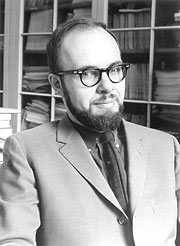
|
| Richard Dunn |
In the first place, the wealth of William Penn can only be described as prodigious. His father had played a central role in restoring the Stuart monarchs, and in the course of it had conquered for the Crown the enormously valuable property of the Island of Jamaica. For these efforts, the father had been rewarded with extensive properties in Ireland and a highly influential position at Court. To all of this was overgenerously added as debt repayment, the American territories which have now become the states of Delaware, New Jersey, and Pennsylvania. Actual ownership of some of this was shared with others, but all of it was quite effectively controlled by young William. No one else stands even close as the largest private landholder in American history. But to appreciate the immensity of his wealth, it should be understood that he treated this property as a sort of hobby. Over the course of his lifetime, the colonies lost money, and Penn subsidized them rather seriously from his other assets.
At the same time, Penn lived vastly beyond his income in ordinary ways, becoming heavily indebted, eventually going to debtor's prison. It probably was not necessary; his sons renounced Quakerism and made a profit on the colonies after they inherited them. Although he could display remarkable organizational talent, particularly in the organization of New Jersey, his management was mostly slack, his judgment of agents often proved too trusting, and he permitted himself to be exploited by poorly-designed contracts to his eventual financial ruin. Even that might not have been serious; he displayed a towering legal mind in the devising of the doctrine of jury nullification and was the winner in a great many lawsuits. He even demonstrated he was capable of winning dubious lawsuits, soundly defeating Lord Baltimore in a border dispute over Maryland which others have said showed Baltimore had the stronger case. We know he had influence at Court, and such legal victories suggest he might on occasion have taken full advantage of it.

|
| Gulielma Maria Springett Penn |
From the sound of things, some have concluded Penn was so rich and powerful he grew careless about his own best interests, which essentially needed very little defense. In particular, he gave this impression to his fellow Quakers, who concluded he did not need nor likely would stoop to collecting what he was owed in taxes and property sales. This cavalier attitude encouraged the early Quaker merchants to follow their own advantage without shame, and as it happened with great vigor. The Constitutions he devised for the colonies are frequently cited as the brilliant cornerstones of fairness and stability, ultimately the models for much of our present Constitution. Penn really was sincere in wanting to provide a better life for the working people than they could have at home in England. But in the Seventeenth Century, the modest role he devised for the Proprietor commanded little respect and was not one his aggressive clients would have chosen for themselves in his position. Perhaps the most generous description of their passive aggression would be that he taught power and governance to be the collective possession of the whole Quaker meeting, so the leaders of the meeting simply took him at his word. For their part, there can be little doubt of their commercial talents; trade and industry immediately thrived in the colony. However, sharp, aggressive trade and commerce were not things a gentleman would himself want to associate with.
Unfortunately, the historical records of the early colonies are not good; for the most part, we have to surmise the struggles and frictions between a rich, financially careless, and sincerely earnest theologian in his contention with a group of poorly educated strivers who had been told he regarded each of them to be his equal. As the saying goes, he was rich beyond denying. And therefore, he was probably arrogant beyond his own ability to see it as a flaw.
Equal before the law, perhaps, and equal in the prayers of First-day Meeting. But everything about his upbringing, his social circle in London, and his staggering wealth suggested that even a saint would have trouble believing, deep in his heart, that these were truly his equals. And even if perchance he did believe it, they would not have believed it for a moment, had their positions been reversed. Penn certainly acted as though he believed in religious freedom, serene in the idea that if every person earnestly thought hard about ethical issues, everyone would eventually reach about the same conclusion. The elders of the meeting, however, behaved in ways which suggested they would personally prefer non-Quakers to settle somewhere else, and given half a chance would create Quakerism as an established church. There seemed to be those who felt that Friend William was perhaps a little too trusting. And anyway there were some obvious paradoxes. William Penn kept personal slaves.

|
| Hannah Callowhill Penn |
With two wives, William Penn had thirteen children. Among them was considerable diversity of opinion, along with the same tendency to rebellion found in any two generations. Early illnesses and chance led to the emergence of those children who renounced Quakerism and showed no shame at all about wanting to have money in order to spend it recklessly. One would have supposed that a man of Penn's intellectual stature would have been able to control his family better, but his own reckless youth had been so extreme that he had few arguments available when, as seems virtually certain, rebellious children defended themselves by reminding him of his own indiscretions. William Penn displayed absolutely no sense of humor; a touch of it would have been useful in mastering a family and friends who were undoubtedly having a little trouble knowing what to make of this apparition in their midst. Some equally pompous Pennsylvania merchants might have had difficulty denying that in their passive aggression, they occasionally resembled the spoiled brats with whom he found he had ample family association.
REFERENCES
| Remember William Penn, 1644-1944: A Tercentenary Memorial : Edward Martin: ISBN-13: 978-1258369934 | Amazon |
William Penn and the Corporate Model
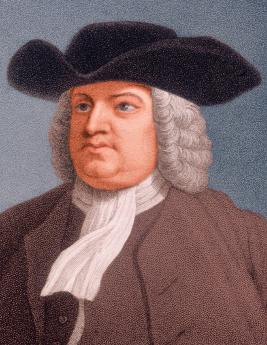
|
| William Penn |
The Proprietorship of West Jersey is pretty much unchallenged as the oldest surviving stockholder corporation in America. A number of points could be made about this creation, but an essential one is that Penn had very few existing models to work from. Nowadays, there are thousands of corporations in existence all over the world, many of them started by men of very little education or notable intelligence. Now that the subject has been mentioned, I can confess that I started three of them, myself. As I recall, it required only an hour's visit to a lawyer's office, for an agreed fee of $500 for each one of them, and after a two-week delay, I was said to be in business.
By contrast, consider Penn's problem. He had to conceive of the idea, and decide to go forward with it in spite of probably having almost no association with any other corporation, and probably without any assistance from any lawyer who had useful experience. While it is unlikely that he designed the modern corporation, or even contributed many useful design ideas, it is also likely he was so unaware of the known features of corporate design that he was nearly in the position of re-inventing this wheel if he expected it to succeed.
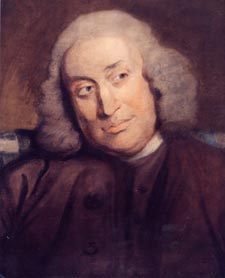
|
| Samuel Johnson |
Nowadays, a lot of entrepreneurs are in a similar state of innocence about corporate structure, but the models exist and the rules have been made and tested. An hour's conference with an accountant and a lawyer is all that is needed to avoid a million pitfalls, simply setting out on a well-trodden path. A modern businessman may go to business school and emerge with the complaint that he was not taught anything very useful, but that is far from the case. An entrepreneur doesn't need to know much about accounting, or corporate law, or tax law, or personnel management. But he does need to know that he needs the services of an accountant, a lawyer, a tax expert, and an office manager. These experts exist and provide their services as a reliable package. Back in the Seventeenth century, those professions didn't exist, and it was scarcely common knowledge that the corporation couldn't function without a number of working parts. The skill of supervision, some concept of how to find and manage capable subordinate leaders, how much to pay them, all fell to the pioneer to discover. In Penn's case, he had to have a reliable organization in order to manage, even to police, the day-to-day complexities of a staff of people going about their duties, while he went about his own. His personal chores included making personal arrangements with the King of England to acquire what has become three states: New Jersey, Pennsylvania, and Delaware; it required negotiations with the Indians, and with New York, Maryland and Virginia about their disputes with him. He had to organize the Assembly, deal with the major stockholders, and worry about wars and uprisings three thousand miles away.
As Samuel Johnson observed about a dog walking on two hind legs, the remarkable thing was not that he did it well, but that he did it at all.
SEPTA's Long Term Planning

|
| Septa |
Byron S. Comati, the Director of Strategic Planning and Analysis for SEPTA (Southeastern Pennsylvania Transportation Authority), kindly gave the Right Angle Club an inside look at the hopes and plans of SEPTA for the near (five-year) future. Students of large organizations favor a five or six-year planning cycle as both short enough to be realistic, and long enough to expect to see tangible response. If plans continuously readjust to fit the five-year horizon, the concept is that the organization will move forward on these stepping stones, even accounting for setbacks, disappointments, and surprises. Furthermore, a serious level of continuous planning puts an organization in a position to react when funding opportunities arise, such as the sudden demand of the Obama Administration that economic stimulus proposals be "shovel ready."

|
| The Silverline V |
So, SEPTA is currently promoting five major expansions, based on the emerging success of an earlier plan, the Silverliner V. Silverline is a set of 120 shiny new cars, built in Korea on the model of electrical multiple units, which are expected in Spring 2011 to replace 73 cars or units which were built in 1963. Obviously, 120 are more expensive than 73, but they are more flexible as well. And less wasteful; most commuters are familiar with the model of three seats abreast which unfortunately conflict with the social preferences of the public, tending to make the car seem crowded even though it is a third empty. When a misjudgment like this is made, it takes fifty years to replace it with something better. For example, there's currently a movement toward "Green construction", which is acknowledged to be "a little bit more expensive". The actual costs and savings of green construction have yet to become firmly agreed on, so there's an advantage to being conservative about what's new and trendy in things that take fifty years to wear out.

|
| Septa Regional Map |
Four of SEPTA's five major proposed projects are in the Pennsylvania suburbs. New Jersey has its own transportation authority, and Philadelphia is thus left to struggle with the much higher costs of urban reconstruction assigned to its declining industrial population. And left unmentioned is the six hundred pound gorilla of the transportation costs of new casinos. A great many people are violently opposed to legalized gambling, and even more upset by the idea of crime emerging in the neighborhoods of gambling enterprises. Even the politicians who enacted this legislation are uncomfortable to see the rather large expenditures which will eat into the net revenue from this development. Nevertheless, if you are running a transportation system, you have an obligation to plan for every large shift in transportation patterns, no matter what you might think of the wisdom of the venture. The alternative is to face an inevitable storm of criticism if casinos come about, but without any preparation having been made for the transportation consequences. At present, the public transportation plan for the casinos is to organize a light rail line along the Delaware waterfront, connecting to the rest of the city through a spur line west up Market Street; it may go to 30th Street Station, or it may stop at City Hall. That sounds a lot like the present Market-Frankford line, so expect some resistance when the cost estimates are revealed. Because all merchants want to have the station stops near them, and almost no residents want a lot of casino foot-traffic near their homes and schools, expect an outcry from those directions, as well. It would be nice to integrate this activity with something which would revive the river wards, but it seems a long stretch to connect with Wilmington on the south, or Trenton on the north.
The planned expansions in the suburban Pennsylvania counties will probably encounter less controversy, although it is the sorry fate of all transportation officials to endure some hostility and criticism for any changes whatever. Generally speaking, the four extensions follow a similar pattern of building along old or abandoned rail lines, following rather than leading the population migrations of the past. When you are organizing mass transit, there is a need to foresee with some certainty that there will be a net increase in commuters in the region under consideration. The one and two passenger automobile is a much more flexible instrument for adjusting to the growth of new development, schools, retail, and industry. Once the region has become established, there is room for an argument that transportation in larger bulk is cheaper, cleaner or whatever.
The Norristown extension follows the existing but underused rail connections to Reading. Route US 422 opened up the region formerly serving the anthracite industry, but now the clamor is rising that US 422 is impossibly crowded and needs to be supplemented with mass transit.
The Quakertown extension follows the rail route abandoned in 1980 to Bethlehem and Allentown, although the extension is only planned as far as Shelly, PA.
The Norristown high-speed extension responds to the almost total lack of public transportation to the King of Prussia shopping center, and will possibly replace the light rail connection to downtown Philadelphia.
And the Paoli extension follows the mainline Amtrak rails as far as Coatesville.
All of these expansions can expect to be greeted with huzzahs by developers, land speculators, and newsmedia, but resistance will inevitably be as fierce as it always is. Local business always fears an expansion of its competitors; the feeling is stronger in the suburbs than the city, but local business always resists and local politicians always follow their lead. To some extent, the suburbs have a point, since radial extensions are usually much cheaper to build than lateral or circumferential transportation media; bus routes are the favored pioneers in connecting one suburb with another. Therefore, the tendency in these present plans remains typical by threatening the suburbs with a need to travel toward the center hub, then take a reverse branch back in the general direction of where they started, in order to go a short distance to a shopping center or school system. The two main river systems around Philadelphia interfere with the construction of big "X" routes from the far distance in one direction to the far distance in the opposite direction. Euclidian geometry makes the circumferential route elongate as the square of the radius. And jealousies between the politicians in three states create rally foci for the special local interests which feel injured. Since it seems to be an established fact that the proportional contribution to mass transportation by the surrounding suburbs of Philadelphia is traditionally (and considerably) lower than the national average, a political reconciliation might do more for the finances of SEPTA than any federal stimulus package could do. For such reconciliation, a few lateral connections in the net might pacify the suburbs enough to justify the extra cost. Unfortunately, the main source of unjustified cost in regional mass transit is the high wage and benefit levels of the employees, a situation inherited from the old days when commuter rail was part of the stockholder-owned regional railroads. Just as featherbedding was the main cause of the destruction of the mainline railroads, health and pension benefits threaten the life of mass transit. In the old days, local governments acted as a megaphone for union demands. So the railroads just gave the commuter system to the local governments, and let them wrestle with the unions themselves. Since the survival of the urban region depends on conquering this financial drain, the problem must be gradually worn down. But it has been remarkable how long the region has been willing to flirt with bankruptcy rather than bite this bullet.
If anything, this friction threatens to get worse. In 2009, for the first time, a majority of union members in America -- work for the government, the one industry which thinks it cannot be destroyed by losing money. True, SEPTA is not exactly a government function, but it has enough in common with a government department to arouse suburban voters, who regularly refer to it as an arm of the urban political machine. SEPTA isn't too big to fail, but there exists little doubt that government at some level would probably try to bail it out if it did.
Go to Delaware, Elephants?
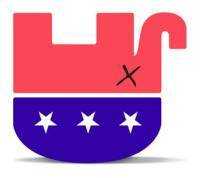
|
| Dead Elephant |
No one is supposed to know where elephants go to die, but if they are smart as people say they are, my suggestion is to search for dead elephants in the state of Delaware. Most taxes, and estate taxes, in particular, are considerably lower, there. At least this was the message Christopher J. Topolewski, Esq. conveyed to the Right Angle Club recently. His firm, West Capital Management, has prepared a table comparing the taxes in the three states that come together at the southeast corner of Pennsylvania, which for residents of the Philadelphia area are within easy commuting distance of each other. Although Delaware has a marriage penalty (one couple is taxed more than the sum of two singles), it has no estate tax at all, no sales tax, and a property tax rate only half that of Pennsylvania, only a quarter of that in New Jersey. For residents of New Jersey, there is almost no tax which is not lower in Delaware, because but ex-Pennsylvanians would then have to be careful to die or cohabit since ordinary income tax and capital gains taxes are higher in Delaware than Pennsylvania. If you must die (and who doesn't?), go die in Delaware.
This was a situation specifically contemplated as a way to discipline greedy state governments, by James Madison when he was formulating the U. S. Constitution. And there is evidence it is working. By happenstance, I once encountered an official of New Jersey taxation, who told me that 43% of New Jersey taxes are paid by 1% of the population. And that 1% was moving out of the state as fast as it could. If it does, the other 99% of New Jersey residents will find their taxes rising by 43%. West Capital reports that taxation as a percent of income is 1.23% in Delaware, 3.46% in Pennsylvania, and 5.82% in New Jersey, suggesting that a selective flight of the 1% would raise the state taxes of everyone else by 43%, and thus make state taxation as a percent of lowered average income rise to roughly 20%. Relating total income to total tax revenues would be an even better way to detect hidden indirect taxes, such as overtaxing utilities in the knowledge it will be passed on to the consumer. I recently discovered that a few years ago, the Legislature got tired of hearing complaints about local taxes, so they transferred half of the local taxes to the state tax. That's pretty much like taking it from one pocket and putting it into another because now all the hubbub is about state taxes. Armed with even partial information, it becomes easier to understand why New Jersey would evict a governor who had been Co-chairman of Goldman Sachs, during a financial crisis. If a financial whiz can't change this, maybe it requires a meat ax.
This is a time of growing restlessness about public spending, and Tea Party revolts are likely to accelerate during the remaining nine months before the next election. The conjecture is growing about a coming deadlock between a Republican Congress and a Democratic President, lasting at least two more years. What might emerge from a strong third party congressional delegation is too arcane to discuss. But at least the Republicans who leave can console themselves they are selectively raising the taxes of Democrats.
It seems almost inconceivable that professional politicians would demonstrate such a forest of tin ears as to let this happen, but the rest of Mr. Topolewski's talk just heated up the fire. His long-scheduled talk was designed to give guidance about the new estate tax laws, but he found himself confounding his audience with the news that there are no new estate tax laws; in fact, there will be no estate tax laws at all after this year unless they emerge from the congressional gridlock we already have. Which apparently will be followed by a gridlock we can scarcely imagine. Imagine asking your lawyer to write a will which straddles the contingencies that there will be no law, that there might be a continuation of the present one, or there might be some new law of quite uncertain wording. One of the suggestions offered is to allow your executor the discretion to accept or disclaim certain hypothetical provisions.
And that brings up an old story. William Penn was the largest private landowner in the history of America, possibly the whole world. He had a trusted agent, who gave him an enormous pile of papers to sign. A busy rich man like Penn is regularly confronted with a discouragingly large number of routine legal documents to sign. So, Penn signed them all, not noticing that one of the various papers in the pile gave the entire state of Pennsylvania -- to his agent. The outcome of the ensuing uproar was that Penn spent six years in debtors prison.
Unalienable Rights Before 1776
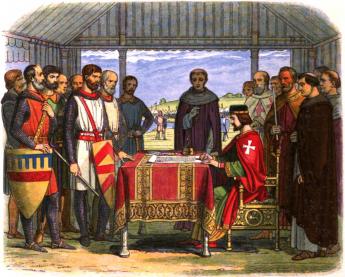
|
| Magna Carta |
In 1976, the bicentennial birthday celebration of the Declaration of Independence contained two major exhibits of its conceptual origins. Mr. H. Ross Perot of Texas loaned his copy of the 1215 Magna Carta, and the Proprietors of West Jersey loaned their 1677 original of William Penn's Concessions and Agreements to the colonists of New Jersey. The purpose of the exhibit was to emphasize the historical origins of the concepts within the Declaration, but even the language of the Concessions is remarkably similar, quite evidently lifted by Jefferson when he was writing. On one point, Penn had the better of Jefferson; he correctly wrote about inalienable rights, while somehow Jefferson gave us unalienable ones.
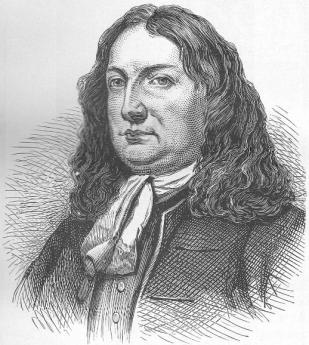
|
| William Penn |
The matter came up recently at a Socrates meeting of the Right Angle Club, where at least one member felt there was no such thing as a natural right, while others wavered. In discussing the rights which the Creator, William Penn and/or Thomas Jefferson may have given us, the various contexts must be held in mind. At the time of declaring our intention to sever relations with Britain's King, there was no Constitution to refer to as a source, and it was impolitic to assert the rights had been given by English kings, like King John. Therefore, the language cleverly short-cuts around the divine right of kings to make a direct connection between the Creator and the colonists. William Penn on the other hand, was a real estate promoter, offering enticements and assurances to prospective colonists who were naturally fearful of risking their lives in sailboats, only to face the possible tyranny of a vassal king who might be even worse than the anointed one. Not only did Penn renounce any suggestion of a Royal role for himself, but went to considerable length describing the legally binding concessions and agreements he was offering. The right of trial by jury, for example, became a right to be punished only by a jury of twelve of one's neighbors. He wasn't talking to lawyers, he was making important distinctions very clear to laymen. These were not rights given by a Divinity who could be trusted, nor something which grew out of Mother Nature. They were the personal promises of William Penn, in personal legal jeopardy of the English courts if he reneged on them. He even had a ready answer for those who discovered the religious language in legal documents -- the Quaker belief that, occasional appearances to the contrary notwithstanding, There is That of God, in every man.
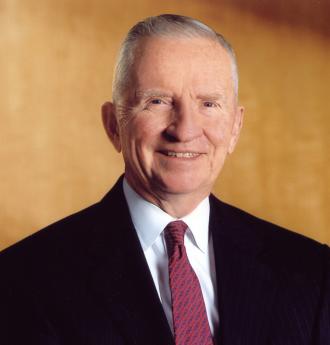
|
| H. Ross Perot |
As a small sidelight of the Concessions document, it had long been housed in the little brick hut on Main Street in Burlington NJ, where the Proprietors of West Jersey keep their treasures. The obscurity of these papers was probably their best protection, but the risk of displaying them in Philadelphia at the centennial brought out the need to ensure them, hence to appraise their value. The figure of four million dollars was kicked around. Ross Perot might have felt comfortable with this sort of expense as the natural cost of being a rare book collector, but it seemed highly unnatural to Quakers. Sometime afterward, the Surveyor General, William Taylor, was awakened by a call from Burlington neighbors that someone was trying to break in the roof to steal contents of the Proprietorship building. The burglars were unaware that underneath the shingles, the roof was actually made of concrete a foot thick. So the perps were frustrated in their aims, but Bill Taylor was greatly troubled by the implications, actually unable to sleep at night worrying about what was in his custody. So, in time the State of New Jersey constructed a suitable archives building, and the valuable documents were transferred up to Trenton. Time will tell what the Soprano State does with such a valuable possession, but at least the Quakers can now sleep at night.
Inalienable Rights Before the Magna Carta
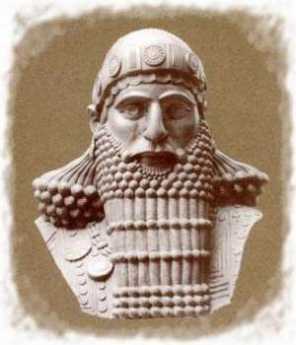
|
| Hammurabi |
Although we have had Judges for thousands of years, it's only one of the three branches of American government, and the last to be adopted, even in rudimentary form. Perhaps the framers felt the legal profession could handle the matter without much specification, just as at least so far, we have no cabinet minister or separate department for Medicine, in spite of its coming close to twenty percent of the national budget. At least it is certain that the award of a cabinet seat does not relate to the size of its national cost. The main function of the Supreme Court seems to be to enforce the Constitution on the elected branches, and the main rule is to limit the federal branches to making war and levying taxes. That's under constant attack, but at least it's the theory. An invisible rule is to avoid non-federal rules; we rejected the League of Nations, and essentially ignore the United Nations. The surest way to defeat a law is to say the Europeans have one like it.
This seems to be partly a human jealousy, quite similar to the way the federal government constantly seeks to invade the territory the Constitution gives to state legislatures. One of the central attractions of Roman citizenship was the set of rights afforded the citizens, and definitely not afforded to other people. St. Paul made good use of the rights of a Roman citizen, available to those who could announce civis Romani sum . These were, however, the exclusive gift of the Roman Senate, which for a long time Emperors feared to tamper with.
Chip Kelly of the Right Angle Club points out that Hammurabi intended the right of a tooth for a tooth and an eye for an eye as a limitation of rights. If someone offended you or your family, you were definitely not entitled to overreact by massacring his whole tribe but limited to exact equality of the punishment to fit the crime. An eye for an eye, tooth for a tooth -- and no more.
Somewhere, there may be a reasoned argument for natural rights or divine rights, but outside the French Revolution, it is a little hard to find anything but legal rights, as consistent rights which society, in general, has decided to give you. That's somehow related to the concept of extending those rights to everyone, which everyone would want to have for himself. Anything more restricted than that is not a human right, it is political favoritism. It may even be much of the reason the French and English rejected the European Union.
A cynic might say that an inalienable right is one which is impossible to bargain for. It will only be conferred if you are willing to die for it in a war which you win. When it comes down to it, that is the reason professional soldiers regard religious wars as the very worst kind and may just be a driving force behind the First Amendment.
REFERENCES
| Magna Charta: PartI Romance Part II Pedigrees | Amazon |
Three Revolutions at Once, Maybe Four
The rise of the Tea Party movement in 2010 reopens a lifetime question in my mind. What was the American Revolutionary War all about; surely, a tax on tea isn't outrageous enough to go to war over, is it? It only aggravates curiosity to learn this particular law passed by the British Parliament, actually lowered the price of tea.
A somewhat different importance for the 21st Century is, of all the dozens or even hundreds of little civil wars that have popped up in the past two centuries, this American one seems to have had the biggest impact on the thoughts and behavior of the civilized world. The French Revolution comes close, but we meant to speak of persuasive influence on serious minds, not merely bloodiness and lasting grievance. Here are three suggestions, maybe four.
In retrospect, we can see the outlines of three major revolutions, coming together at the end of the 18th Century. The first is the Industrial Revolution, which had its beginnings in England around the city of Manchester. That was a region of major Quaker concentration, many of whom migrated to William Penn's social experiment in seeing what peace could do. The Industrial Revolution flourished in Great Britain far more readily than in France, and in a sense more than in America. But of the three major countries, America had the largest amount of unsettled land and the greatest natural resources of the three major countries. America was able to think bigger and broader, necessarily requiring broad support from an immigrant population. Diversity was often later to prove a mixed blessing, but in the Industrial Revolution it was vital.

|
| Dissent, French Style |
The second major revolution taking place at that time concerned the place of property in the life of every citizen. Up until that time, the King owned all the land and could redistribute it to suit his political needs. What critically mattered was not who formerly owned the land, but rather what was the latest King's latest word on who owned it right now. The American system gravitated to the notion that when the King or any other owner sold the land, it was no longer his; we now think that's quite self-evident. Each successive owner can sell it to his neighbor or bequeath it to his heirs, and at that moment it is no longer his, either. This idea of private property spread throughout the world, but in America, it was a clean sweep. Adopting the rather brutal rough justice of the frontier, the Indian prior ownership just didn't count. They had sided with the British in our revolution and were insistently resistant to assimilation. And anyway, Pope Nicholas in the 13th Century had established the notion of first discovery, which applied to Christians, only, and so Indians didn't count. Fair or unfair, this was going to be the way it was, from that point forward from 1787 when the Constitution was enacted. The longer the situation lasted, the more unlikely it became that it would ever change. America had so much land and so little coinage, that land itself became a sort of monetary standard. The particular American advantage was there was so much land that early settlers and landed gentry could not monopolize it; from meaning land at first, property soon meant any valuable possession. No King, particularly not George III, was going to take this away from the whole population on this side of the Atlantic. England could do as it pleased with its land and its King. If we needed Independence to preserve a general right to hold private property, plenty of men were willing to die to achieve it. And the whole Western world soon followed our example.
The third revolution was the one you read about, Lexington and Concord, Bunker Hill and the Tea Act. That whole chain of events chronicles how America came to be Independent but somehow fails to explain why we wanted Independence. The Industrial and the Property revolutions explain it better, but such theorizing would certainly mystify the Revolutionaries themselves.
And finally, one begins to wonder if we aren't toying with a reversion to the ideas underlying monarchy when we examine some currently widespread views. There's a notion going about that everybody owns everything, which if carried to an extreme means no one owns anything. When you can notice people who live on the 70th floor of a Manhattan apartment building, proclaiming a right to tell Alaskans whether or not they can drill for oil, you behold this monarchy of the many. And when you see prosperous educated adults shouting at rallies, you can see Alaskans, for example, want to tell New Yorkers to mind their own business. This land, they seem to say, isn't everybody's at all, it is mine.
It never really was entirely the King's, either. The King was a single person, sometimes a rather brutal one who wasn't likely to tolerate advice from his subjects. At times of crisis, somebody has to make a decision, any decision, and act on it. But most of the time, kings seemed to be in the position of that Czar. The one who said, "I don't rule Russia. Ten thousand clerks rule Russia."
Pennsylvania Likes Private Property Private
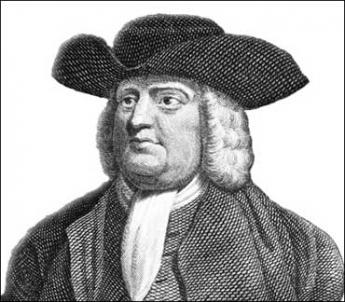
|
| William Penn Holding his Charter |
William Penn was the largest private landowner in America, maybe the whole world. He owned all of Pennsylvania, with the states of Delaware and New Jersey sort of thrown in. Although he and his descendants tried actively to sell off his real estate from 1684 to 1783, they still held an unsold three-fifths of it at the conclusion of the Revolutionary War, which they were forced to sell to the state for about fifteen cents per acre. This bit of history partly explains both the strong feeling this is private, not communal, land despite the existence of 2.3 million acres of the state forest system, which is affirmed right alongside the rather inconsistent feeling that raw land is somehow inexhaustible. Early settlers regarded the center of the state as poor farmland, particularly when compared with soil found in Lancaster and Dauphin Counties, or anticipated by settlers going to Ohio and Southern Illinois. A complimentary description is that glaciers descended to about the middle of Pennsylvania, denuding the northern half of topsoil which was then dumped on the southern part as the glaciers receded. Even today, farmers tend to avoid the northern region if they can, reciting the ancient advice from their fathers that "Only a Mennonite can make a go of it, around there."
So, lumbering had a century-long flurry in Central Pennsylvania, exhausting the trees and moving on. But that only related to the top layer of soil; beneath it lay anthracite in the East, and bituminous coal in Western Pennsylvania, supporting the steel industries of the two ends of the state with exuberant railroad development. Even today worldwide, hauling coal is the chief money-maker for railroads. The resulting availability of rail transport promotes the location of heavy industry near coal regions; the 20th Century decline of coal demand ultimately hurried the decline of heavy industry in the state by impairing the railroads.
Beneath all this lie the aquifers, porous caverns of fresh water. And beneath that, largely unsuspected for two centuries, lie the sedimentary deposits of a huge inland sea, compressed into petroleum which evaporates into natural gas. All of this is held by huge deposits of semi-porous shale rock, now mostly 8000 feet deep, stretching from Canada to Texas and called the Marcellus shale formation. If it can be economically recovered, there is more natural gas than in Arabia, and there is a similar formation along the near side of the Rocky Mountains in Colorado, stretching up to the Athabasca tar sands in Canada. There is another similar formation in France underneath Paris. No doubt, we will find the whole world has similar huge deposits for which the main problem has always been: how do you get it out?
There's another question, of course, of who owns it. Those who clearly do not own it maintain that everyone owns it. In the western world, most particularly in America, it is our firm belief that if you live on top of it, you own it. Since it is expensive to extract, quarrels like this are usually settled by purchasing mineral rights from the surface owner, who generally could not possibly extract it by himself. Those who assert they have a conflicting right to it because it belongs to everyone can expect belligerent resistance. At the present time when America faces a critical fifteen year period of dwindling oil supply, ultimately relieved by perfecting alternative energy sources, there is too little time to achieve consensus for any other governance theory. The problem which could possibly gain enough traction to interfere is the issue of potential damage to others which might result from the extraction of this subsurface treasure. Because of the apparent urgency of a decision to extract or go elsewhere to extract, the best we can hope for is some fairly rough justice.
Original Intent and the Miranda Decision
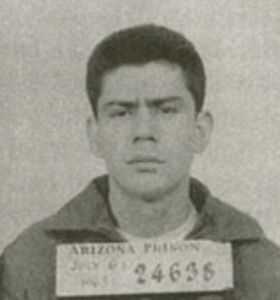
|
| Ernesto Arturo Miranda |
At the lunch table of the Franklin Inn Club recently, the Monday Morning Quarterbacks listened to a debate about Guantanamo Bay, prisoner torture and police brutality; all of which centered on the Supreme Court decision known as Miranda v Arizona. Ernesto Arturo Miranda was convicted without being warned of his right to remain silent, sentenced to 20 to 30 years in prison in 1966. Eventually, the U.S. Supreme Court, with Chief Justice Earl Warren writing a 5-4 decision, overturned the conviction, because Miranda had not been officially warned of his right to remain silent. The case was retried and Miranda was convicted and imprisoned on the basis of other evidence that included no confession.
An important fact about this case was that Congress soon wrote legislation making the reading of "Miranda Rights" unnecessary, but the Supreme Court then declared in the Dickerson case that Congress had no right to overturn a Constitutional right. Some of the subsequent fury about the Miranda case concerned the legal box it came in, with empowering the Supreme Court to create a new right that is not found in the written Constitution. Worse still, declaring it was not even subject to any other challenge by the other branches of government. In the view of some, this was a judicial power grab in a class with Marbury v Madison.
Several lawyers were at the lunch table on Camac Street, seemingly in agreement that Miranda was a good thing because the core of it was not to forbid unwarned interrogation, but rather a desirable refinement of court procedure to prohibit the introduction of such evidence into a trial. The lawyers pointed out the majority of criminal cases simply skirt this sort of evidence, use other sorts of evidence, and the criminals are routinely sent or not sent to jail without much influence from the Miranda issue. Indeed, Miranda himself was subsequently imprisoned on the basis of evidence which excluded his confession. What's all the fuss about?
And then, the agitated non-lawyers at the lunch table proceeded to display how deeper issues have overtaken this little rule of procedure. This Miranda principle prevents police brutality. Answer: It does not; it only prevents the use of testimony obtained by brutality from being introduced at trial. Secondly, Miranda contains an exception for issues of immediate public safety. Answer: What difference does that make, as long as the authorities refrain from using the confession in court? The chances are good that a person visibly endangering public safety is going to be punished without a confession. Further, the detailed procedures within Miranda encourage fugitives to discard evidence before they are officially arrested in a prescribed way. Answer: If the police officer sees guns or illicit drugs being thrown on the ground, do you think he needs a confession? Well, what about Guantanamo Bay? Answer: What about it? We understand the prisoners are there mainly to obtain information about the conspiracy abroad and to keep them from rejoining it. The alternative would likely be their execution, either by our capturing troops or by vengeful co-conspirators they had incriminated.
Somehow, this cross-fire seemed unsatisfying. The Miranda decision was made by a 5-4 majority, meaning a switch of a single vote would have reversed the outcome. The private discussions of the justices are secret, but it seems likely that some Justices were swayed by this edict viewed as a simple improvement in court procedure rather than a constitutional upheaval; Justices with that viewpoint feel they know the original intent and approve of it. Others are apprehensive the decision has already migrated from the original intent, in an alarming way. Everyone who watches much crime television and even many police officials feels that Miranda intends for all suspects to be tried on the basis of total isolation from interrogation from start to finish. More reasoned observers are alarmed that the process of discrediting all interrogation will lead to an ongoing disregard of the opinion of lawyers about court procedure, essentially the process of allowing public misunderstanding to overturn legal standards. Chief Justice William Renquist, no less, poured gasoline on this anxiety by declaring that Miranda has "become part of our culture".
What seems to be on display is the mechanism by which Constitutional interpretation drifts from the original intent. Not so much a matter of "Judicial Activism" which is "legislating from the bench", it is becoming a matter of non-lawyers confusing and stirring up the crowds until the Justices simply give up the argument. Drift is one thing; virtual bonfires and virtual torch-light parades are quite another.
Selection of Constitutional Rights for the Bill of Rights
When the First Congress convened in 1789, it confronted more than a hundred proposed amendments to the Constitution, largely stirred up by supporters of Thomas Jefferson who feared any strong government would be too similar to the monarchy we had just discarded. Essentially, Congress dumped these noisy dissatisfactions into the lap of James Madison who had largely constructed the Constitution, constituting a committee with Madison as its chairman. The first ten amendments emerged together as a package, enabling trade-offs and compromises; all subsequent amendments have been taken up individually, one by one. Since members of the First Congress and the Constitutional Convention were largely the same people, much of the durability of the Constitution can be traced to them. And therefore, the tendency of the nation to feel its way into a new idea, sometimes retreating, sometimes plunging ahead, has migrated into the Supreme Court. This result was probably accidental, but nevertheless, the power of the Supreme Court was greatly strengthened by default; it alone can tip-toe out of a Constitutional tangle created by momentary impulses.
After winnowing out duplicates and half-baked ideas, Madison's committee condensed the wildly disparate proposals into ten amendments, supposedly limited to ten by alluding to Ten Commandments which were sufficient for Moses. Three main principles emerged. The Constitution should be parsimonious in granting divine, or natural, rights because what Nature's God had granted was hard to tell but what the judiciary could enforce had limits. But thirdly, granting even these few self-evident rights to slaves might tear the Union apart.
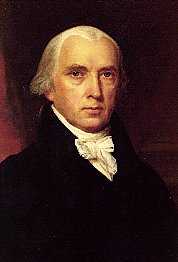
|
| James Madison |
So Madison's committee narrowed the legally enforceable human rights to a handful, selecting only those so self-evident they could withstand the tensions of enforcing them. When contemplating the problem of extending mandated rights to slaves, however, there was no obvious solution at all. That made it easier to limit the Federal Government to enforce a handful of enumerated powers, leaving all unspecified matters to the state legislatures to enforce if they could. The boundary might shift with time, but without saying so, the Bill of Rights kept the Union out of the one main foreseeable problem, of slavery. The unmentioned conflict between universal rights and slavery defaulted to the individual states, or to whomever, but definitely not to the Federal Government.
That tap-dance held together for nearly a century, and then it didn't and we had a Civil War. During all that time, the balance of power was steadily shifting from the confederated states to the centralized federal government, and after the Civil War, it shifted still more. However, the southern confederation may have been defeated, but it was not exactly reconciled, nor were the former slaves exactly equalized. Their current drift toward entitled dependency was particularly unexpected.
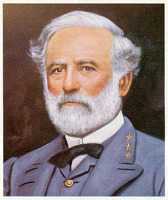
|
| Robert E. Lee |
Many post-war expedients were tested to heal these wounds, some of them useful and some, like forcible Reconstruction, disruptive. Two expedients opened new wounds and distracted the country for a century. The first was the intentional weakening of the quality and effectiveness of state governments, to the point where it can now be asserted that state government is the weakest part of our whole government structure. Those who prized universality and efficiency, or who sought greater international power, regarded state legislatures as a hindrance; just look who got us into a Civil War. Consequently, corruption and ineffectiveness were privately tolerated in state legislatures, because discrediting state governments made them easier to ignore. Repairing the resulting imbalance in our overall system is now growing to be one of our greatest problems. Almost no one remembers this was the price of a ratified Constitution, so increasingly that excuse is futile. In fact, in the thirty-seven more recent states to be admitted to the Union, it is not even accurate.
The second response to a sluggish equalization of racial rights was invented by Madison himself. He felt that the ability to migrate from one state to another would discipline any temptation of a state to misbehave. If your state taxes you unfairly, move. If your state government gets too corrupt, first try to throw the rascals out, but in the last extremity, go somewhere else. This concept has worked magnificently in maintaining national interest rates with appropriate local modifications, and we are about to learn whether it will adequately restrain the half dozen states who have pushed the limits of taxes and borrowing. In the case of former slaves, massive out-migration took a century to happen and then it happened all at once, just after World War II. Wave after wave of slave descendants from the rural South got on buses and came to the heart of Northern cities. Overwhelming the ability of weakened local governments to cope, city institutions disintegrated, particularly the public school and justice systems. The consequence is continuing disarray in Washington DC, Baltimore, Detroit -- and Philadelphia -- together with a host of smaller cities like Reading, Newark, Paterson, Wilkes-Barre, and many others, in all of which the unsustainable wave of immigrants added to local industrial and civic problems which had other causes. So now we have two new problems, weakened state government and disruptive migrations, which in other circumstances tended to mitigate each other, but now increasingly make each other worse. Someone must take hold of the issue that applying Madison's concept of competitive states has created a strong state disincentive to deal with poverty.
It took a century for Madison's scheme to break down into war, and Lyndon Johnson was surely quite right to feel a century was long enough to tolerate the disunity of the Civil War. If he could not make people love one another, at least he could enforce the law. State governments were not doing it, so he whipped the Congress into taking it on as a Federal duty, by passing the Civil Rights Act. Half a century has passed with some progress, but surely not an end to the disunity. State governments have been further weakened, but mass migrations have calmed down. In another half century, the slavery issue and its consequences may fully subside. Meanwhile, the reaction of extending federal power continues, now threatening to extend to the medical profession, the finance industry, the automobile industry, and the Internet. Our Constitution continues to survive more or less intact into its third century, and we grow increasingly wary of tinkering with it as we watch most other nations fail to achieve its essential quality. Which is, it survives. Aside from the Bill of Rights and some technical tweaks, there have only been five amendments of any substance. Meanwhile, new federal statutes and regulations grow by a hundred ponderous volumes a year.
Addressing the Flaws of Republics
EVERYONE might profit from reading Plato on the subject of republics, not to mention reading James Madison. Both The Republic and The Federalist were conjuring republics they proposed, not ones they had experienced. After Madison did get the hands-on experience he had such radical changes of opinion his friend George Washington essentially never spoke to him again. Not only in republics, of course, does reality prove different from founding theory. It might seem more measured to say of republics that two centuries of their reality proves to be such an extension of theory, it effectively departs from it. In essence, the Republican idea is to limit the voters to one periodic review of their representative's term of office overall, not in ongoing picky detail which would hamper him. This definition contrasts republics with democracies and implies the reason to favor republics. The elected representative is given full power to act during his term in office, but must eventually face the voters for accounting at the fixed time for re-election. Plato and Madison were right about extending latitude to one's chosen representative, but they failed to predict how effectively that latitude might be stolen by the legislative body itself and controlled by rules and leadership which skirt ratification by the general public outside their chamber, in any district. The Romans, of course, did know what they were talking about, but history has tended to ascribe Roman difficulties -- assassinations, for example -- to flaws in Roman character rather than in the construction of the Roman Republic. After describing some problems history has revealed about our own system, this essay is written to propose a solution. A second essay follows, to defend that solution.
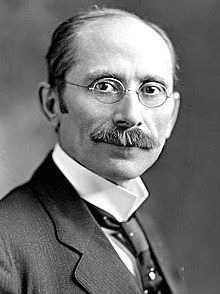
|
| Joseph L Bristow |
The differences between House and Senate in the original U.S. Constitution were three, but since the Seventeenth Amendment in 1913, there are now only two. Originally, Senators were selected by the states they came from, mostly by the legislatures. A century of experience demonstrated the result was cronyism, members of the legislature using senatorial appointments as bargaining chips and for the most part limiting the choice to one of their own members. The provision probably did attract a higher grade of legislator overall, encouraging those primarily ambitious to be U.S. senators to have a try-out in the minor leagues first. It did give the State government serious power to punish a U.S. senator who failed to please the home state. And this selection process made it simpler and cheaper to run for the job as U.S. senator. This feature encouraged candidates with competing for career choices, otherwise discouraged by the expense and unpleasantness of candidacy, to step forward. But by 1913 all this was seen as a way for cronyism to dominate the process, swapping appointments for favors, or even more tangible bribes. From the distance of another century, it can be seen that the steadily declining power of state legislatures was matched by a declining quality of their elected membership, leading to a rising level of sordidness in their foibles. Hapless amateurs were largely supplanted by career politicians. After the Civil War "states rights" stirred up memories of secession and led to a deliberate weakening of the states' role. Whatever the reasoning, the mentality of Progressivism was sweeping the country in 1913, and popular election of senators was deemed a Good Thing, swept into general satisfaction. Doubt about whether it all made as much difference as claimed lies in the reality that from 1913 to 2010, one quarter (182) of all Senators have first arrived in the Senate through appointment by a Governor to fill an unexpired vacancy. Many of these vacancies have of course been contrived for the purpose.
The relative power of a senator and a representative lies in the size of the population who vote for them, and the frequency with which they must endure that unpleasantness. Members of the House are elected for two years and members of the Senate are elected for six; the voting constituency of 100 Senators is generally much larger than that of 532 Representatives, so because the population grows faster than the number of states, the representation discrepancy also grows. The frequency of running for reelection seems to be so irksome that whenever a Senate seat falls vacant, some sitting Congressman from that state is almost certain to try to switch. Of course, it is true that with only a quarter as many senators as congressmen, the power of each vote is weightier. To the extent that committee memberships represent special insider power, a senator does belong to more committees but is more severely stretched to attend them all. Each senator's vote does have a greater scarcity value, but a Representative who tends to business is more likely to know what he is talking about, hence better able to be influential in the committees where most matters are really decided. The limits of merit promotion in both houses of Congress lie in the differing power of various committees, while the favor of appointment remains within the iron control of caucus leadership. In public, senators seem generally more polished and experienced in public persuasion. The persuasion that counts, however, is of gaining the respect of colleagues in your own legislative body, always restrained by the power of leadership to coerce conformity. Public persuasiveness, by contrast, is often little more than glibness, reflecting greater experience with dodging an issue to conceal a lack of depth in it. Almost all senators aspire to the presidency, although few achieve it. No Congressman has been elected President since Warren Harding; indeed, few Congressmen even dare to seek the nomination. The appointment of Gerald Ford was a special situation. However, it is worth pondering that during the early days of the republic, the House of Representatives was considered much more prestigious than the Senate, and that curiosity continues to raise an important question just why it is now reversed.

|
| George Washington |
The differences in prestige between the House and the Senate cannot be ascribed to the comparatively minor differences in their Constitutional definition, the size of their district and the frequency of election. Otherwise, we could immediately improve the quality of congressmen by reducing the limit of their number and frequency of re-election, which scarcely anyone has proposed. The more likely source of the problem can be found in the differing rules of procedure which each body has adopted; and reaffirms at the opening of each term. Various strategies of committee assignment and seniority have adapted to the reality that newly elected politicians rarely have any skills other than the ability to get elected. But almost everyone can learn, given enough time being exposed to a topic. A seniority system can occasionally lead to someone who is hopeless, gradually floating into a position where he can do great harm. Provision must be made for graceful exceptions to the seniority rule, usually by excluding a member from important committees until he has demonstrated some competence, less often by later dropping someone who has age- or alcohol-diminished faculties. Underlying this approach is a contempt bred of experience for the wisdom of the voters, back there in the district, whereas the leaders of the fraternity can protect the nation by judiciously devised rules. Sometimes it is, unfortunately, necessary to be a little hard boiled.
So far so good. When Jefferson and Martin Van Buren invented political parties, the bodies of Congress responded by inventing caucuses. George Washington was not a learned man, but he knew he hated this system. James Madison probably feared political parties more than he hated them, so he incurred Washington's permanent displeasure by getting good at manipulating what he saw as the winning strategy. Van Buren's fate was more ironic; after inventing many of the unpleasant little strategies of modern politics, he was defeated by William Henry Harrison in the "log cabin" election of 1840. Harrison hadn't been born in a log cabin at all, he was born in a Virginia mansion, hee, hee, hee. George Washington wouldn't have chuckled at that one, he would have been livid.
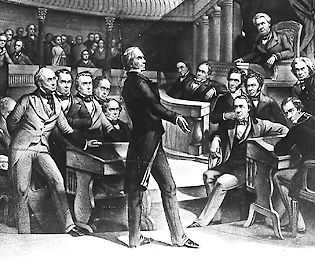
|
| Henry Clay |
Party caucuses have only one central feature, which is vote-swapping. Many of the strategies of this unattractive behavior were outlined in elegant detail by Pliny the Younger, in the Roman Senate, and James Madison the student of government had sought to avoid them. When he decided it was hopeless, he joined them and got good at it. In retrospect, the premier example of vote-swapping was the trade which Madison and Hamilton made, placing the nation's capital in Virginia/Maryland instead of Philadelphia, in return for federally redeeming the Revolutionary debts for all 13 states, when Virginians had already paid theirs off. Philadelphia had essentially nothing to say about it. Pliny had cautioned and subsequent practitioners have followed the advice to cover your tracks by swapping votes for an issue seemingly unrelated to the one in dispute. That's about all there is to vote-swapping, find out what the guy wants badly enough, and trade him something for it. It follows that it's wise to give off the appearance that you don't want much of anything. A corollary is that political caucuses try to conduct even innocent or public-spirited discussions in secret, making public only what is expedient to be made public. And a further corollary: some members of a caucus are from totally "safe" districts. Occasionally their votes can safely be traded for something the opposing party wants but the caucus feels necessary to claim to oppose. When a caucus wants something badly enough to trade it for something else but is three or four votes short, the opposing caucus may trade the four votes from safe districts while violently denouncing the dirty turncoats. All this is known as party loyalty. When things are particularly tough, party loyalty can be enforced by finding out what you want badly and taking it away from you. When these whips are applied to you, a grievance develops. Fine, what do you want to trade in return for vengeance? Many of these refinements seem to come, not from Rome, but from Sicily.
As was stated at the beginning, the purpose of this essay is not to rail at Congressional corruption, but to counteract it to some degree. Since the worst features of this system require secrecy and public duplicity to be effective, the best remedy is sunshine. Not about what Roosevelt did in his third term, but about what your local congressman might do next week, and his fear you will find out. His fear that a blogger will tip off the local newspaper or radio station, encouraging someone else with the ambition to file for election against you. And his fear that when he asks someone for a campaign contribution, that person will bring up the topic in question. His fear that the local political boss will decide he can't win.
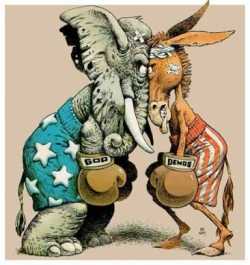
|
| Boxing Politicians |
This was more or less the system which the founding fathers, James Madison chief among them, envisioned for this shining city on a hill. And which two centuries of rather clever schemers have gradually eroded. The highly desirable feature of a republic is that the elected person is free to represent his own interpretation of what is best for his district or, failing that, what is best for the nation. The elected representative is encouraged to risk defeat in the next election, if in his judgment what is good for the district is bad for the nation. But he is not a suicide bomber if his vote will make little difference in the outcome he can be forgiven for taking cover. One would wish that fewer of them would speak one way and vote in the opposite direction, but that can be forgiven if someone back home in the district is keeping score and letting others know of it. The fundamental principle of a republic as distinguished from a pure democracy is that a representative, while free to act during his term in office, remains obliged to face the voters at the appointed time. Our system has come to exaggerate the actual extent of freedom to use judgment because the freedom has been stolen by party leaders through the application of schemes too devious to detail. But freedom is fundamentally a good thing. What has come to be so lacking is the idea of facing an informed electorate in making a choice between you and an informed opponent. The public, it must be feared, doesn't know beans.
And so the proposal for fixing this mess is difficult, but it can be stated simply. The recent economic boom created nearly a thousand billionaires; maybe four hundred would be a number that would escape challenge. If only fifty of them would endow think tanks in all fifty state capitals, and the fifty-first would endow an organization dedicated to making their research available to the public, then perhaps another fifty would be prompted to create a second think tank in each state capital on the opposite political side. Two polarized think tanks in each state capital, just imagine it. As things now stand, it would be a sufficient first step if that happened in only one state, and the rest of the country could watch what happens.
Washington's Circular Letters
ONCE Cornwallis surrendered to Washington at Yorktown in 1781, there emerged the usual reluctance of troops on both sides to get killed for a dispute that was already settled. The British monarchy had ample experience with wars and fully expected to exploit this trait of exhausted soldiers at the end of one. It was clear to the British the colonies could neither be reconciled nor forcibly subdued. What was not clear was how much national advantage might still be extracted from a peace conference. Bluffs and intransigence might still achieve what bayonets could not. Seasoned diplomats are accustomed to such manipulation, but the new American nation only had Benjamin Franklin grown equal to it, representing Pennsylvania and Massachusetts with the British Ministry for several years. Beyond that, however, a particularly American trait was emerging to quit the game before the last card is played. During the Nineteenth century, anticipating and resisting that irresolute temptation came to be called, Character.
The American Revolutionary Army was seldom well-fed, never well armed. Hardly anyone expected a war lasting eight years, or the British regulars to be so mean and effective. Major General Benedict Arnold had seemed like our perfect soldier but turned traitor while in charge of a major defense position at West Point, New York. Conditions for wives and children at home were bad. And the Congress in Philadelphia was willing to inflate the currency, hold back soldiers' pay, pinch pennies on supplies. Other colonies frequently promised to send more soldiers than they actually supplied. Not that they were proud of themselves; they skulked. Surely, some state legislatures and representatives were better than others, but they are almost impossible to identify, now. They all must have been somewhat complicit, or we would have heard more of them denouncing each other. It must have been supremely painful for Washington to receive promises of troops and supplies that he privately doubted, and then to be obliged to assure his troop's help was forthcoming. Inevitable disillusionment discredited him more than the Governors who put him in that position. The British troops surely shared their enemy's reluctance to get killed for a war that was over. They partied and roistered in New York, but who knows what general in London might suddenly order an attack on Washington at Newburgh, just to make overall British defeat seem less humiliating.

|
| Headquarters, Newburgh NY |
During sixteen months of this agony, Washington wrote many letters to state Governors, keeping them informed while asking for their help. The custodians of the Headquarters museum proudly show the various tables and chairs for his aides to translate French and Spanish, to make thirteen copies of just about everything, and careful files of all correspondence. Washington was an organized person, they say, or else his chief of staff was organized. Someone like Alexander Hamilton, perhaps. Out of all this headquarters communication system gradually emerged the system of Circulars. The General was in a position to see huge deficiencies in the government system for which he dedicated his life, and apparently grew haunted by the idea that all this suffering would be for nothing if the government which emerged was anything like what he was now seeing. His Circulars to the governors began to take on the style of outlining what kind of government the United States ought to have. It must, for example, acquire federal power; the states must turn over more of their own power to the decisions of a single executive. It must pay its debts; a mighty nation does not chisel its creditors. It must suppress the inclination to squabble and think the worst of one another. It must, in his phrase, be virtuous.
Two emphatic views of the new country emerged from Washington's time in Newburgh. The inability of the government to pay its soldiers, suffering or no suffering, was particularly agonizing. And the close call he had with threatened mutiny made it much worse. Robert Morris had run out of tricks and instructed him the central issue was for the Federal government to be able to levy taxes for servicing the debt, which would make it possible to borrow still more through leverage. Washington never forgot this episode, and at several points, during his later presidency, it guided him well. The other episode which made a lasting impression was to some degree his own fault. He was so impassioned in his hatred of monarchy that his closest friends, Hamilton and the two Morrises -- who had never seen much to criticize in a monarchy -- essentially gave up on trying to persuade him, and took the side of General Gates the hero of Saratoga in a planned mutiny. Washington put it down with nothing but the power of his personality and a little play-acting with his bifocals, but he almost lost the confrontation in an instant. Washington had many close calls with death on the battlefield, but these two near-defeats pretty much shaped the rest of his life as our first President. Indeed these two hatreds, of debt and monarchy, continue to characterize many Americans to a degree that others would describe as unreasonable.
And then he made a mistake. As a way of proving his lack of personal motive, he announced in advance he would be leaving public service forever. Today, every lame duck knows that's a bad idea, even when you mean it. And while he may have sincerely thought he meant it at the time, events show he really didn't. Although he probably didn't want to be indispensable, circumstances made him so. He discovered how little he knew of the technical details of government, and thus how much he needed James Madison's help. Washington lacked skill in managing finance; having depended on Robert Morris throughout the war, he needed Alexander Hamilton at least to handle a peaceful economy. But there was no running away from the central issue; he would be forced to recognize how much he overshadowed anyone else in demeanor, and so, how unlikely it was that anyone else could bully others into cooperating. He was a great-souled person, in Aristotle's phrase. Franklin alone perhaps understood and privately doubted that even Washington could pull it off. Washington's Circulars were driving him straight toward seeking the Presidency he widely proclaimed he did not want and would not accept. And thereby he threatened the one thing in life he prized more than any other: his word of honor to keep his promises.
Regulation Precision: Not Entirely a Good Idea
Anatomy of an Urban Political Machine

|
| One Big Family |
The Franklin Inn Club meets every Monday morning to discuss the news, and recently it discussed the upcoming local political campaign. The discussion went on for fifteen minutes before a newcomer asked if we were talking about the primary or the general election. The question was met with broad smiles all around because of course, we were talking about the primary. Voter registration is 6:1 in favor of the Democrats in Philadelphia, so the general election is just a required formality. The election, that is, consists only of the Democrat primary; election of the Democrat nominee in the general election is a foregone conclusion. Someone idly remarked on the number of politicians who are blood relatives of other politicians, someone else said that was true of union officers, too. So, skipping from the inside baseball of the election, we took a little time to discuss the anatomy of an urban political machine.
The first step in consolidating control of a city by a political machine is to eliminate the issue of the general election by making the other party's chances seem hopeless. That converts an election which typically turns out 40% of the voters into an exclusively primary election, turning out 20% of the voters, or even less in an off-year. In some "safe" districts a winner needs far less than 10% of the eligible voters to win.
The second step is to run as a prominent member of a local ethnic or religious group, preferably the largest of such groups within the district. If possible, an election is almost assured by being the sole candidate associated with the largest ethnic group. Here's where family connections work for you. If your father held the same seat, or some other family member had been prominent in the district, it helps assure everybody that you are really an ethnic member and not just someone whose name sounds as though it would be. Your relative will know who is important in locally local politics, the members of large families or people are known to be the "go-to guy".
Assembling all that, the final step is to get everyone else who is a member of the ethnic group to drop out of the primary, and to encourage other ethnic groups to field as many candidates as possible, splitting up their vote. Getting other members of your religious group to drop out, consists of having your relative approach them and tell them to wait their turn. The implicit promise underneath that advice is probably next to worthless, unless it is specific and witnessed, and the other fellow's ability to deliver it is credible. If all else fails, the resistant opponent is muscled in some way, verbally at first, and then increasingly threatening. The consequence of this ethnic/religious influence is more involvement in government by clergy than is healthy for either one of them. Now, that's about all there is to achieving permanent incumbency, but the minority party should be mentioned, as well as the flow of money.
It quite often happens that the minority party in the big city, hopeless in its own election chances, finds itself with a Governor and/or Legislature of their party. The patronage of state jobs becomes available to the foot soldiers who have no chance of local election. Much of the wrangling within state legislatures revolves around whether appointive patronage jobs should be lodged in state agencies, or local ones; at the moment, the Parking Authority and the Port Authorities figure prominently as jobs for which a local Republican could aspire. The coin of this trade is maintaining influence in the state nominating process and paying off with increased voter turn-out in elections which have no local effect but may be important at the state or national level. Since party dominance at state and national levels changes frequently, the local machine finds it useful to continue this system. Where they have nothing to lose in local elections, they may even encourage it.
Money is the mother's milk of politics. Except for safe districts no one can get elected without it. And various degrees of corruption provide money to be "spread around" the clubhouse, sometimes to induce people to drop out of primary races, sometimes to console "sacrifice" candidates who run hopeless campaigns just to make the party look good, and sometimes just to enrich the undeserving. The politically connected parts of the legal profession participate a good deal in the flow of funds, sometimes in order to get government legal work, sometimes to obtain judgeships, sometimes to launder the money for clients. One particularly lurid story circulates that professional sports teams are expected to make seven-figure contributions in return for lavish new stadium construction, from which they, in turn, are able to generate various sorts of compensating revenue.
But, as the old story goes, if you eat lunch with a tiger, the tiger eats last.
Constitutional Liberty
WITH British troops in the process of disembarking at New Brunswick, apparently intent on hanging rebels, Robert Morris and John Dickinson annoyed everybody by refusing to sign the Declaration of Independence. Both were fully engaged in the Revolution after the fighting finally got started, and Morris signed up in August 1776. Dickinson had some further reasons of his own, but Morris explained his position quite succinctly. He didn't mind being a British subject, he didn't want a new King, what he wanted was Constitutional Liberty. There is no record of his being directly confronted about this later, and thus no detailed explanation. But whatever did he mean?
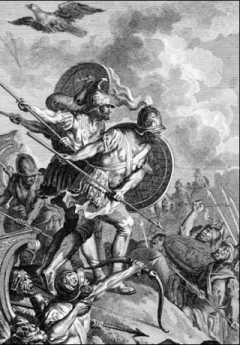
|
| Iliad and the Odyssey |
Morris was of course very bright, even brilliant as a businessman. He had an astonishing memory for detail and was capable of holding his own counsel. He was a person of great daring and prodigious amounts of work. But there is very little evidence that he thought it was useful to be mysterious, or deep. So why not take him at his word, which was essentially that what mattered in a government was whether it kept its promises and allowed its citizens all possible Liberty. It did not matter whether the government had a king, or seldom mattered much who that king was. What mattered was whether it kept its promises, and for that a Constitution is useful. There is no great pleasure in being capricious and arbitrary, so a king who leaves the citizens alone is mostly the best you can ask for. It does, however, help considerably if the rules are fair, clear, and binding. Beyond that, it is unwise to go about toppling governments in the vain hope that a new one is somehow better than the old one. This is putting words into his mouth, to be sure. What he did say was he saw no advantage to getting a new government when what we wanted was Constitutional Liberty. Eleven years later, he was a personal friend of just about everyone with the power to design a new government. Washington lived in his house, or in one next door. Ben Franklin was a business partner. Gouverneur Morris was his lawyer and partner. Just about everybody else who mattered was meeting with him in secrecy for months at a time, in the Pennsylvania Statehouse. And so on.
An essential part of this puzzle of Morris' role could be that the American Constitution was very close to unique in being written out as a document, like a commercial contract. The British Constitution was unwritten at the time and continues to be unwritten today. Many other members of the British Commonwealth operate without a written constitution. And in fact, what passed as constitutions for thousands of years have been unwritten; it was the written American one which was the novelty, not the other way around. It may stretch matters a little to describe the Iliad and the Odyssey as constitutions, but they do in fact describe the system of governance of the Ancient Greeks, clarifying many axioms of their culture for which they were willing to fight and die. We are able to understand the rules for Greeks to live by from reading Homer, almost surely better than we understand the rules of American culture by reading The Federalist Papers. Modern students of geometry, for another example, are taught that all the rules of Euclidian geometry are based on a few axioms stated at its beginning. Change one of those axioms, and you make mathematics unrecognizable. Even Newton's Principia are now seen by mathematicians to be rules which apply only to our universe for certain. There may exist many other universes to which they do not apply. Axioms are themselves mostly regarded as unprovable assumptions. A Constitution, therefore, is regarded in modern times to be much the same thing as a set of mathematical axioms. With one new exception: they are written out on a piece of paper for all to see and agree to -- just like a commercial contract. It would not be surprising to discover that America's great merchant trader, Robert Morris, was horrified at the idea of depending on Vestal Virgins or Judges, or Kings, for their recollection of what the contract says. It, therefore, seems quite natural for a maritime merchant to be agitated by having the rules of British society depend on what King George III chose to emphasize or ignore. Write it down, negotiate it, then tell us what you want so we can agree to it; that's a proper way to define Constitutional Liberty and limit disputes. International maritime trade could not be conducted in any other way, because sea captains who feel abused in a foreign port can abruptly up-anchor and sail away, never to return to that port again until or unless local rules are clarified.
Unless someone discovers some relevant documents in a trunk in the attic, that's about the best conjecture to be made about the American novelty of a written constitution, and its transformative effect on the legal system of all other nations which have one. It would still be nice to know, for certain, whose idea it was.
Robert Morris: Businessman Father of the Bureaucracy
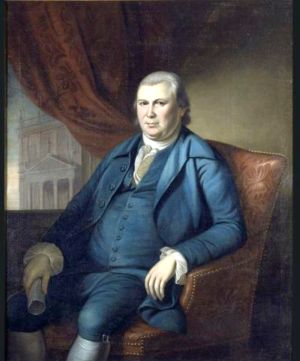
|
| Robert Morris |
UNDER the Articles of Confederation, America had a President who presided, but there was no executive branch for him to do anything administrative. The day to day business of the nation was conducted by committees of Congress, who mainly contracted out the actual work. Evidently, Robert Morris, the businessman had observed this system with displeasure, because it only took him a few days to replace it with departmental employees, reporting to him. The affairs of the nation were evidently in such disarray that there is scarcely any recorded resistance to this astonishing re-arrangement, probably viewed as only one of a series of brisk actions by this foremost businessman of the nation, acting in an emergency and to some extent using his own money. Furthermore, the immediate administrative improvement was apparently so obvious to everyone that the system continued after Morris left office, and was absorbed into the 1787 Constitution without much-recorded debate. Without dissent, as we say, the bureaucracy had been created. As the press of business steadily increased the bureaucracy, from a handful of employees to many millions of them, the fourth branch of government was created without any Constitutional mission statement, not one single word. Following directions set by early America's preeminent no-nonsense businessman, control of the bureaucracy was placed within the Executive branch, in time largely located within the District of Columbia, and governed by rules made by the Civil Service Commission. Sometimes this fourth and largest branch of government skirts dangerously close to encouraging insubordination to their politically appointed superiors.
For some reason, the State Department is particularly suspected of such "Yes, Minister" behavior. Increasingly, government subcontractors are relied upon ("privatization"), as the growth of public sector workforces a return to the subcontractor approach of two centuries earlier; such subcontractors increasingly find the bureaucracy assumes the role of the second Board of Directors. And for the same reason as before: the work of the central government keeps increasing. At a state and local level, an uncomfortable amount of political funding can be traced to utilities and other corporations who have been awarded legal monopolies, uncomfortably like the mercantilism which our colonist ancestors had found so repugnant to deal with. In the 21st Century, we are finally approaching the point where we can foresee the number of people working for some level of government becoming greater than the number of voting citizens, and therefore able to control their income and the nature of their work. When the bureaucracy begins to exert political election power over its elected superiors, elected politicians are almost certain to rebel at what they will surely see as going a step too far. However, on the topic of salary and work environment, they are likely to become allies. Public discontent is already echoed in the growing political movement to limit or shrink the size of government; it would be well to examine and pilot test alternative options before this one gets us into trouble.
In retrospect, this was one of many features of creating the three branches of government where broader implications went unnoticed in 1787. The British government had three branches, King, Parliament, and Judiciary. To create a government consisting of a President, a Congress, and a Judiciary did not then seem like much of a departure. However, the Revolution deposed the King and made the people sovereign. When the real implications of that breezy slogan had to be translated into legislative language serious implications emerged, unexpected then, and now hard to change.
Reconsidering All Our Laws

|
| Common Law |
A KING who conquers a new country theoretically gains the chance to revise all its laws. However, thousands of years of experience demonstrate that those who are good at wielding the sword seldom have much interest in, or aptitude for, devising a legal code. Napoleon seems to have been an exception, and Alexander the Great was tutored by Aristotle, but most conquerers have been illiterate in the law. Therefore, earlier conquerors merely extended their native laws into additional territory or else left the whole business to a permanent priesthood of judges. In this way, an independent judiciary could survive unless, like Thomas a Becket or Thomas More, it grew stubborn about thwarting the wishes of the King. The concept of citizen rights more or less defined feasible limits to what the King was allowed to do. British law went still further, distinguishing between rights of the people and rights of the sovereign. It identified those few things even a King was not allowed to do, as well as those many things he alone must be able to do in order to govern. The latter were collectively called the King's Prerogative. Today, we would call it a job description.
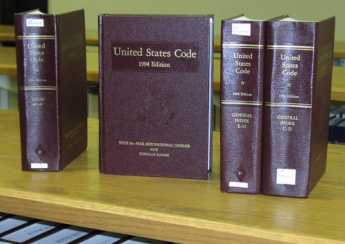
|
| U.S. Codes |
Along those lines, the English Civil War had been fought, briefly transferring the power of Prerogative to Parliament, and incidentally clarifying some disadvantages of doing so. Americans, after fighting an eight-year Revolutionary War to be rid of a particular king, had developed a sentiment for eliminating all kings entirely. However, the memory of the English Civil War and subsequent abuses by the Cromwell Parliament restrained that impulse. The alternative idea grew of transferring sovereignty to the people, to be translated into action by their elected representatives in the Legislative branch. Although such sovereignty would be unlimited, the intermediate steps taken by the Legislature could be deliberately slowed down, and particularly worrisome actions might be tangled up in complicated steps of legal process by a vocal minority. Such a complicated system required an umpire, which Chief Justice John Marshall eventually positioned the Supreme Court to be. Conducting elections every two years was a simple way to allow the people to restrain its agents from the misbehavior of a more general sort. Since George Washington was confidently expected to be the first President, it was left to him to devise protections against presidential abuse, since he had notoriously and repeatedly expressed his intense dislike of kings. In modern times this system of checks and balances has only been severely tested once, in 1937. Immediately after winning a landslide re-election in 1936, Franklin Roosevelt nevertheless was slapped down hard by public outcry forcing Congress to thwart his Supreme Court-packing scheme.
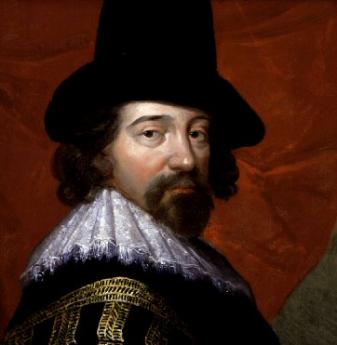
|
| Sir Francis Bacon |
Such subtle, complicated ideas cannot be implemented by writing 6000 words on a piece of paper, and they certainly cannot withstand two hundred fifty years of subsequent nit-picking by dissenters, no matter how carefully crafted the 6000 words may have been. The complexity of the political system it describes would long ago have fallen apart without a million little accommodations and revisions, just as every other nation's constitution has done during that same period of time. And that fine-tuning process was made possible by starting with a more or less blank slate, with thousands of lawyers and legislators debating every particle of common law for more than a century. In 1787 it was decided to adopt English common law as a default position, and to invite a host of legislative bodies to debate and replace any part of it with a "statute". It was a laborious process. Measured by pages of law books, the volume of statutes only grew to equal the volume of common law by the time of the Civil War. The English common law was certainly a good place to start, having been created by Sir Francis Bacon two hundred years earlier as the legal equivalent of the Scientific Method; based on real, adversarial contested case decisions, a hypothesis was created, then tested, revised, and tested again. By actual count, one state legislature only enacted three statutes in the year before the Constitution was ratified; all its other activity was concerned with adjudicating disputes within the boundaries of the existing common law. But when the Constitution suddenly rearranged the balances of power in 1787, almost every sentence of common law had to be regarded as potentially requiring modification to reflect the new Constitutional rearrangements. During the first half century there existed great enthusiasm for almost all of the new Constitution except those parts which affected slavery, the fine-tuning was almost universally intended to strengthen it or repair some oversight. If it failed in some way, adversaries were quick to point out the flaws. In short, every lawyer in the nation was involved to some degree for a century in the process of re-writing the English common law for American purposes, in American circumstances, for the grander purpose of strengthening the American commonwealth.
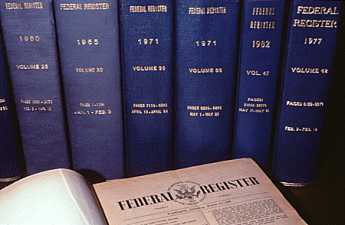
|
| Federal Registry |
And everyone knows what happened next. The state legislatures who considered it normal to pass fewer than a dozen laws in a year started passing fifteen hundred in a year and kept it up for many years. Today, almost every state legislature considers more than a thousand bills and passes two or three hundred. Since the colonial legislatures passed few laws and spent most of its time adjudicating disputes about existing law, the character of the law changed as it gradually gave up adjudicating, stopped being like a court. The tendency of early law was to state principles to guide the judges. In recent times, our over-lawyered system specifies all imaginable conditions and exceptions in excruciating detail, so that our laws tend less and less to speak of "reasonable amounts" and more and more to define drunken driving, for example, in milligrams per deciliter of the defendant's blood. We have better measuring devices, so we measure. But who can deny that a legislature accustomed to making judgments itself, will more confidently rely upon the good judgment of courts, than a legislature which spends its time going to committee meetings to consider the testimony of experts, often never visiting a courtroom?
Our lawyers, who once enlisted the efforts of the entire profession for a century into refining the English common law into the American statutory law, are to be encouraged to extend equal effort into the process of turning off the faucet. Or possibly, having done such a good job at this assignment, seek another line of work?
Corporations: Property, but also Immortal Persons

|
| Proprietor House |
The Proprietorship of West Jersey is the oldest stockholder corporation in America. Devised by William Penn it has been doing business in Burlington, New Jersey since 1676. The Proprietorship of East Jersey may possibly have been created slightly earlier by William Penn, but recently dissolved itself, thus leaving a clear path for West Jersey to claim to be the oldest. For a hundred years before 1776, corporations were devised by the King through royal charters, and for a century after 1776, most state legislatures passed individual laws to create each corporation, one by one. Consequently, there were a great many variations in the powers and scope of older corporations, with a heavy emphasis on the purpose to which the business was limited. Eventually, so many corporations were created that a body of law called the Uniform Law of Corporations simplified the task of incorporation for the legislatures. The Proprietorships of East and West Jersey would now probably be described as real estate investment trusts (REIT), but the Uniform laws now tend to diminish the emphasis on corporate purpose. It is now common to have a corporation proclaim the ability "to do whatever it is legal to do."
Many voices have been raised in opposition to corporations, largely claiming unfairness for a large and established corporation to compete with newcomers, especially small newcomers striving for the same line of business. Because of its immortality, a stockholder corporation can achieve dominance no individual could hope for, while because of its multi-stockholder ownership, it can generally raise larger amounts of capital. Moreover, because of its size and durability, a corporation can become more efficient and offer the public lower prices and higher quality. As much as anything else, a corporation can generally hire more employees and pay them higher wages; as even the unions admit, corporations create jobs, jobs, jobs. No doubt, state legislatures are attracted by the tax revenue derived from major corporations, but the quickest way to stimulate the economy has repeatedly been found to grow out of lowering corporate taxes. Since there is scarcely any purpose of creating a for-profit corporation unless it eventually pays its stockholders some kind of dividend, all corporation taxes have the handicap of double-taxation for a fixed amount of business. The Republic of Ireland recently lowered its corporate tax rate severely and triggered so much new corporate activity that it inflated and destabilized its whole economy. The result was a dangerous economic crisis, but politicians privately and world-wide silently derived only one real conclusion: lower your corporate taxes if you are looking to stimulate jobs, jobs, jobs.
The corporate model of business thus looks pretty safe, in spite of envious criticism, and is what most people mean when they speak of capitalism. The Constitution had the intention of extracting Interstate Commerce for the Federal Government and leaving the regulation of every other business to state legislatures. The Roosevelt Supreme Court-Packing dispute of 1936 twisted the meaning of Interstate Commerce to mean almost all commerce, but Congress wasted no time specifically exempting the "Business of Insurance" from federal regulation and returning it to the state legislatures in the 1945 McCarran-Fergusson Act. Although the matter remains one of some dispute, it is roughly correct to say that all commerce is federally regulated, except insurance. The corporation is nevertheless usually a creation of some legislature, and legislators have wide latitude in regulating them. To illustrate, in the early days of a banking corporation, the Bank of Hartford was delayed in receiving incorporation by the strong legislative suggestion that a closed stockholder list would result in refusal to incorporate them, whereas opening up the list to new stockholders might result in rapid approval. The implication was strong: the legislators wanted some cheap or free stock as a condition of incorporation. The following year, 250 banks were incorporated, and the year after that, over 400 more. Making of incorporation applicants by politicians was sharpened to a fine point in Pennsylvania in the late 19th Century, when legislatures accorded monopoly status to public utility corporations, withholding it from competitors. It is now a textbook statement that the funding of substantially all municipal political machines is derived from voluntary contributions by utilities with politically granted monopolies, who are consequently indifferent to the retail prices of their products.
So there is still room for public concern and vigilance, and both the courts and the Constitution protect but restrain corporations. In the early 19th Century when public opinion was becoming firmer about incorporation, it was contended they should be treated as persons, possibly resembling real persons more closely by imposing a finite life span on their charters. Although corporation entities are still to some degree treated like individuals, the legal doctrine prevailed that they are in fact contracts between the state and the stockholders. The paradox is thus defended that although legislatures can create corporations, they cannot dissolve them! After all, a contract is an agreement between two parties, and it requires both parties to agree to dissolve the agreement. And then, the final uncertainty was removed by John Marshall. The U.S. Supreme Court in the Dartmouth College case applied Article I, section 10 of the Constitution. That section provides that state governments may not pass any law impairing the obligation of contracts. The Supreme Court decision written by Marshall made it clear that this provision of Constitution eliminated any distinctiveness between a contract involving a state and a contract involving two citizens. There had been a growing feeling that private property was not to be disturbed by state power, and this linkage to Article 1 affirmed that point and finally settled matters. Shares of company stock were property, protected from state legislatures as belonging to the owner and not to the state in any sense. All the while that this quality of the property was established, certain features of the corporation as a person endured. Most of the attention to this point arose after the Civil War when the mixture of concepts ( a slave was a person who was also private property) more or less applied to the institution of slavery as well. More recently, potential muddles have been created by limiting campaign contributions of corporations, thus impairing their right to free speech in the role of a person. It even appears to be true that some of the 1886 precedents were created by an error of a court reporter. The dominant precedent in operation here would appear to a layman as, "If it ain't broke, don't fix it." Additional centuries including a Civil War thus encrusted conditions and traditions onto the hybrid idea of a corporation which now allows it to stand on its own feet, more or less free at last.
The legal profession can certainly be congratulated for constructing two institutions which include the majority of working Americans -- the corporation and the civil service -- without the slightest mention of either one in the Constitution. Although everything seems to be reasonably comfortable, and no one is actively proposing substitutes, it is uncomfortable to hear so much dissension about the original intent of the Framers, when so much of American Law traces its history to events and institutions which the Framers never imagined. Constitutional Law, both within and without original intent, will soon be dwarfed in effect by non-constitutional accretions to it. Sooner or later, the advocates of some undefined cause could find it in their interest to challenge the Judicial system for what has been allowed to happen. Expediency has triumphed. We started with nothing but the common law (defined as law created by judicial decision), and we are slowly returning to that condition under a different name, misleadingly called statutes.
The Third Pennamite War (1778-1784)
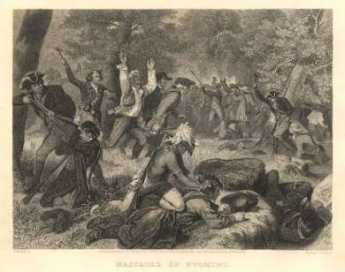
|
| Wyoming massacre |
And so, after the Revolution was finally over, there was a third war between Pennsylvanians and the Connecticut born settlers of the Wyoming Valley. This time, the disputes were focused on, not the land grants of King Charles but the 1771 land sales by Penn family, most of which conflicted with land sales to the Connecticut settlers by the Susquehanna Company. The Connecticut settlers felt they had paid for the land in good faith and had certainly suffered to defend it against the common enemy. The Pennsylvanians were composed of speculators (mostly in Philadelphia) and settlers (mostly Scotch-Irish from Lancaster County). Between them, these two groups easily controlled the votes in the Pennsylvania Assembly, leading to some outrageous political behavior which conferred legal justification on disgraceful vigilante behavior. For example, once the American Revolution was finally over (1783) the Decision of Trenton had given clear control to Pennsylvania, so its Assembly appointed two ruffians named Patterson and Armstrong to be commissioners in the Wyoming Valley. These two promptly gave the settlers six months to leave the land, and using a slight show of resistance as sufficient pretext, burned the buildings and scattered the inhabitants, killing a number of them. One of the weaknesses of the Articles of Confederation was thus promptly demonstrated, as well as the ensuing importance of a little-understood provision of the new (1787) Constitution . No state may now interfere in the provisions of private contracts. Those with nostalgia for states rights must overcome a heavy burden of history about what state legislatures were capable of doing in this and similar matters, in the days before the federal government was empowered to stop it.
A flood soon wiped out most of the landmarks in the Wyoming Valley, and it had to be resurveyed. Patterson, whose official letters to the Assembly denounced the Connecticut settlers as bandits, perjurers, ruffians, and a despicable herd, boasted that he had restored, to what he called his constituents, "the chief part of all the lands". The scattered settlers nevertheless began to trickle back to the Valley, and Patterson had several of them whipped with ramrods. As the settlers became more numerous, Armstrong marched a small army up from Lancaster. He pledged to the settlers on his honor as a gentleman that if both sides disarmed, he would restore order. As soon as the Connecticut group had surrendered their weapons, they were imprisoned; Patterson's soldiers were not disarmed at all and assisted the process of marching the Connecticut settlers, chained together, to prison in Easton and Sunbury. To its everlasting credit, the decent element of Pennsylvania was incensed by this disgraceful behavior; the prisoners somehow mysteriously were allowed to escape, and the Assembly was cowed by the general outrage into recalling Patterson and Armstrong. Finally, the indignation spread to New York and Massachusetts, where a strong movement developed to carve out a new state in Pennsylvania's Northeast, to put a stop to dissension which threatened the unity of the whole nation. That was a credible threat, and the Pennsylvania Assembly appeared to back down, giving titles to the settlers in what was called the "Confirming Act of 1787". Unfortunately, in what has since become almost a tradition in the Pennsylvania legislature, the law was intentionally unconstitutional. Among other things, it gave some settlers land in compensation that belonged to other settlers, violating the provision in the new Constitution against "private takings", once again displaying the superiority of the Constitution over the Articles of Confederation. It is quite clear that the legislators knew very well that after a protracted period of litigation, the courts would eventually strike this provision down, so it was safe to offer it as a compromise and take credit for being reasonable.
It is useful to remember that the Pennsylvania legislature and the Founding Fathers were meeting in the same building at 6th and Chestnut Streets, sometimes at the same moment. Books really need to be written to dramatize the contrast between the motivations and behavior of the sly, duplicitous Assembly, and the other group of men living in nearby rooming houses who had pledged their lives and sacred honor to establish and preserve democracy. To remember this curious contrast is to help understand Benjamin Franklin's disdainful remarks about parliaments and legislatures in general, not merely this one of which he had once been Majority Leader. The deliberations of the Constitutional Convention were kept a secret, allowing Franklin the latitude to point out the serious weaknesses of real-life parliamentary process, and supplying hideous examples, just next door, of what he was talking about.
How Could We Improve State Legislatures?
NEARLY every student of government agrees, the state government is the weakest part of the American system. Almost every academic or federal congressman, at least, seems to hold that belief, while almost any lawyer would prefer to have his case in Federal court rather than before a state judge. Although the followers of Thomas Jefferson kept the nation in an uproar for forty years pursuing his notion of government identical with the will of the people, the public opinion he prized nevertheless remains scornful of state government. Such scorn by itself can undermine legislative quality, creating a destructive cycle.

|
| Small Town |
Students of government point to instability and unpredictability as main features of concern about state government. The legal profession values a central principle, called stare decisis: Leave the Law Alone. Stability, or order is desired so highly that dictatorship, corruption, and poverty may be tolerated in order to achieve it. Conversely, an inability to predict what is coming next is highly destabilizing, a sign of amateurism at the controls. Any decision is better than no decision, even a bad decision is better than no decision. The public hesitates to act in the face of indecisive governance, and dynamism drains from the environment. Most of the time it doesn't make much difference what a rule says as long as it is emphatic and prompt. And it's usually the case that bad decisions are quickly reversed. Test it yourself: how much difference does it make whether a one-way street runs East or West? But it would make a considerable difference if almost any street changed Eastward to Westward to Eastward again, several times capriciously. Suppose someone did make a bad mistake: Eastward to Westward and back to Eastward again. Everyone can now see that Westward was a dumb idea, you bonehead. It will be a very long time before anyone tries that, again.
A second general characteristic of state government is the location in a small remote town. The capital of Michigan is in Lansing, not Detroit. In New York, it is in Albany, not New York City, and in Pennsylvania, it moved from Philadelphia to Harrisburg. Even in little Delaware, it is in Dover, in Maryland, it is in Annapolis rather than Baltimore. And so through most of the fifty states, we see the same pattern. No doubt it could be argued: getting away from big-city bosses and political machines is positive, and stretching a network of highways through the open countryside to the new capital is a source of real estate development for the state. But it definitely creates weakness of the governing system to locate it in towns that have little newspaper coverage, no think tanks, few universities, and even poor airports, school systems, museums, and civil society. These are generally one-industry towns, where the children of the bureaucracy all go to school with each other, along with the offspring of lobbyists. Voices in the past have been raised against the development of a ruling class, as might have been seen in Potsdam outside of Berlin and similar political suburbs. But we have just as surely developed a bureaucratic subclass in Bethesda, Maryland and Alexandria, Virginia. No doubt there are many other similar clusters, in other states. Where the children of bureaucrats are clustered in the schools near the Washington Post and the National Journal it can be argued they know the inside game of politics, as well as the children of Boston, know the inside baseball of the Red Sox, and there is a certain value to developing such a political artisan class. But in the vast majority of the country, the dominant problem is that the voters of the state have not the faintest idea of how their state government is functioning. The children of bureaucrats may still learn at the dinner table how to adopt "Yes, Minister" behavior or how to find lifetime bureaucratic jobs with accidentally high fringe benefits. The big flaw is the rest of the state does not realize the smallest part of how prevalent such behavior is in the capital. If the politician who is caught in a scandal is largely unknown to the general public, it is an advantage to the political class. With less notoriety, there is less scandal, possibly even lighter punishment from judges he has been involved in appointing. Rising above this sort of sorry behavior, the quality of legislation is surely diminished when there is diminished fame for doing a good job, diminished scorn for incompetence.
To a certain extent, this pressure for mediocrity is augmented by the reduced importance of the subject material. The federal government is involved in foreign policy and monetary issues Constitutionally forbidden to the state legislature. Even at the bottom of the hierarchy of public notice, the activities of mayors and city councils have a more direct effect of the lives of the local voter than state government does, with importance shaved off at both the top and the bottom. Such activities really can possibly afford to be relegated to some rural small town with nothing to do except play poker and drink in the bar of the local hotel; it's a question which is a cause, which is the effect. The Constitution provides that the Federal government shall be limited to a dozen specified activities, while everything else is governed by the states. Unfortunately, two hundred years of chipping away at the wall separating two governments of limited powers have left the states with little scope to govern anything substantive except the insurance industry. That does not prevent most state governments from considering more than two thousand bills a session, but these are matters of little import, boring, boring.

|
| Big City |
The Progressive Movement of the early Twentieth century saw much the same problems, being handled by much the same sort of people; but they over-reacted to it. Like most reform movements, the Progressives wanted to make a big splash and then go home. A century later, it is difficult to assess how outrageously corrupt the Senatorial process may or may not have been at that time in the past. Somehow, the public became convinced the U.S. Senate was a terribly rotten organization because of the terribly rotten selection system for U.S. Senators. Consequently, the Seventeenth Amendment passed with little fanfare, taking the selection process away from "the states" and giving it to a statewide popular election. In states with large urban political machines, this change meant giving the nominating process to big-city bosses, taking it away from the legislatures. That is definitely a distinction without much difference. Most big-city political bosses are content to select obedient hacks for nomination to the legislature, but this is the source of most rotten boroughs, gerrymandering, corruption, and mediocrity. In the areas of rural machine politics, the boss himself is more commonly attracted to the appointive legislative jobs. In New Jersey, the election law prohibits more than small campaign contributions to legislators but permits unlimited contributions to the county boss. Either way, the progressive reform of 1913 has not had much progressive effect. One thing is very certain. When the method of selection of the state's U.S. Senator is left to the legislature, the resulting Senator is pretty certain to be a current member of the Legislature. And in the instant you aspire to be U.S. Senator, it becomes very clear you will greatly enhance your chances if you first run for the legislature. There were once likely to be half a dozen senatorial aspirants within the Legislature at any one time, so there was an appreciable improvement in the quality of the Legislatures. True, there was probably more grand-standing and maybe even vote-swapping in return for assistance on the Senatorial seat selection. But there was also much more attention paid in return to the state's interests, by the U.S. Senate. The state's voice on the national scene was considerably louder. The value of a legislative seat and the later experience it provided were much enhanced by possessing the power of selecting a U.S. Senator.
A measured assessment of the effects of the Seventeenth Amendment is long overdue. My own view is that ripping the selection process away from the state legislatures and substituting a second popularly elected national legislative house, was both an over-reaction and a careless gesture without much improvement. Because vested interests have been created, it is now nearly useless to ask the present Congress to study the matter. We have to hope that some rich private citizen will see the need for a serious study of these issues, and both fund the effort as well as leave it alone. If it gets captured by ideologues, it will require a second study, or maybe even a third.
And finally, we get to Earl Warren. former governor of California, and President Eisenhower's choice for Chief Justice of the Supreme Court of the United States. Eisenhower later once referred to the appointment as the worst decision he ever made. Two decisions are said to have been his pets: Baker v. Carr and Reynolds v. Sims. Prior to these two decisions, it was really only possible to gerrymander Congress and the fifty state Legislatures. The U.S. Senate and the various state Senates were elected by geographic boundaries, and couldn't be gerrymandered. Tracing back to a corridor conversation between John Dickinson and James Madison, Dickinson had caucused with the other small states and was in a position to block almost any Constitutional Provision at the Convention. He used words to the effect of, "Do you want a Constitution, or don't you?" and went on to describe his total unwillingness to allow big states to dominate small ones. Out of this, Ben Franklin cobbled a compromise of a two-house Legislative Branch. To pass, any legislation would require the approval of both houses. The House of Representatives would have proportional representation, while in the Senate each state would have two senators, regardless of its population. Eventually, almost every state Legislative branch followed this pattern, although it was not a provision of the Constitution.
The hidden dissention in 1789 was over slavery, but Dickinson was a shrewd and experienced lawyer. He knew human nature, and the best example of the power of his insight has later emerged as California has become the largest state. Every new insurance design first seeks to conform to California laws, because it's expensive to launch a new project, and you might as well assure yourself of conforming to the rules of the largest market, first. The smallest state, Delaware, was not about to be pushed around like that, even on many unrelated issues. But centuries later, Earl Warren had learned the same lesson in reverse and lunged for it when he became Chief Justice. Using the argument of "equal justice", he forced 49 state Senates to adopt proportional representation, just like the other house in their branch. New Jersey, which I know best, is typical in being forced by this decision to change its Senate from one vote per county to voting by population. The subtlety was that both houses of state legislatures became dominated by big-city machines and hence were capable of being gerrymandered. They thus gained control of the nomination process, and gerrymandering nation-wide has assumed the posture of machine politics dominating the selection of candidates. It's certainly true that in the Pennsylvania legislative process, you can regularly observe party hacks drive up, and vote on the floor in accordance with a little card which the "leadership" hands them as they step on the floor. The beauty part of this is that decades later, most citizens haven't a clue what had happened.
Two Friends Create the Articles of Confederation
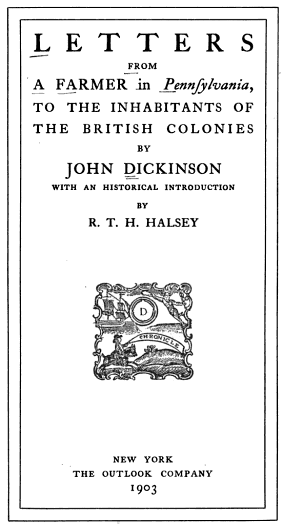
|
JOHN Dickinson had been highly critical of England's treatment of its colonies. As early as 1768 he had written a book called Letters of a Pennsylvania Farmer which is credited with strongly influencing the colonies in the direction of resistance to the British Ministry. When it came time to write the Articles of Confederation, Dickinson was the lawyer selected for the task. His good friend Robert Morris had been less outspoken in opposition to the Ministry's behavior, quite possibly because he was adept at finding workarounds for his own personal business problems. But possibly he was merely maintaining an ambiguous negotiating posture, since in a hotly contested election with this as the main issue, Morris was elected by both sides in the argument. When July 4, 1776, forced the issue both Dickinson and Morris had refused to sign the Declaration, but within a few months both of them were actively fighting for the Rebellion. The truest test of their evolving attitudes might have emerged when Lord North sent the Earl of Carlisle as an emissary after Burgoyne's defeat at Saratoga, offering peace with a sort of commonwealth status for the colonies. Not much is written about this curious episode, leaving it unclear whether the British were serious, and even if they were, whether the Americans understood the offer as serious. On the surface, the British offer conceded taxation with representation as the rebellion had been demanding. But it was rejected by Gouverneur Morris acting for -- who remains unclear. It seems possible the British were exploring the true feelings of people like Dickinson and Robert Morris but were disappointed. The earlier treatment of Ireland after it had agreed to a similar half-hearted autonomy did leave British sincerity in legitimate doubt.
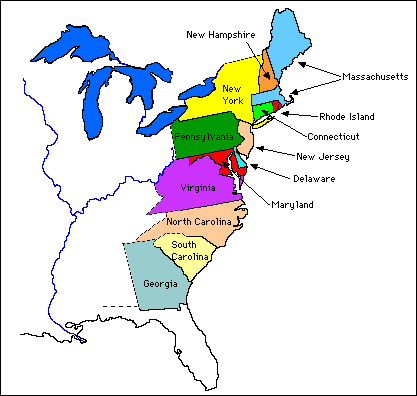
|
| Thirteen |
The thirteen colonies had united to fight the British King, but many of them were reluctant to unite for any other time or purpose. Rhode Island was perhaps the extreme example of this view of what Independence was supposed to mean, but the feeling existed to some degree in many colonies. Concern for the power of this feeling of tentativeness may have contributed an important reason the Articles placed heavy emphasis on declaring the document to represent a perpetual arrangement. Recognition of the weakness of this intent may have been an important reason why George Washington was later willing to sweep the issue aside, even though he of all people was most concerned to avoid the appearance of acting as an arbitrary king. For these and other reasons mainly revolving around state boundary disputes, the Articles remained unratified for years. Finally, in 1781 Robert Morris became convinced that failure to ratify was encouraging the states not to cooperate, and successfully pushed ratification through its steps. At that time, Morris was effectively running the country, even providing his own credit and funds to do it. People were reluctant to oppose his wishes, but they were also unwilling to provide the taxes, supplies, and troops that Morris imagined were being blocked by failure to ratify. Ratification of the Articles accomplished very little except to convince Morris: the Articles were flawed and must be replaced with something conferring more central power.
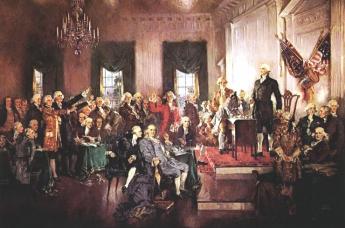
|
| The Goal: 1787 |
Little is known about the evolution of Constitutional thought in Morris' mind between 1781 and the Constitutional Convention in 1787, although a great deal is known about his other numerous activities. It is clear, however, that his experience with the recalcitrant Pennsylvania Legislature had been dismal, while he came to see the one insurmountable flaw in the current Federal government was its inability to levy taxes and consequently, to service national debt. The states were able to levy taxes under the Articles but erratic in doing so, resorting to paper money inflation at the first sign of tax resistance. In Morris' view, the key to the effective government was to reverse the situation; let the national government tax, let the states spend. The key to such rearrangement would be to permit the national government to spend on a very limited list of vital purposes, but bedazzle the states with a substantially unlimited shopping list if they thought they could afford it. As the accounts to pay for the Revolutionary War totaled up, it was apparent that the National Government had twice as much debt as the states. Therefore it would at most, need twice the state taxing power to service such a debt; presumably, wars would be infrequent and it would be less than that. Pay this one off, and potentially the need for future federal spending would be small. Indeed, under the presidency of James Monroe, the national debt was completely paid off, although briefly. It was almost as if Robert Morris and his pupil Alexander Hamilton had a crystal ball.
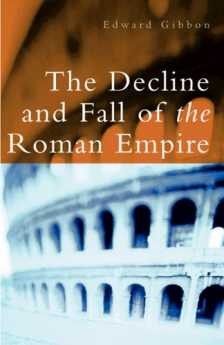
|
| Decline and Fall, Anyone? |
Robert Morris was brilliant and had six years to fashion his strategy, but he also had some help. For one thing, George Washington lived next door much of that time. By then, almost no one dared confront Washington. Adam Smith had written his book The Wealth of Nations in 1776, and Morris gave this extraordinary work as presents to his friends. Morris had corresponded with Necker, the genius financier of France, and through his good friend Benjamin Franklin, gathered insights from the rather advanced British national finance. And James Madison brought in scholarship about politics and statecraft accumulated by Witherspoon, Hume and the Scottish enlightenment. The year 1776 was a remarkable moment for new ideas. In that year, Edward Gibbon also published the first volume of The History of the Decline and Fall of the Roman Empire. The warning behind that important book had an important impact on the minds of important thinkers of the era, too.
Once you grasped all the central ideas, in this environment the resulting strategy almost worked itself out.
Implicit Powers of the Federal Government
<The two highest achievements of James Madison, had been and still remain, the writing of the Bill of Rights, and acting as a close collaborator with George Washington in fleshing out the role of the President in the new government. The Ninth and Tenth Amendments made it clear that the federal government was to be constrained to a limited and enumerated set of powers, while all other activities belonged to the states. This was already clear enough in the main text of the Constitution, which Madison also dominated after close consultation with Washington before the Constitutional Convention. So he had battled and successfully negotiated one matter twice, before the most powerful and distinguished assemblies in the nation. As to the second matter, circumstances had promoted a shy young bookworm into the role of preceptor to the most famous man in America. In the earliest days of the new republic, certainly during the first year of it, Washington and Madison worked closely together in defining the role of the Presidency.
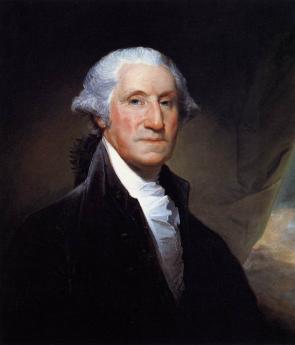
|
| George Washington |
During the first weeks of that exploratory period, Washington induced Congress to create a cabinet and the first four cabinet positions, even though the Constitution did not mention cabinets. It all was explained as an "implicit power", inherently necessary for the functioning of the Executive branch. Soon afterward, Alexander Hamilton as Secretary of the Treasury proposed the creation of a national bank. Madison and his lifelong friend Thomas Jefferson were bitterly opposed, using the argument that creating banks was not one of the enumerated powers granted by the Constitution. Hamilton's reply was that creating a bank was an "implicit power" since it was necessary for running the federal government. Of course, Hamilton and Jefferson both had other unspoken motives for their position: for and against promoting urban vs. rural power, for and against the industrialization of the national economy, and dominating the states in matters of currency and financial leadership. It empowered a national rather than a confederated economy.
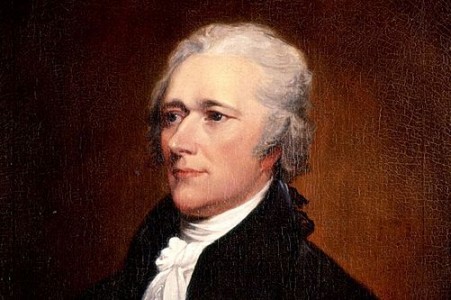
|
| Alexander Hamilton |
For Madison, the legalism probably carried considerably more weight than it did for Jefferson and Hamilton because it demonstrated the enduring consequences of being vague about the boundaries of any constitutional restriction. If this loophole got firmly established, it might reduce the whole federal system to a laughingstock. In order to promote the "general welfare", anything at all could be called an implicit power, and both separation of powers and enumerating federal powers would soon become quaint flourishes. The whole Constitution might fall apart in endless debates. On a personal level, Madison's highest achievements would have to be supplanted by something more practical. Besides which, Madison was a Virginian, a rich slave-holding farmer, and a young politician, seemingly on the verge of a promising career which might easily lead to the presidency for himself. Hamilton his most visible opponent, was already proposing a tax on whiskey which would almost surely antagonize farmers to the west, and assuming the Revolutionary debts of the states was equally divisive.
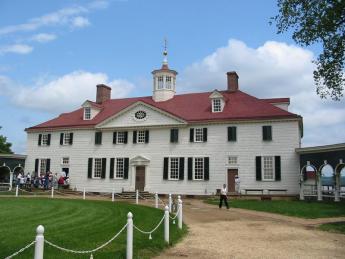
|
| Mt. Vernon |
As matters eventually worked out, the main disputants made ostensible constitutional arguments, while the real political dispute would be settled by a political deal struck at a dinner. It traded relocation of the national capital to Virginia, for the assumption of the debts of all states (when Virginia had already paid off its debt.) Location of the capitol opposite George Washington's home at Mt. Vernon also took care of difficulties coming from that direction. By the time the uproar about this arrangement subsided, the precedent for settling the inherent conflict between enforcing Constitutional limitations versus enlarging their boundaries had been set. The most opportune time for stricter interpretation was fading while the most likely advocates of it were restrained by their own example. The negotiation was a little unseemly, and probably encouraged similar decisions to migrate to a less conflicted body, which eventually John Marshall would define as the U.S. Supreme Court.
John Marshall Decides Three Cases
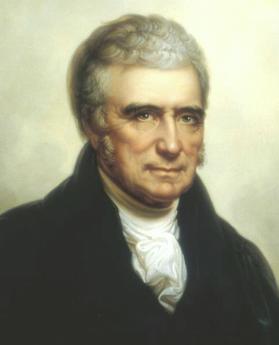
|
| Chief Justice John Marshall |
John Marshall, taking sixteen years to do it, transformed the Constitution internally into the cornerstone of the Rule of Law, making the legal profession its guardian. Nine respected justices now essentially hold lifetime appointments as bodyguards of the structure Marshall designed, with all lawyers acting as lesser officers. Nevertheless, four personal things are important to remember. Marshall had been a Revolutionary soldier, he wrote a five-volume biography of George Washington, he positively hated his first cousin Thomas Jefferson. And his thirty-five-year tenure as the third Chief Justice of the U.S. Supreme Court coincided with some of the dirtiest national politics the nation has ever seen. Marshall's enthronement of Chief Justice control of the federal courts was tolerated because it promoted them both to national power. And when this tough politician had earned the loyalty of both the court system and the legal profession to himself, he transformed the image of the Constitution from a contract between the states into an American Bible for the Rule of Law. Incidentally, he could beat anyone at horseshoes, a game requiring a winner to be both strong and precise. Much of his achievement grows out of three pivotal Supreme Court cases, which today might just as well be regarded as amendments to the Constitution.
 In all Cases affecting Ambassadors, other public Ministers and Consuls, and those in which a State shall be Party, the Supreme Court shall have original Jurisdiction. In all the other Cases before mentioned, the Supreme Court shall have appellate Jurisdiction 
|
| Article 3, Section 2.3 |
Marbury v Madison (1803). The first of Marshall's three cornerstone cases involved the Chief Justice himself. After being defeated for reelection to the Presidency in 1800 by Thomas Jefferson, President John Adams hastened to fill up remaining judicial vacancies before Jefferson his successor could be inaugurated, in a maneuver described as "appointing midnight judges". In a sense, Marshall's appointment as Chief Justice had also been in anticipation of the coming eviction of Federalist office holders, so he was himself more or less a midnight judge, destined to become by many years the last Federalist to survive in office. In any event, he was Adams' Secretary of State, soon to be replaced by James Madison, who would then assume the duty to deliver judicial appointment papers to new judges. Marshall was an impassioned Federalist, bitter about the defeat of his party, nursing personal hatred for Jefferson after years of family differences. To say he had a conflict of interest is not only to brush hurriedly by the issue but also to dramatize what loose judicial standards prevailed at the beginning of his three-decade tenure as Chief Justice.
Appointment papers for the midnight judges were completed and lying on the desk of the Secretary of State when the Presidency changed hands from Adams to Jefferson. Had he known what was coming, Secretary of State Marshall would surely have hastened to deliver the papers, but he had not done so. His successor as Secretary of State, James Madison, on the orders from Jefferson, refused to do it, so Marbury sued for a writ of mandamus, or order from a court to deliver the documents. By this time, Marshall was in a new role of presiding over the Supreme Court, fearful to attack Jefferson head on, but nevertheless eager to command the most humiliating obedience from him. Using the technicality (actually, the plain language of the Constitution) that the request was made to the wrong court, mandamus was rejected by Marshall. However, he went on to say in a judicial aside (obiter dictum) that if the right request had come to the U.S. Supreme Court properly , the Court would have approved it. Thus, in one dazzling maneuver at the beginning of his term, Marshall simultaneously asserted the Court's right to review Presidential and Legislative actions, reproved Jefferson for his ignorant conduct, and boxed him into submission by seemingly letting him win a minor case, but one he could be sure would soon have been followed by major ones if the President somehow evaded this decision. Furthermore, he dazzled the legal profession with this tap-dance, guaranteeing their applause by greatly enhancing the status of judges within the Republic, especially compared with the President. And, it should be mentioned, he suppressed public outcry by performing this set of actions in full public view, cloaked within incomprehensible legal garments. The public could see he had done something important, which only lawyers would completely understand. Marshall plainly began his term by demonstrating the full meaning of the rule of law, and his own position astride that law. The main point was that when ordinary judges include offhand commentary in a decision, it might be ignored. But when the Chief Justice of the United States speaking for the majority of his court, makes a legal observation, it would be a brave lawyer indeed who would bring an action in conflict with it. And as for the President and Legislature, Marbury v Madison had also just brushed them aside. It was all done properly, using civil language but deadly logic.
Martin v Hunter's Lessee (1816). This case might be a little more understandable if retitled as "The Heirs of Lord Fairfax v Fairfax County, Virginia". A Virginia law permitting the seizure of Tory property, written decades before the Constitution, asserted its precedence to Federal Law, and therefore its precedence over Federal Law. (To this day, Virginia never quite forgets it was once the largest, richest state, founded nearly two centuries before the Constitution.) Like Marbury v Madison, the case is clouded by Marshall's personal involvement since the Chief Justice had signed a contract with Martin to buy the land himself. This impairment to the case's claim to legal cornerstone status is not entirely annulled by Marshall recusing himself, turning authorship of the opinion over to his faithful disciple Justice Story. Furthermore, the judicial establishment of the principle that an international Treaty (in this case, the Jay Treaty) takes precedence over an Act of Congress is one the nation may still someday come to regret, if movements for "International human rights" and "universal international law" continue to gain popular traction. Such movements are numerous, including international law for the conduct of wars, and the universal Law of the Sea.
The United Nations might now be more of a force if they had not stumbled over the franchise of hundreds of nations, each given an equal vote. To expect the major nations of the Security Council to obey the single-vote mandates of dozens of small African nations is to agree in advance that the UN must be disregarded. Nevertheless, Martin v Hunter's Lessee did eliminate an escape route from Supreme Court domestic domination which might have proved troublesome in Civil War nullification disputes, or in legal cases for which national uniformity is important. On appeal, the Supreme Court finally declared its absolute supremacy over State courts as a general matter, clarifying a number of legal loose threads which had been keeping the precedence issue alive.
McCullough v Maryland 1819) The facts of this case seem considerably simpler than Marshall's long and thundering opinion of them. Indeed, the opinion sounds more like an oration on the meaning of the Constitution, or an enraged obiter dictum , than a terse opinion that the State of Maryland's legislature had passed an unconstitutional law. His remarks are indeed an exposition on the general thrust of the Constitution, foreshadowing many disputes leading up to the Civil War. In effect, it began to make it clear to the slave states that their states-rights viewpoints might conceivably be upheld on a battlefield, but never in a Courtroom. It is thus an opinion which every law student should read several times, and every citizen would profit from reading at least once. At Gettysburg Abraham Lincoln was to restate the principles in concise, even poetic, language. But long before that, Marshall had stood upon a legal mountain, declaiming them in thundering detail.
 The Congress shall have power---To make all Laws which shall be necessary and proper for carrying into Execution the foregoing Powers, and all other Powers vested by this Constitution in the Government of the United States, or in any Department or Officer thereof. 
|
| Article 1, Section 8, clause 18 |
The United States Congress had chartered the Second Bank of the United States in 1816, which then established a Baltimore branch in 1818. There was a national financial panic in 1818, which probably hastened local bank lobbyists to the Maryland Legislature, looking for relief from the unwanted federal competition. Maryland passed a law imposing a fairly high state tax on the operations of the new federal bank. McCullough, the cashier of the federal branch bank, refused to pay the tax. On appeal, McCullough maintained the tax was unconstitutional, and the U.S. Supreme Court upheld him, ordering the opinions of the Maryland courts to be reversed. John Marshall wrote the opinion and took the occasion to set forth his views on constitutionality. Point by point, my point.
What it meant, the old Federalist in a sense intoned, was the states had lost power at the Constitutional Convention and were not going to get it back. The founding fathers and George Washington, in particular, had been uneasy about accusations they had gone beyond their mandate in even calling the Philadelphia Convention. The Articles of Confederation had declared its own provisions to be "perpetual", and the states had previously bound themselves to that. True, the Confederation Congress had authorized a study of how to improve the Articles, but it had never gone so far as to suggest the Philadelphia Convention toss them out.
When the Philadelphia Convention was finishing up its work, Gouverneur Morris had written a preamble beginning with "We the People" in order to assert that its authorization came from the people and not from the governments directly confederated under the Articles, which was true. The ratification process was carefully steered into the language which asked for ratification by the people, acting by states, and from which elected state officers were excluded. The state ratification conventions heard considerable concern about legitimacy voiced by those who probably really disapproved of one feature or another. But overall it was more importantly true that the people at the ratification conventions gradually grew intrigued by the mechanics of self-rule and appreciative of the depth of thought they could see the founders had displayed. By the time the necessary number of states had ratified, public enthusiasm was genuine, while the opposition was squelched into silence or else indirection of speech. Legitimate opposition was acknowledged by specifying that ratification was conditional upon the adoption of a Bill of Rights. Finally, after the new government was subsequently tested by wars and near-wars, pratfalls and triumphs interspersed, the opposition was not only widely judged to have had its say, but its own chance to stumble. After nearly three decades of this, Marshall seems to have decided it was time to lay down the law. All of that is behind us, he said in effect state governments have knuckled under, and the Constitution is indeed triumphant. It was time to snuff out the grumbling and the scheming, and to declare invalid any future attempts at evasion.
The constitutional compromise had confined federal power to a few defined activities and whatever else was proper and necessary within those powers. It did not limit Congress to "absolutely" necessary and "absolutely" proper actions which might heedlessly confine such limited powers to awkward and inefficient behavior. Rather, the Constitution identified areas of power where the two types of government were best suited, expecting them to do their best without hampering each other with turf battles. If Congress decided that banks, or chartered corporations, were desirable means of promoting commerce which had been left unspecified in the Constitution, states could not for that reason alone interfere with federal use of them. States could charter any corporations and banks they pleased, and the federal government could do the same, but only if necessary and proper. There were many other features left unspecified, proper enough for the states to do, but which the federal government might also do -- when necessary and proper to implement its enumerated powers. It was, in short, improper for states to interfere with what was desirable for the national government to do unless the Constitution prohibited it. And the U.S. Supreme Court would be there to decide close cases.
In particular, the states were not to undermine the federal government in the legitimate pursuit of its enumerated powers. Of the strategies available, taxation was particularly vexing, since the difference between a fair tax and a burdensome one can be a matter of opinion. Ultimately, the power to tax is the power to destroy, and it would be better not to have the states taxing the national government in its operations, like issuing currency. The exception might be made for traditional state activities like taxing the bank's real estate. But if the states can tax currency operations, they can set any price, taxing anything if they set about to undermine legitimate Federal activities; such hampering was not contemplated at the Philadelphia Convention, and it will not be tolerated by the courts. Legislatures whose sovereignty ends at their state borders have no right to tax the entire nation which extends beyond those borders. And since state courts must follow state interests and state constitutions, their rulings are subordinate to those of the federal courts, as well.
With the one possible exception of international treaties, all government entities which might challenge the Supreme Court had by now had their noses rubbed in subordination to it. John Marshall went a step further. He even invented a new way to fashion laws which no one at all could challenge: as long as he spoke for the majority, the asides and comments of the Chief Justice in his obiter dicta had become a sort of supreme law.
George Mason and Triumvirates
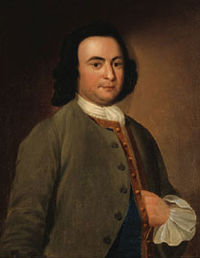
|
| George Mason |
George Mason was George Washington's neighbor in Virginia, a good friend, and an important contributor to the Constitutional Convention, once he got there. There was every reason to think he would be an enthusiastic supporter of the document, but at the end of the Convention, he refused to sign it. Various explanations for his behavior have been offered, but one that might be considered is that he offered a proposal to have the President be replaced by three people, one from the North, one from the South, and one to be drawn from the middle colonies. He was pretty passionate about his idea for a triumvirate, so passionate it rises to the level of a possible explanation for his refusing to sign.
We have not yet been able to define the Power of the Executive; and however moderately some Gentlemen may talk or think upon the subject, I believe there is a general Tendency to a strong Executive and I am inclined to think a strong Executive necessary. If Strong and extensive Power is vested in the Executive, and that Executive consists only of the one Person, the Government will of course degenerate, (for I will call it degeneracy) into a Monarchy-- A Government sop contrary to the Genius of the People, that they will reject even the Appearance of it. I consider the Federal Government as in some Measure dissolved by the Meeting of this Convention. Are there no Dangers to be apprehended from procrastinating the time between the breaking up of this Assembly and the adoption of a new System of Government. I dread the Interval. If it should not be brought to an issue in the Course of the first Year, the Consequences may be fatal. Has not the different Parts of this extensive Government, the several States of which it is composed a Right to expect an equal Participation in the Executive, as the best Means of securing an equal Attention to their Interests. Should an Insurrection, a Rebellion or Invasion happen in New Hampshire naturally ascribe any Delay in defending them to such a Circumstance and so vice versa. If the Executive is vested in three Persons, one chosen from the Northern, one from the middle, and one from the Southern States, will it not contribute to quiet the Minds of the People, and convince them that there will be proper attention paid to their respective Concerns? Will, not three Men so chosen bring with them, into Office, a more perfect and extensive Knowledge of the real Interests of this great Union? Will not such a Model of Appointment be the most effectual means of preventing Cabals and Intrigues between the Legislature and the Candidates for this Office, especially with those Candidates who from their local Situation, near the seat of the Federal Government, will have the greatest Temptations and the greatest Opportunities. Will it not be the most effectual Means of checking and counteracting the aspiring Views of dangerous and ambitious Men, and consequently the best Security for the Stability and Duration of our Government upon the invaluable Principles of Liberty? These Sir, are some of my Motives for preferring an Executive Consisting of three Persons rather than one
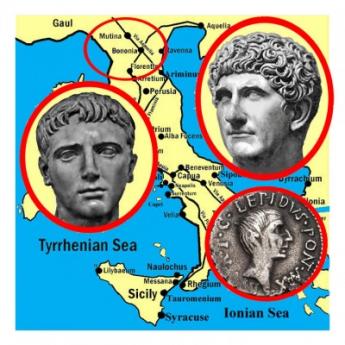
|
| Marc Antony, Lepidus, and Octavius Caesar |
The Constitutional Convention has been described as being strongly influenced by the Senate of ancient Rome, and Shakespeare's depiction of it was very popular in the colonies. It, therefore, seems strange that Mason would be so strongly attracted to a form of government which attended the dissolution of the Roman Senate, and the long reign of Emperors which followed it. The first triumvirate lasted only five years and consisted of Julius Caesar, Pompey, and Crassus. With Caesar's move toward the throne, this particular triumvirate did not come out to what would have been the American colonist wishes. The second triumvirate also only lasted five years, consisting of Marc Antony, Lepidus, and Octavius Caesar. Shakespeare tells us in no uncertain terms that did not work out. In both cases, two of the three went to war with each other but first disposed jointly of the third. Mason does not mention the Roman examples, perhaps because they posed inconvenient outcomes. Perhaps this tobacco farmer was not sufficiently learned about Rome, but it is also possible that he was thinking of the three centuries of Roman history where there was a succession of Emperors, mostly bad ones. During that period, Rome was really ruled by many triumvirates with subordinate absolute powers, specifically denominated. Essentially this was an organized aristocracy and it supposedly worked pretty well. And perhaps George Mason just secretly disliked Washington or feared tendencies he was close enough to know about. Or maybe six other things. We certainly can be sure the rest of the convention knew some Roman history, and definitely did not want to see either a King or an Aristocracy. No matter how gentle and persuasive, one of their esteemed colleagues might be about it.
Appealing the Constitution to a Higher Authority
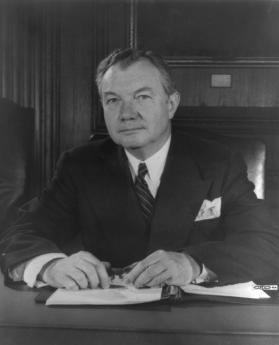
|
| Justice Robert H. Jackson |
According to Justice Robert H. Jackson, "We" (The Supreme Court) "are not final because we are infallible, we are infallible because we are final." Scoop Jackson was the last Justice who never went to college or graduated from Law School, so his viewpoint concentrated on the practical outcome of a situation. In fact, the father of our constitution, James Madison, was learned in the history of many constitutions, and was well aware of allusions to divinity in the construction of our governing document, particularly when the sources of strong beliefs couldn't be grounded in evidence. However,the Age of Enlightenment was highly religious, so they gave credit to divine guidance when they really were imitating the Legal profession.The lawyer's system of progressive appeal to a hgher court of appeals was a very clever adaptation of recognition that most problems are pretty simple andcan be handled without much training.The Constitution is an attempt to reconcile our culture to the needs of government and the revelations of controversy. Composed by Enlightenment rationalists within a highly religious environment, the Founding Fathers were careful to use the metaphors of Religion, even though many were personally skeptics about the substance. Indeed, the Penman of the Constitution who ultimately wrote most of the words was Gouverneur Morris, a flagrant libertine. It had been the tradition of Constitutions to describe their culture by allusion to epic poems, drawing inferences about Right and Wrong from what had subsequently happened to ancient heroes after similar situations unfolded. Some would put the plays of Shakspere in that role in 1787, but the evidence is stronger for Roman writers, like Cato and Cicero. In my own view, this leap of faith was only divine in the sense it was a one-way street. A citizen might try to emulate the ancients, but appealing back to them was not likely to work.
Although the Constitution can be viewed as bridging a gap between Culture and Common Law, or perhaps as placing a guardhouse between them, this relationship is not spelled out and therefore, in theory, might be changed. Other cultures, perhaps the native Indian, or the Catholic Church of Central Europe, might be substituted, or other legal structures resembling the Napoleonic Code might serve on the opposite side of the bridge. These substitutions were a legal possibility, but there is little doubt the American leadership intended for an Anglo-Saxon culture, linked with Francis Bacon's legal system, to prevail under a distinctively American flag. Because of our debt to France for then-recent assistance, there was once the possibility of French coloration to our culture, but the excesses of the French Revolution soon ruled that out. Some modern observers have capsulized the scene: First, we got the British to help throw out the French in 1754; and then in 1776, we got the French to help us throw the British out. Both our allies thought we played their game, but we were playing our own. The new Constitution specified no laws, but with little doubt the Framers intended the states to adopt British Common Law without the infelicity of saying so.
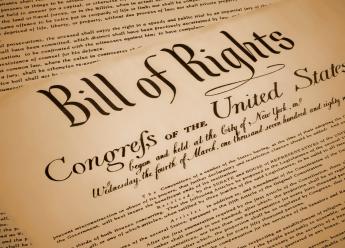
|
| Bill of Rights |
And then there is the Bill of Rights. Madison had great faith in the ability of structure (separation of powers, term limits, etc.) to command predictable outcomes, and initially resisted any need for a Bill of Rights. But the Ratification Conventions in the states showed him the need to yield. The First Congress soon enough confronted over a hundred proposed rights in petitions from the states, especially the four big ones. If anyone else had been in Madison's position, our Bill of Rights would resemble the European one today, fifty pages long and growing. That outcome would have greatly weakened the Legislative branch since after protests about Mother Nature subside, the legal fact emerges that Rights are merely laws which no majority can overturn. They might even be characterized as a contrivance for transient majorities to promote the permanence of their viewpoint.

|
| The Founding Fathers |
But they are not the only contrivance in politics. Enshrinement of the Founding Fathers elevated their political positions into near divinity, whereas debunking the Founders personally undermines their symbolism as statues and myths. There was too much of this during the romance period of the Nineteenth century, but also in von Ranke's later marginalization of History into mere scholarship and footnotes, which was a reaction to it. The Founding Fathers themselves now supplant Achilles and Cincinnatus in our lexicon, and we have little choice but to accord more weight to their original intent in the Constitution, than to contemporary reasonings. Indeed, we are forced to acknowledge more similarity between George Washington's fictitious cherry tree than to his relations with Peggy Fairfax, when we interpret his thundering "Honesty is the best policy" in the second inaugural address. It is admittedly a difficult choice, but Justices now need to consider what his audience widely believed was his original intent, more than what later archeological discoveries uncover. Justice Scalia is correct in placing more weight on the original intent of the Founding Fathers than contemporary reactions to the same words. But in occasional conflicts between myth and reality, it seems safer to consider what the audience then widely believed, than what modern audiences would guess at.
45 Blogs
Democracy Turns Out To Be a Two-Party System
 One is too few, four is too many. Third parties may be occasionally useful.
One is too few, four is too many. Third parties may be occasionally useful.
Term Limits, With Exceptions
 Here's a suggestion for increasing congressional bipartisanship, a little.
Here's a suggestion for increasing congressional bipartisanship, a little.
Mister Roberts
 Franklin Roosevelt threatened to keep adding Supreme Court justices until he got a majority to agree with him. And then one vote switched; a Switch in Time, which saved nine. Owen Roberts of Philadelphia did the switching.
Franklin Roosevelt threatened to keep adding Supreme Court justices until he got a majority to agree with him. And then one vote switched; a Switch in Time, which saved nine. Owen Roberts of Philadelphia did the switching.
Rosencrantz and Gildenstern (4)
 After an idea "grows legs and runs around", it no longer belongs to its originator
After an idea "grows legs and runs around", it no longer belongs to its originator
Commercial Academic Think Tank
 There are universities and there are think tanks. Philadelphia has at least one commercial consulting firm which combines elements of both.
There are universities and there are think tanks. Philadelphia has at least one commercial consulting firm which combines elements of both.
Volunteerism Needs a Business Plan
 Volunteerism has declined in recent years because of conflicting demands made by gainful employment. The spirit of volunteerism has not diminished, it just needs a different business plan.
Volunteerism has declined in recent years because of conflicting demands made by gainful employment. The spirit of volunteerism has not diminished, it just needs a different business plan.
Concessions and Agreements
 Most 17th Century colonies were proprietorships, requiring agreements for local autonomy without losing allegiance to the home country. William Penn cleverly expanded the New Jersey document into the intellectual precursor of the U.S. Constitution.
Most 17th Century colonies were proprietorships, requiring agreements for local autonomy without losing allegiance to the home country. William Penn cleverly expanded the New Jersey document into the intellectual precursor of the U.S. Constitution.
Vote Counting, Past and Future
 Voting law changes followed the contested 2000 Presidential election, but U.S. Supreme Court still comes out looking pretty good. Close elections will always cause problems, some of them brand new ones.
Voting law changes followed the contested 2000 Presidential election, but U.S. Supreme Court still comes out looking pretty good. Close elections will always cause problems, some of them brand new ones.
George Washington Demands a Better Constitution
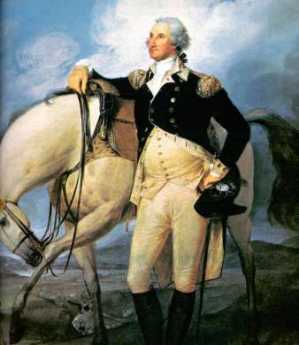 George Washington was an athlete, a soldier, and an adventurous leader. It is less appreciated that he constructed that aloof public image of himself, cloaking an activist politician and rather ambitious real estate developer. We got a new Constitution because he wanted a new constitution.
George Washington was an athlete, a soldier, and an adventurous leader. It is less appreciated that he constructed that aloof public image of himself, cloaking an activist politician and rather ambitious real estate developer. We got a new Constitution because he wanted a new constitution.
American Succession
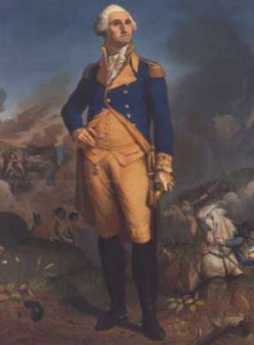 The rules for succession are not spelled out in the American Constitution, but what is implicit was revolutionary. Once again, credit George Washington.
The rules for succession are not spelled out in the American Constitution, but what is implicit was revolutionary. Once again, credit George Washington.
Designing the Convention
 To understand the original intent of the Constitution, it helps to see it in three parts. The part Washington and Madison devised in 1787 was mostly about structure, the main goal of which was to lay out certain national functions which the federal government could perform without state interference. That's delicate diplomacy because the states had to ratify it.
To understand the original intent of the Constitution, it helps to see it in three parts. The part Washington and Madison devised in 1787 was mostly about structure, the main goal of which was to lay out certain national functions which the federal government could perform without state interference. That's delicate diplomacy because the states had to ratify it.
A Gleam in Washington's Eye
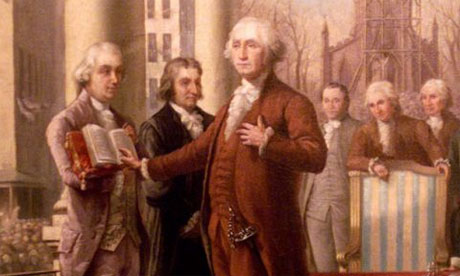 Section 8 of Article I of the Constitution contains the enumerated powers of Congress, and Section 9 contains some prohibitions of Congressional power. Taken together, these "powers" constitute the arguments that a Union is superior to a Confederation. In the aggregate, they represent the reasons why we created a Union.
Section 8 of Article I of the Constitution contains the enumerated powers of Congress, and Section 9 contains some prohibitions of Congressional power. Taken together, these "powers" constitute the arguments that a Union is superior to a Confederation. In the aggregate, they represent the reasons why we created a Union.
Repairing Constitutional Defects
 The concept of an amendable constitution was first devised by William Penn and utilized in his form of government of Pennsylvania. But Federalists at the 1787 Constitutional convention feared amendments would weaken the document's power. The alternative, repeat Conventions in which everything would again be on the table, ultimately seemed even more destabilizing. Amendments are permitted, but discouraged by difficult methodology.
The concept of an amendable constitution was first devised by William Penn and utilized in his form of government of Pennsylvania. But Federalists at the 1787 Constitutional convention feared amendments would weaken the document's power. The alternative, repeat Conventions in which everything would again be on the table, ultimately seemed even more destabilizing. Amendments are permitted, but discouraged by difficult methodology.
Field Marshal William Joseph Slim, 1st Viscount, Order of the Garter
 the rises of Bill Slim from humble beginnings to the highest honors Great Britain can bestow, may seem natural enough to Americans but raises reflections about the origins of British world rule.
the rises of Bill Slim from humble beginnings to the highest honors Great Britain can bestow, may seem natural enough to Americans but raises reflections about the origins of British world rule.
Philadelphia City-County Consolidation of 1854
 Prior to 1854, Philadelphia City was one of twenty-nine political entities within Philadelphia County. After that, it became one big city without suburbs. Growth pressure now reverses toward suburbs without a city. Political boundaries should thus shift inwardly.
Prior to 1854, Philadelphia City was one of twenty-nine political entities within Philadelphia County. After that, it became one big city without suburbs. Growth pressure now reverses toward suburbs without a city. Political boundaries should thus shift inwardly.
Unwritten Features of the Constitution
 Considerable anger is sometimes directed toward Judges who find unintended provisions in the Constitution. On the other hand, James Madison and some other Founding Fathers were careful to design the Constitution to create outcomes that are far from explicit.
Considerable anger is sometimes directed toward Judges who find unintended provisions in the Constitution. On the other hand, James Madison and some other Founding Fathers were careful to design the Constitution to create outcomes that are far from explicit.
Robert Barclay Justifies Quaker Meetings
 Robert Barclay, one of the handfuls of English philosophers of enduring note, came close to establishing the doctrines of the Quaker Church, a religion with no formal doctrine.
Robert Barclay, one of the handfuls of English philosophers of enduring note, came close to establishing the doctrines of the Quaker Church, a religion with no formal doctrine.
Grand Union
 Thirteen stars and stripes became the National Flag in 1777, but a rather similar flag was the National flag from 1775-1777. It was also designed by a Philadelphia milliner, Margaret Manny.
Thirteen stars and stripes became the National Flag in 1777, but a rather similar flag was the National flag from 1775-1777. It was also designed by a Philadelphia milliner, Margaret Manny.
States Rights Confront Civil War
 The Constitution took certain defined powers from the states and gave them to the Federal Government. A further steady erosion of states rights began, but the Republican Party gave things a big push during the Civil War.
The Constitution took certain defined powers from the states and gave them to the Federal Government. A further steady erosion of states rights began, but the Republican Party gave things a big push during the Civil War.
Re-Doing Dilworth Plaza
 Plans are afoot to rearrange the whole focus of center-city Philadelphia, by merging the transportation network around City Hall, and changing the walking patterns. Dilworth Plaza is in the center of it all.
Plans are afoot to rearrange the whole focus of center-city Philadelphia, by merging the transportation network around City Hall, and changing the walking patterns. Dilworth Plaza is in the center of it all.
William Penn, Excellent Lawyer, Terrible Businessman
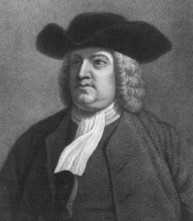 William Penn was the central force in the establishment of a religion, Quakerism, certain central features of the legal system, three colonies of America, and many of the central concepts of Constitutional Law. He leaves us over three thousand documents, but it remains very hard to form a picture of what he was like.
William Penn was the central force in the establishment of a religion, Quakerism, certain central features of the legal system, three colonies of America, and many of the central concepts of Constitutional Law. He leaves us over three thousand documents, but it remains very hard to form a picture of what he was like.
William Penn and the Corporate Model
 Among his many accomplishments, William Penn created the oldest surviving stockholder corporation in America, now well over three hundred years old.
Among his many accomplishments, William Penn created the oldest surviving stockholder corporation in America, now well over three hundred years old.
SEPTA's Long Term Planning
 SEPTA is slowly making progress, but it's a struggle, every step of the way.
SEPTA is slowly making progress, but it's a struggle, every step of the way.
Go to Delaware, Elephants?
 It's about a 20-minute commute from Delaware to Philadelphia, with a big difference in estate taxes. Moving from New Jersey to Delaware would double that difference.
It's about a 20-minute commute from Delaware to Philadelphia, with a big difference in estate taxes. Moving from New Jersey to Delaware would double that difference.
Unalienable Rights Before 1776
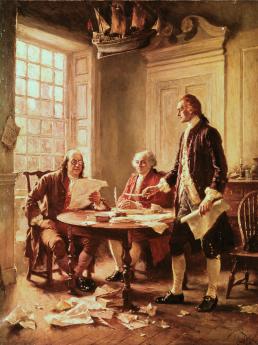 Lawyers commonly say the Declaration of Independence "informs" the Constitution. But prior informing was performed by William Penn, the Roman Empire, and Hammurabi.
Lawyers commonly say the Declaration of Independence "informs" the Constitution. But prior informing was performed by William Penn, the Roman Empire, and Hammurabi.
Inalienable Rights Before the Magna Carta
 Human rights of some sort can be traced back to 1800 B.C The question is not whether they are ancient, but who gave them out.
Human rights of some sort can be traced back to 1800 B.C The question is not whether they are ancient, but who gave them out.
Three Revolutions at Once, Maybe Four
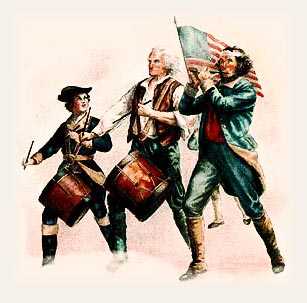 Asking the cause of the American Revolutionary War may be a little simplistic; civil wars pop up, all over the place, all the time. The more important question to ask, is why did this American Revolution have such a dramatic effect on the whole world?
Asking the cause of the American Revolutionary War may be a little simplistic; civil wars pop up, all over the place, all the time. The more important question to ask, is why did this American Revolution have such a dramatic effect on the whole world?
Pennsylvania Likes Private Property Private
 The King used to own the whole country. William Penn got us used to the idea that my property is mine, not the King's.
The King used to own the whole country. William Penn got us used to the idea that my property is mine, not the King's.
Original Intent and the Miranda Decision
 Right before our eyes, we can watch the Miranda decision migrate away from the original intent.
Right before our eyes, we can watch the Miranda decision migrate away from the original intent.
Selection of Constitutional Rights for the Bill of Rights
 James Madison tried to preserve the Union by allowing states some latitude in enforcing civil rights. Eventually, we got a Civil War, a weakening of state legislatures, massive black migration to northern cities, and the Civil Rights Act. It's all about slavery is hard to eliminate.
James Madison tried to preserve the Union by allowing states some latitude in enforcing civil rights. Eventually, we got a Civil War, a weakening of state legislatures, massive black migration to northern cities, and the Civil Rights Act. It's all about slavery is hard to eliminate.
Addressing the Flaws of Republics
 We need some local, not national, think tanks. To understand why, it helps to have been elected to something, yourself.
We need some local, not national, think tanks. To understand why, it helps to have been elected to something, yourself.
Washington's Circular Letters
 During the dismal days of 1782-3, Washington was confronted with the first of many examples of the American tendency to quit a war before it is completely won.
During the dismal days of 1782-3, Washington was confronted with the first of many examples of the American tendency to quit a war before it is completely won.
Regulation Precision: Not Entirely a Good Idea
Anatomy of an Urban Political Machine
Constitutional Liberty
Robert Morris: Businessman Father of the Bureaucracy
Reconsidering All Our Laws
Corporations: Property, but also Immortal Persons
The Third Pennamite War (1778-1784)
How Could We Improve State Legislatures?
Two Friends Create the Articles of Confederation
Implicit Powers of the Federal Government
John Marshall Decides Three Cases
George Mason and Triumvirates
Appealing the Constitution to a Higher Authority
 If Philadelphia is typical, here is how urban machine politics works.
If Philadelphia is typical, here is how urban machine politics works.
 Robert Morris refused to sign the Declaration of Independence because what he really wanted was Constitutional Liberty. He didn't even mind being a British subject and didn't want a different King. What was this all about?
Robert Morris refused to sign the Declaration of Independence because what he really wanted was Constitutional Liberty. He didn't even mind being a British subject and didn't want a different King. What was this all about?
 Only a few days after being appointed Financier, or acting President of the United States before the Constitution, Robert Morris swept away Congressional committees and replaced them with administrative employees.
Only a few days after being appointed Financier, or acting President of the United States before the Constitution, Robert Morris swept away Congressional committees and replaced them with administrative employees.
 The legislatures of America were handed a clean slate for statutes by the 1787 Constitution, and thus given the opportunity to review the entirely legal system. It took nearly a century to accomplish and is still proceeding.
The legislatures of America were handed a clean slate for statutes by the 1787 Constitution, and thus given the opportunity to review the entirely legal system. It took nearly a century to accomplish and is still proceeding.
 There had been a few stockholder corporations, dating back to the Dutch East India Corporation and the Proprietors of West Jersey. The Industrial Revolution greatly encouraged this business structure, but America got the jump on the rest of the world by some happenstances.
There had been a few stockholder corporations, dating back to the Dutch East India Corporation and the Proprietors of West Jersey. The Industrial Revolution greatly encouraged this business structure, but America got the jump on the rest of the world by some happenstances.
 Connecticut and Pennsylvania stopped fighting during the Revolution, but then promptly resumed hostilities. The Decision of Trenton gave the prize to Pennsylvania, whose legislature promptly abused the helpless remaining Connecticut settlers.
Connecticut and Pennsylvania stopped fighting during the Revolution, but then promptly resumed hostilities. The Decision of Trenton gave the prize to Pennsylvania, whose legislature promptly abused the helpless remaining Connecticut settlers.
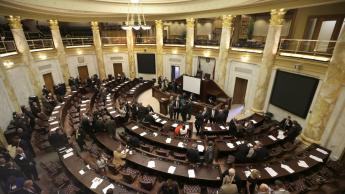 If state legislatures are as bad as their reputation, we ought to be asking questions. Like, how did they get that reputation, and what can improve it?
If state legislatures are as bad as their reputation, we ought to be asking questions. Like, how did they get that reputation, and what can improve it?
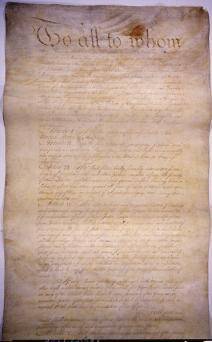 John Dickinson and Robert Morris were good friends who pushed the Articles of Confederation through to ratification. Both of them had been active critics of Great Britain's treatment of the colonies, but both hesitated to sign the Declaration, and both later relented and fought for Independence. Dickinson's final position is less clear, but it was Morris who first saw the weakness of the Articles, and pressed on for their replacement by the Constitution.
John Dickinson and Robert Morris were good friends who pushed the Articles of Confederation through to ratification. Both of them had been active critics of Great Britain's treatment of the colonies, but both hesitated to sign the Declaration, and both later relented and fought for Independence. Dickinson's final position is less clear, but it was Morris who first saw the weakness of the Articles, and pressed on for their replacement by the Constitution.
 The Constitution strictly limited the number of federal powers, but did not define their boundaries. Intending to be flexible, it opened a permanent loophole.
The Constitution strictly limited the number of federal powers, but did not define their boundaries. Intending to be flexible, it opened a permanent loophole.
 Marbury v Madison (1803), Martin v Hunter's Lessee (1816), and McCullough v Maryland (1819) -- these three cases were the ones where John Marshall changed judicial history. Taught in law school as case law, they are more accurately moments of national history.
Marbury v Madison (1803), Martin v Hunter's Lessee (1816), and McCullough v Maryland (1819) -- these three cases were the ones where John Marshall changed judicial history. Taught in law school as case law, they are more accurately moments of national history.
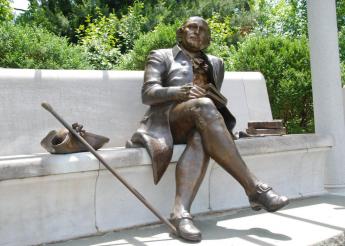
 The original intent of the Constitution has as much to do with what the audience thought they heard, as what the Founders meant they were saying. Or possibly, what Gouverneur Morris thought they were saying.
The original intent of the Constitution has as much to do with what the audience thought they heard, as what the Founders meant they were saying. Or possibly, what Gouverneur Morris thought they were saying.